#darius vogel translation
Explore tagged Tumblr posts
Text
[Darius Vogel] I Can't Return to a Time Before You Bitter Ending

We were chasing after the gentleman who had bumped into Darius in the busy street.
(The sun has set more than before.)
The atmosphere of night was approaching, and the sky was turning a dusky black as if ink had been spilled on it.
Darius: What a dirty street. I don't want to go in there.
The gentleman had entered a deserted street with garbage scattered about and graffiti all over the walls ––.
I hesitated for a moment before entering.
(Oh...!)
Rough-looking men who emerged from the alleys on either side of the street surrounded the gentleman and pointed knives at him.
By the time I realized they were robbers, it was too late.
A dull, gleaming object was pressed against the gentleman's abdomen, and he crumpled to the ground, his body bent in a U-shape.
Kate: He's been stabbed... Mmmph!
A hand reached out from beside me and covered my mouth, stifling the cry that was about to escape.
Darius: Shh, if they notice us, we'll be caught up in this too.
With my mouth covered, I watched the scene unfolding before my eyes, a chill running down my spine.
Man rummaging through pockets: Is this all the valuables he has? Not a bad haul. What about you?
Man rummaging through bag: This one... Eek, what is this? It's creepy.
(Creepy?)
I couldn't help but lean forward and try to peek into the alley ––.
Darius: You're such a curious child. But we can't, we'll be spotted.
Darius pulled me back, and all I could hear were the men's voices.
Man rummaging through pockets: Tch, for such a fancy bag, this is a real letdown.
Man rummaging through bag: We can't sell this. Let's get out of here.
As the footsteps faded away, Darius's hand that was covering my mouth also let go.
Darius: As you can see, this street is dangerous, so we should leave quickly.
Kate: Um, wait a minute.
The moment I tried to step out onto the street, Darius stepped forward as if to stop me.
Darius: Don't tell me you're going after the thieves. If something happens to you, Victor will give me a lecture.
Kate: I understand your position, Darius. I won't do anything reckless here. But...
(If he's still alive...)
I jumped over Darius's leg and ran to the gentleman lying on the ground.
But –– the gentleman was dead before I could even check for a heartbeat.
Darius: Oh dear, he's not breathing anymore.
Darius, who had followed me, looked down at the gentleman and said nonchalantly.
(Is this the "worst possible future" that Darius was talking about?)
Darius's ability to see the worst possible future a person will experience just by touching them.
I gasped as I witnessed his cursed ability and the worst possible future that had actually come to pass.
Then I noticed another peculiarity.
Kate: This is...
Scattered around the gentleman's corpse –– a tremendous number of blades.
Moreover, there were many blades with shapes that couldn't be obtained normally.
(The knife that took his life is still stuck in his abdomen. Then, what about these blades?)
(Why are there so many knives in his bag...? And is this blood?)
A reddish-black substance was clinging to some of the sharp blades.
Darius: I saw it in the newspaper this morning. They said a dismembered body was found in the city yesterday.
Darius: The body was cleanly dissected along the muscle lines.
Darius: The opinion was that it would be impossible to do such a thing without using special blades and having expert knowledge.
Darius: By the way, the murder weapon hasn't been found yet.
(Could it be that the culprit is...?)
I looked at the gentleman, who would never open his eyes again.
There's no way to confirm his identity, but judging from his unusual belongings, he's probably not an ordinary citizen.
I thought a good citizen had been attacked by robbers and lost his life –– but...
A murderer who made the headlines was killed without anyone knowing... Is that the truth?
(One thing is clear: only Darius knew his fate.)
Kate: You could see the worst possible future, so why didn't you help him, Darius?
Darius: Are you dissatisfied with this ending?
Darius: But the answer is simple. It's because this man wasn't worth saving.
Darius declared cruelly, with an angelic face.
Darius: There's no point in helping him, is there? Of course, it's different if he has any use.
Darius: In that sense––which side are you on?
His fingertip gently stroked my neck.
Despite the gentle touch, a shiver of fear ran through me as if the Grim Reaper's scythe had been placed against me.
Darius: Hahaha, just kidding. Don't be scared.
Darius: You're my lover today, so of course I'd save you, right?
(I wonder why. Is it just me, or does Darius seem to despise humans?)
It's not just his appearance that resembles an angel.
He looks down on humans from far above as if he lives in the heavens, unconsciously sorting them... I get that feeling.
Kate: I'm honored to be saved by you. But I decide who saves me.
Perhaps I shouldn't take his words about "saving" at face value.
Darius: Then I have no choice but to train you to be loved.
Kate: ? I don't follow...
Darius: It means I'm a little interested in you right now. You should be honored, you know?
Darius: That's right, if you're properly trained and become a good girl...
Darius: I might even give you special treatment in the new order we're building.
Darius laughed cheerfully to himself.
Darius: Come on, let's go. This bloody murder scene doesn't suit us as lovers.
Sweet, honey-colored eyes beckoned me, urging me to leave this dangerous street.
Kate: W-what about reporting it?
Darius: It's a hassle to be questioned about all sorts of things, so let's just pretend we don't know anything, okay?
The angelic Darius whispered like a devil ––.
Darius: Thank you for today. I'll walk you back to Crown Castle. As your "lover" until the very end... okay?
He gently intertwined his fingers with mine and started walking.
Before I knew it, his hands were wearing pristine gloves.
(He had spare gloves with him.)
The gloves that got dirty when he ate the mille-feuille are in my pocket.
(When I wash the gloves and clean them, I'll visit Darius.)
Surely, by then, I'll be able to know more about him.
Perhaps I think this way –– because I've become fascinated by a darkness I don't know.
FIN
.
.
.
If you’d like to support my translations, feel free to buy me a coffee here! :)
#ikevil#ikemen villains#ikemen villains darius vogel#darius vogel i can't return to a time before you#darius vogel translation#ikevil jp
35 notes
·
View notes
Text

FINISHED MY BOY DARIUS
#cybird ikemen#ikemen#ikemen villains#ikevil#cybird ikemen series#ikemen mc#ikemen prince#jude jazza#ikevil jp#ikevil spoilers#ikevil fanart#darius vogel#otome game#ikemen fanart#fanart#ikemen translations
748 notes
·
View notes
Text
glad i’m not the only one picking up on the fruitiness…
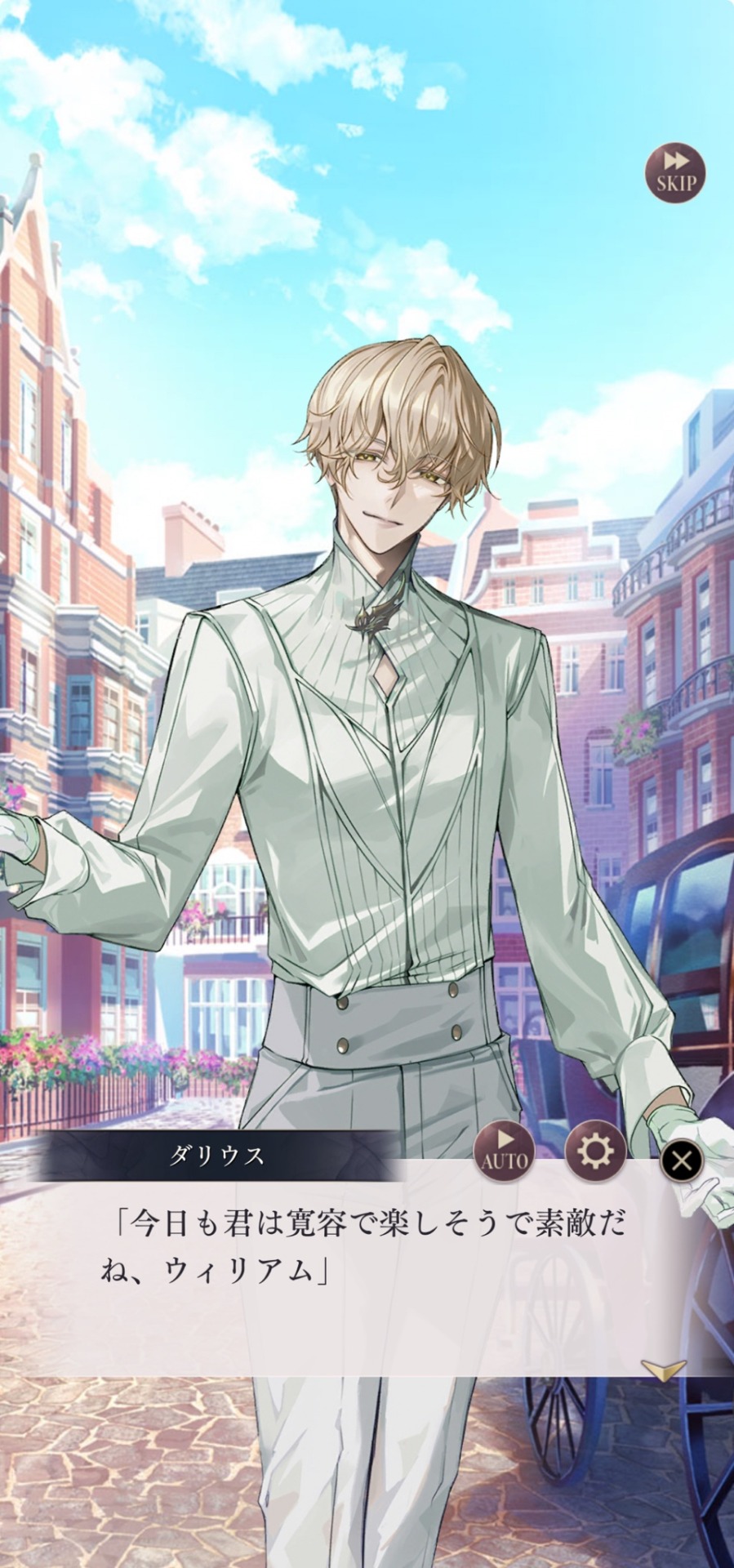
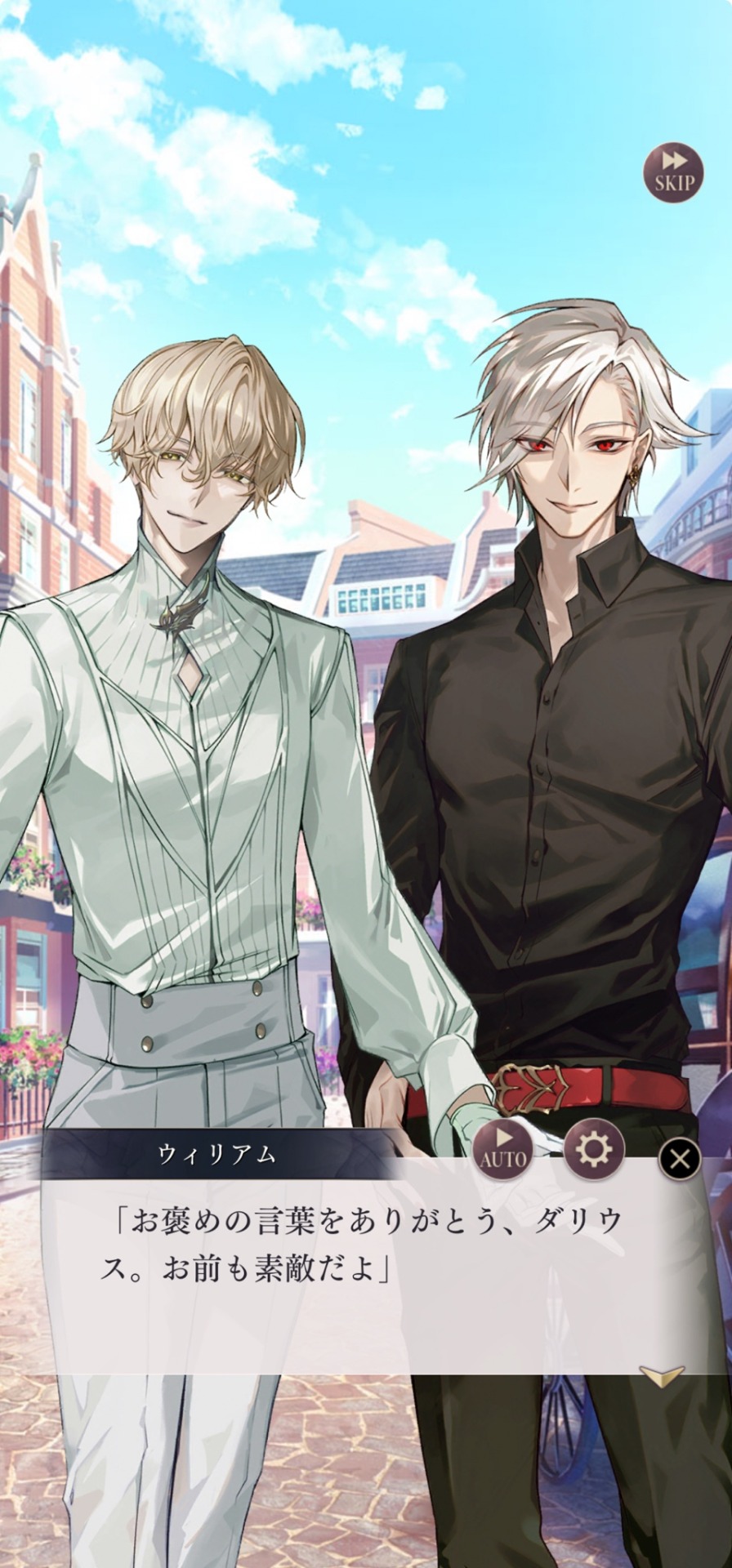
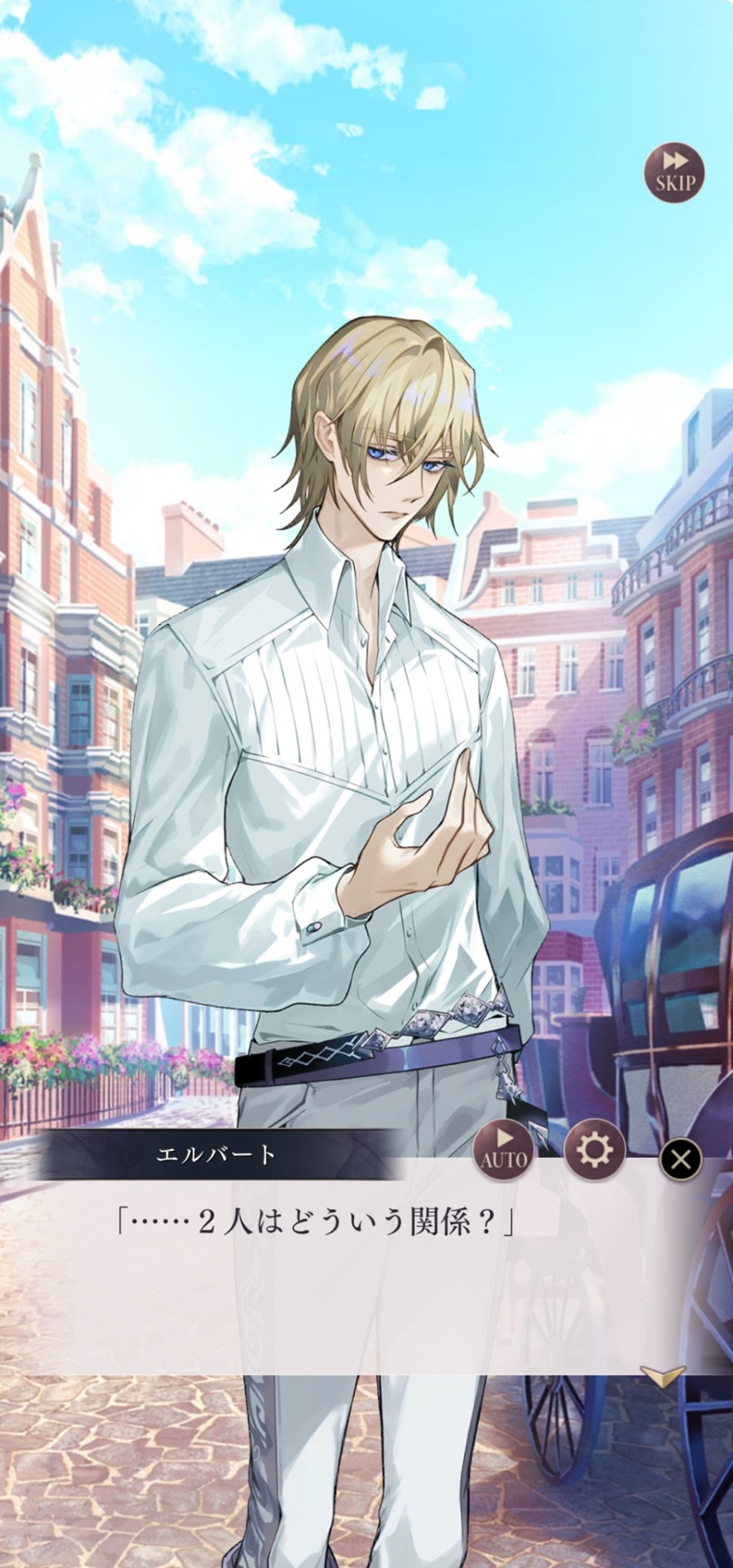
Darius: I see you are magnanimous, fun, and wonderful today as well, William.
William: Thank you for your kind words. I think you’re quite wonderful yourself too, Darius.
Elbert: …What are you two to each other?
#ikemen villains#ikevil#イケメンヴィラン#ikevil darius#ikevil darius vogel#darius vogel#ikemen villains darius#ikevil william#ikevil william rex#william rex#ikemen villains william#ikevil elbert#ikevil elbert greetia#elbert greetia#ikemen villains elbert#cybird ikemen series#cybird ikemen#cybird otome#ikemen series#otome game#otome#ikevil translation#ikevil translations
190 notes
·
View notes
Text
2025 Mystery Bag Prologue: Lucky Man Competition



This is a fan translation only. Please expect grammatical errors and translation inaccuracies. This is a full translation. Creative liberties are taken for characterization and smoother translation process. Cybird owns everything. Re-blogs are appreciated, but please do not post my translation elsewhere. Thank you for your support! ☾.
It’s the end of the year, it's condemnation, after condemnation, after condemnation.
The busy Crown members also seem to get worn out by the end of the year.
Roger: Ah- I’ve worked hard this year. I don’t feel like lifting a finger anymore.
Harrison: I get what ya mean, the end of the year’s…..gotten worse.
Harrison: Well, Jude’s seems crappier though.
Jude: Those damned average employees makin’ stupid mistakes durin’ the shittiest busiest time.
Ellis: It's true that the busier you are, the more mistakes you make and the more work you have to do.




Alfons: I’ve also been rather busy what with attending parties with Elbie, greeting people, drinking parties, and caring for the cat!
Elbert: I didn’t ask him to care for the cat….but, you saved it. Thank you.
Liam: We’re all exhausted. But we’ve finished our duties for the year, so now we can take it easy to our heart’s content.
William: I agree with Liam.
William: That’s what I want to say, but at times like this,
Victor: My cutie Crown members are all gathered together ~~!




William: This man stirs up a perpetual storm at Crown.
Jude & Harrison: I’m dyin’.
Victor: This is a marvelous and amazing event. Let’s APPLAUSE!
Liam & Ellis: Yay! Clapping!
Jude: If it’s somethin’ stupid, I’ll sink ya in the sea today.
Victor: You’re the stars of 2025! The Lucky Man competition will be held in the UK, WHOOOOOO!
Jude: Tch.
Ellis: Jude, your blood vessel’s about to burst.
Victor: I see, I see! I’m delighted you’re so happy that your blood vessels could burst!
William: This is the first event where Jude is so excited about it that his blood vessels pop, isn’t it?
Victor: This is a project her Majesty has been working on for many years, and it’s being held for the first time.
Victor: Here, let me explain the rules. They’re simple.
Victor: The person who runs the designated course, and reaches the goal first will be chosen as the Lucky Man.
Victor: The Lucky Man is said to be brought to various events throughout the year for good luck.
Alfons: Essentially, it’s a race to determine first place.
Victor: It’s exactly that!




Victor: First, there is a qualifying round. Those whom make it through, will be able to participate in the final match. This means that everyone has an equal chance to participate.
Victor: It’s fun, it’s exciting! Now, all of Crown should join!
Jude: How stupid. Why should I be runnin’ ‘round in this cold ass weather?
Harrison: Yeah, I’ll pass too. Gimme a break, I’m already exhausted.
Roger: I agree. If there were some benefit like money or something, I wouldn’t hesitate to think it over—
Victor: What if, Her Majesty would grant any one wish to the one chosen as the Lucky Man?
Alfons & Roger: Anything?
Roger: Her Majesty’s really stepped up. Victor, I’ll join.
Ellis: Roger’s participating? Guess I will too if that’s the case.
Ellis: Jude?
Jude: If yer sayin’ “anythin’” then that changes thin’s.
Alfons: Just look at everyone declaring their participation one after the other. Elbie, what of you?
Elbert: …..I don’t compete very often.
Victor: Ahhh! Come to think of it, Kate said something like this,
Victor: “The Lucky Man is amazing! I respect anyone tries their best at anything” —
Elbert: Victor, I’ll join too.
Alfons: For cash. I’ll participate too. I adore reveling in drinking sprees.
Liam: Me too, me too! Win or lose, it’ll be a great memory.
Liam: C’mon, Harry you too! I’m sure Kate will come to cheer us on.
Harrison: Don’t hit my arm, Liam. Good grief, I get it……I’ll tag along too.
Victor: Now, that just leaves William. Although I don’t think I need to ask.
William: Of course, I’ll join. The real pleasure of one’s life is to enjoy everything.




Victor: All of Crown, including myself will participate by entering the qualifying round.
Victor: Crown, the townspeople, and the rest I’m certain —
[Transitions to Vogel]
Darius: — Apparently, an event like that is taking place. We three Vogel’s have announced our participation as well.
Nica & Ring: ….Huh?
Darius: Ahaha, your surprised looks are exactly the same.
Darius: It’s at times like this I think you really are twins.
Nica: Your eccentricities are nothing new Dari, but is there any reason for us to participate in this?
Darius: Do you really feel I always say such outlandish things?
Darius: Simply put, choosing a Lucky Man seems amusing, doesn’t it?
Nica: That’s it? Just the king’s whim.
Nica: So, why does my little brother look so happy?
Ring: Oh, um….
Ring: ….Because I’ve always wanted to get excited along with a large group of people.
Darius: See, my lovely Ring feels the same way. Don’t you think?




Nica: Fine, I enter too. Frankly, a wish that’ll come true sounds delicious.
Darius: You’re such good boys Nica and Ring. Oh, just one thing….
Darius: Usage of our abilities are prohibited since we cursed are currently confidential information.
Nica & Ring: Verstanden [Got it] • Understood.
Darius: I wonder who’ll be chosen as the Lucky Man? Hehe, I look forward to it.

[Story Set Master List] Dividers: @.adornedwithlight
Tags list: @sh0jun @theimaginativelyreticent @sapphire-323 @velisle @nateko @greatwitchsongsinger @injudescoat @aeyumicore @complexivelovely @drachonia @cosmowgyral @lunaaka @rosalyne08 @8the-perfect-lie8 @voydsoul
#ikemen villains#ikevil#ikevil translations#william rex#liam evans#harrison gray#elbert greetia#alfons sylvatica#roger barel#ellis twilight#jude jazza#ikevil victor#darius vogel#nica schwartz#ring schwartz
117 notes
·
View notes
Text
"Wrapped in Wicked Romance (Part 3)" Story Event
Preview
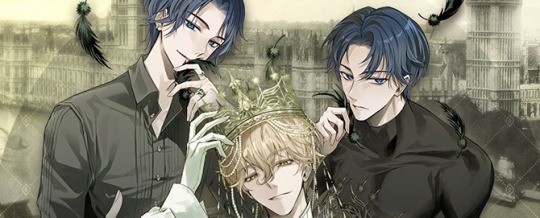
This is a fan-made translation solely for entertainment purposes with no guaranteed perfection; expect mistakes, grammatical errors, and some creative liberties. All original content and media used belongs to Cybird. Please support the game by buying their stories and playing their games. Reblogs appreciated.
Read this before interacting
This is the story of the moment the flowers of love blossomed after having experienced their evil—.
That fateful night, I learned a forbidden secret and became a temporary Fairytale Keeper for a month.
One week after that, Vogel arrived from Germany.
…
A few days after their arrival—.
Darius: I want Miss Fairytale Keeper to choose one of us to spend a full day with as lovers.
And so, that kick started my day spent as his lover—.
…
Darius: That won’t do, because we’re lovers today.
…
Nica: I’ll tell you about myself. So you tell me about yourself too.
Nica: My Schnucki (sweetheart) for a day.
…

Ring: Going on a… d… da… date… with you… I- I’ll do it just fine. Just you watch…!
…
I must never fall in love. And yet—
There's no going back to how things were before I met you.
#ikemen villains#ikemen series#cybird ikemen#cybird otome#ikevil translations#otome#ikevil story event#nica schwartz#ring schwartz#darius vogel
107 notes
·
View notes
Text
Roger Barel Main Route - Chapter 1

As usual, can’t guarantee 100% accuracy on this. I’m doing this for archiving purposes and you can probably find a better translation out there.
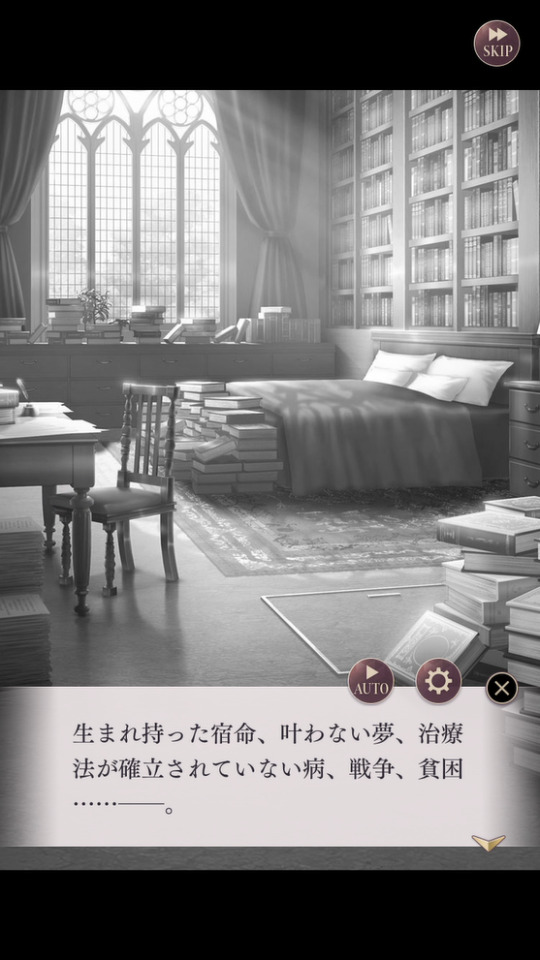
Destiny, unrealizable dreams, incurable disease, war, poverty…
It just goes on.
This world’s a bargain sale of despair.
And it’s called “despair” because you can’t do anything about it.
However, that’s not something I’ll allow.
If you can’t overcome despair— then what’s the point of me, of us humans, being born?
That’s why these days, I live my life flipping it off.
--
It’s been a week since I started my “sinful life” as a Fairytale Keeper.
It wouldn’t be long before I could go back to my former life after keeping this secret—at least that’s what I thought.
--
Darius: While I didn’t expect there to be a get-together soon after our arrival to England, I’m happy.
That night, a dinner party he called a get-together was held…
Between “Crown”, an organization directly under the command of Her Majesty Queen Victoria, and “Vogel”, an organization directly under the command of Germany.
All members were together in one place.
Vogel had just arrived from Germany a few hours ago.
~~ Flashback ~~
Victor: Vogel is a research organization that’s dedicated to the societal contribution of the Cursed Ones. They will be staying in the palace for a few months as goodwill ambassadors.
Darius: Our motto is “the betterment of society through the Cursed Ones”
~~ End flashback ~~
(They looked friendly, not people you should be wary of)
However, there’s something that’s been bothering me for a while now.
Harrison, whose power allowed him to see through lies, said “they’re lying”—
(So long as we don’t truly know them, we shouldn’t let our guard down yet)


Darius, who I believe is the chief of “Vogel” was sitting next to William and enjoying his conversation with him.
(For now I think it’s better for me to lie low and stay quiet)
On the table was a spread of dishes that Victor had put his all into preparing.
(Even though it all looks so delicious…I’m too nervous to eat)
Nica: What’s this? Robin, you haven’t touched your food. Then I’ll take this cherry.
Ring: Nica, you’ll get a stomach ache if you take a stranger’s food.
Nica: What’s with the serious warning, little brother? It’s just an excuse to make an appeal to be friends. Ring, you’re really out of touch.
Ring: …I’m ignorant.
The twins looked similar, with the same hair and eye color.
Kate: Nica and Ring…right?
Nica: Yep, you remembered our names? We remember yours too, Kate. Even though we just met, I think we’ll get along? Hey, show us around the palace. Let’s get out of here.
He slipped his arm around my waist with a practiced gesture and whispered in my ear.
(Wha…)
The moment I stood my guard, I felt someone tug my arm from the opposite side.
Roger: Sorry to interrupt, but Kate’s got a prior engagement with me.
Kate: Roger!
Roger: The queen’s aide’s great at showing people around the palace. He’ll be delighted. Victor, would you mind showing our guests from Vogel around?
Victor: Yes, of course! I will show you around every nook and cranny.
Nica: (¬_¬)…
Nica narrowed his eyes at Victor and then smiled.
Nica: Vielen Dank (Many thanks)
William: While I’d rather not, it’s time to call it a night.
Darius: You’re right, Lord Rex. We of Vogel would like to get along with Crown like a family. Should you ever be in trouble, we’d be delighted for you to turn to us for help, okay?
--
—In a room in Crown’s castle.
In a luxurious room prepared for Vogel, Darius sat comfortably in his chair and smiled.
Darius: What did you think of our get-together with Crown?
Nica: Amazing. I tried to lure the lrobin, but the hunter got in the way.

Darius: Hunter? Ah, you mean the “double-crossing hunter” Roger Barel. Hehe, wanting to snatch the robin* from them is quite reckless.
Ring: …About Roger Barel and that girl…are they together?
Nica: They’re not. But there’s no doubt that Crown cares for the robin a lot.
Darius: Gathering information is our main goal. It’ll be valuable material for eventually realizing our ambitions. Ring, Nica. Continue to gather any useful information on Crown and Robin.
Nica and Ring: Verstanden/…Understood
Darius: …Roger Barel. A former doctor with a strange fixation of “Cursed Ones”. Does he have a place in our “family”?
--
As the get-together came to a close, people started filing out of the room one after the other.
Before I knew it, even Roger disappeared…—
(H-huh?)
I ran out into the hall and saw his solid back.
Kate: Um, what was that prior engagement you mentioned, Roger…?
When I called out to him, he looked back at me in the empty hallway.
Roger: Did I make a mistake thinking you were in trouble?
You did that to help me? +4 +4
I was in a lot of trouble. +4 +4
You weren’t mistaken. +4 +4
Kate: You didn’t. Thank you.
Roger: You looked like a lost dog so I thought I did you an uncharacteristic favor.
(Dog? …No, I didn’t hear that right)
When I thanked him again, I saw a hint of scheming on his face.
Roger: By the way, I didn’t say I did it for free, did I? You’re gonna have to pay me back for saving you.
(Eh?)
Roger: I was thinking about going out drinking with Ellis and Jude. Join us.
Kate: Huh, now? Woah…Wait, Roger!
--
Roger: Phew~That hit the spot. The first drop of beer’s blood, you know.
Ellis: Heh, that’s what you always say.
Jude: Can’t believe he’s a doctor. Well he’s a quack.
(Before I knew it, I ended up getting dragged to a bar)
(It’s something I’ve noticed, but Roger can be a little…no, very pushy.)
Furthermore, it’s a wonder how Jude, who looked like the type to refuse an invitation, was sitting here with a sour look.
Red-headed waiter: Here you are. Fish and chips, bramboraky(?)**, and…
Jude: Just how much did ya order? Ya ate a lot at the get-together.
Roger: I never have my fill when picking at those small fancy food.
Ellis: Are you full, Jude? I can still eat.
Jude: You’re still a growin’ kid.
The trio act like close friends…
Kate: Heh, hehe…
I couldn’t help but laugh and Roger squinted at me with a beer in hand.
Roger: The heck, so you can laugh like that after all.
Kate: Huh?
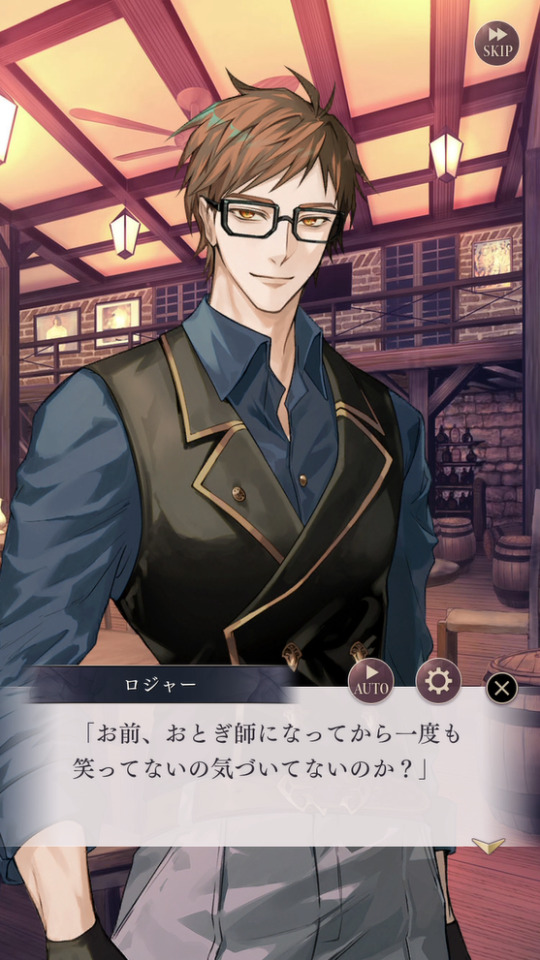
Roger: You know you haven’t laughed since you became Fairytale Keeper?
(What…what? But he’s right, this whole week, I haven’t…)
Roger: You don’t eat much and when you do, it’s like you’re chewing sand. Maybe you did…Or I should say, maybe you didn’t notice yourself?
(Tasked to keep a secret for a whole month as a Fairytale Keeper, and to record the evils before my eyes)
(Not to mention…Vogel’s sudden visit)
Desperate to just push through it all, I gradually neglected the things needed to live, like eating and laughing.
I was like a plant slowly wilting away.
Roger: I know you got a lot of things on your mind that make you anxious. But it’s times like these where you gotta work on yourself. Eat, sleep, play, laugh, recharge your energy. Otherwise you’ll easily get swallowed up by despair in this darkness, lil’ lady.
Kate: …
Roger’s words pierced my heart.
(He’s right…What was I so weak for?)
I could struggle all I wanted, but the anxiety would never leave until I’m safely out of this darkness.
I know that…but.
(The only one who can truly protect me, is me)
(I absolutely cannot give in)
Kate: …You’re right. There’s no time for weakness or despair. Thank you Roger. Now then, time to dig in!
As if to get over it…I stuck my fork into the steaming meat before me and brought it to my mouth.
Kate: Mm…delicious.
(...Somehow, it felt like I was properly enjoying food for the first time in a while)
(It’s so good to be alive and have delicious food)
Roger: …
Jude: Oi, who do ya think you are takin’ the first bite.
Kate: Ah, sorry! I got ahead of myself.
Ellis: Don’t worry about it Kate. Here, try these chips with rock salt.
Kate: Wow, this is really good! It pairs well with alcohol.
Roger: Oh, you drink pretty well. Barkeep! Two more beers.
Barkeep: Gotcha. Two large beers comin’ right up.
The golden beer and the food were delicious, and laughter reached my ears.
(...Ah, this is fun. I feel like I’m finally able to breathe)
(He pretty much dragged me here, but I’m glad I accepted Roger’s invitation)
I didn’t know how much of Roger’s actions were calculated and how much was in good faith.
But it’s a fact that his pushiness saved me.
(Roger really does have a lot of common sense and is like a mature older brother)
With those simple thoughts in mind, I continued on drinking and drinking…
--
—I woke up in a soft bed.
(Huh…last night I was drinking at the bar, and)
While in my drowsy and lethargic state, I groped around for a warm cloth when—
Kate: Hm…? …??
(...I’m naked?!)
I quickly wrapped myself up in a blanket with only my face peeking out.
…And noticed something familiar laying by my pillow.
(...Glasses?)
The black-rim and intellectual-looking frame was definitely memorable.
(These glasses…)
The moment I nervously picked them up, the bed squeaked—
Roger: Hey now, those glasses aren’t a toy…Come on, give it here.
When the glasses were snatched out of my hand, I looked up to see a half-dressed Roger hovering over me.
Kate: …W-why are you here…
When I looked at him, he smiled as if to tell me the question was pointless now.
Roger: You passed out drunk so I had to carry you back. And after dropping you off, you wouldn’t let me go.
Whether it was true or not, the way he said it made it sound like I was pleading for him and my cheeks warmed.
(I-I held Roger back?)
(And…moreover)
My eyes took in his muscular chest and abs that were freely on display.
(T-too much stimulation…)
(I don’t know where to look)
Not just his bare chest.
Muscular arms peeking out from his shirt, broad shoulders that connected to a thick neck, and a lean waist.
(But, he was like beautiful sculpture)
My eyes unconsciously traced the supple skin.
His muscular body disguised his intelligent features and that gap alone was enough to make me dizzy.

Roger: …It’s not bad being ogled like this.
Kate: Eh?!
Roger gave me the wickedest of grins.
I’d been unconsciously staring at his body and my cheeks burned in embarrassment.
Kate: S-sorry…
Roger: Don’t worry about it. You’re a lot cuter than you were yesterday.
Kate: Did I…end up doing something yesterday?
Roger: “Something”.
Roger lowered himself and whispered to me.
Roger: …Yeah, last night was pretty hot, wasn’t it lil’ lady?
(N-no way…Me and Roger?)
Next
-
*Darius says red riding hood but the subtitle says robin
**Send help. I have no idea what the heck バンブリーキ is. Perhaps bramboraky according to @/hoerayner
159 notes
·
View notes
Text



Alright, what we know is:
(left to right) Lynn Schwartz, Darius Vogel, Nika Schwartz (google translated so take it with a pinch of salt)
green and red guy are most likely siblings(twins?)
Darius last name means Bird, Nika and Lynns mean black
Theyre in an organization under direct control of the german emperor
They probably have curses as well??
80 notes
·
View notes
Note
merry christmas! 🎄🎁✨ can you brainrot a little (or a lot…?) about nica in the answer to this ask? :3c
Merry Christmas! Dunno who this is, but I appreciate you for asking me to brainrot about one of my favorite characters.
Since he's only on JP at the moment I'm gonna keep things under a spoiler even if it's just theories and ramblings mixed with gushing.
Not a whole lot is really known about Vogel, I've yet to read the new event translations some friends on here have translated (since thats usually how I get the gist of stuff like Villains.) but from my understanding Nica is very similar to Nokto (another fave of mine, I'm developing a pattern) in his mannerisms and attitude, perhaps a bit more open with his emotions and sassiness.
He has a few bond stories where he's just the most pouty little shit. Also in his bond stories, he's the BIGGEST piece of work ever. I cannot stop giggling whenever he does something goofy. He balances that suave manipulation and charisma with a goofy and overly-dramatic flair and I just think that's a fantastic way to deal with what will inevitably (i think, who knows?) be a character with very blurred moral lines and values.
He strikes me as interesting because - going back to the parallel with Nokto - there's attachment to his brothers for Nokto that keeps him doing what he does. As of the 'Wrapped in a Wicked Romance' Story Event releasing on JP servers these past couple days, my impressions of Nica are as follows:
He's unattached to his brother, or at the very least pushes him away more than most brothers in IkeSeries.
He and Ring were experimented on for a time before Darius found them, and Ring has been somewhat noting of the fact Nica's different than he used to be. My guess is that Nica just doesn't want to hurt himself or Ring by something to one of them in the future.
He's voiced that he has a particular dislike for potatoes due to having to eat them constantly, probably pointing to a low status, lack of money to get "better" food or a mix of both
This one's a bit focused on oc/canon, but can just be a general headcanon: he's been in love before, but due to his curse, he believes those feelings will evaporate as quick as they come, so he prefers to keep emotions out of romantic exchanges entirely.
I might write more another time, or edit this, but for now, thank you for coming to my Xmas TED talk.
Also I'm hopefully gonna make a lil' Nica doll, so maybe i can document that in the future.
18 notes
·
View notes
Text
Critically Examining the Case for Book of Mormon Historicity
Preface: This started as a YouTube comment and turned into a much more extended essay, as I had meant to work on such an essay for some time. In case you're inclined to ask why I bothered to write all of this, here's why: for different reasons, I find the ancient Near East, the Bible, ancient Mesoamerica, and Mormon origins to be profoundly interesting, and these subjects converge in discussing with LDS scholars the origins of the Book of Mormon. I've never been LDS and my interest in Mormonism is largely academic, though as a believing Christian I have an interest in engaging Mormonism from an orthodox Christian perspective. For those who are interested in reading through this, I hope it both stimulates your own consideration of these issues and sharpens up your ability to engage credibly with LDS family and friends who use such arguments. This essay considers seventeen arguments made by Dr. John Clark, a well-regarded archaeologist of ancient Mesoamerica.
As a non-Mormon and an interested reader of LDS scholarship (which I enjoy reading in the midst of deep disagreements) , I think that this video provides a good encapsulation of where defenses of Book of Mormon historicity tend to go wrong:
https://www.youtube.com/watch?v=EkF4hlddGfw
The basic model of these arguments for Book of Mormon historicity are that there is a feature of the Book of Mormon text which was unknown or absurd in Joseph's day but which is now confirmed by historians of the ancient Near East and Mesoamerica in our own day. In order to evaluate these arguments, I want to spell out what I take to be important methodological points:
1. The two models we are comparing are a) the Book of Mormon as an ancient Mesoamerican codex engraved by authors of roughly Near Eastern extraction and b) the Book of Mormon as a production of the 19th century, written by author(s) familiar with the then popular ideas about the "Mound Builders." These mounds no longer occasion much interest because most of them have been removed or have been built over. But to persons of Joseph Smith's time and place, the Indian Mounds dotted the landscape and provided observers with much material upon which to speculate. Dan Vogel's "Indian Origins and the Book of Mormon" provides a clear and well-argued defense of this model of Book of Mormon origins.
2. This means that we are not looking at what scholars of ancient America thought in Joseph Smith's day. Then, as today, what academics thought and what was ingrained in the popular understanding were very different things. As LDS scholars often point out, Joseph Smith was relatively unlearned. We would therefore expect a production by Smith or someone associated with him to reflect popular understandings of ancient American civilization rather than academic understandings of that civilization. Hence, to compare what **academics** thought of ancient America in the 19th century with the Book of Mormon is a false trail. Nobody is suggesting that a 19th century scholar of ancient America composed the Book of Mormon.
3. We are not comparing 19th century conceptions of Mesoamerica with 21st century conceptions of Mesoamerica, as nonbelieving accounts for the production of the Book of Mormon do not set its narrative in Central America. Rather, as just described above, the setting of the Book of Mormon according to those who reject its historical authenticity is generally in the North American Heartland, including upstate New York.
These considerations lead us to the most important principle in evaluating claims of Book of Mormon authenticity. If a feature of the Book of Mormon text is found **both** in the ancient world **and** in the popular understanding of Joseph Smith's time and place, then the feature of the text **provides no argument for its authenticity or for its non-authenticity.** Both skeptics and believers of the Book can fall into this trap. In the same vein, we must understand that American culture in the 19th century was far from a monolith. What was believable and normal in 1830 Palmyra might be laughable to a scholar of that period or to a layperson in another area of the country. Thus, that critics once laughed at a feature of the Book of Mormon which has since been found in the ancient world is only significant if the feature was laughable and unexpected in the precise cultural context which enveloped Joseph Smith himself.
Each of the arguments made by Dr. Clark is a point which concerns two worlds. While Dr. Clark is an eminent expert in one of these worlds, in the other, he is merely a layman. The former is Mesoamerica, the latter is 19th century upstate New York. This point must be emphasized, because in several instances Dr. Clark explicitly makes a claim about what was conceivable for "19th century Yankees", with similar claims implied for his other arguments. My argument is that the major failure of his argument turns not on a misunderstanding of Central America (Clark is too much of a scholar to simply have "misconceptions" about Central America), but on a series of failures to grapple with Joseph Smith's own cultural context. Because of the paramount importance of a well-crafted methodology in approaching the question of Book of Mormon historicity, I will be returning to this point again and again in relation to the specific arguments presented by Dr. Clark.
With these points in mind, let's turn to the specific arguments.
1. Metal plates in stone boxes.
The first concerns metal plates sealed in stone boxes. We are told that this claim was thought to be ludicrous in Joseph's time but has since been shown to be authentically ancient. The engraved gold plates of Darius, sealed in a stone box, probably provide the closest analogue to the Book of Mormon plates. But there are serious issues with using this as an argument for the Book's authenticity. First, while engraved metal plates have been found in the ancient world, there has never been a text of the size of the Book of Mormon found- not even close. That a local aristocrat such as Laban had much of the Old Testament translated into Egyptian and engraved on brass plates indicates that the engraving of large records, comprising multiple scrolls, must have been somewhat common in the 6th century BC. The plates that have been discovered provide only a moderate parallel to the description found in the Book of Mormon.
Still, were there no analogue of similar precision found in Joseph Smith's own time and place, this would be a remarkable parallel. However, there are such analogues. The first comes from the surviving Spalding Manuscript, which I use only as an example of what was current in Joseph Smith's background, not as an argument for the Spalding-Rigdon model of BoM authorship. The Spalding Manuscript describes a colony of Roman Christians from the 4th century AD, blown ashore to the American continent accidentally. The internal narrative of the story is that Fabius, the leader of the colony, recorded the history of his people on a document and then sealed it away in a stone box, placing that box inside a cave. Fabius does so in order that the record might come forth and be translated by future Europeans so that they might know the history of Fabius' people. The plates of the Book of Mormon are similarly supposed to record the history of an ancient civilization extracted from the Old World, sealed away in a box with the intention that they should later come forth and be translated so that the later inhabitants of the American continent might know its history. Moreover, testimony from Brigham Young and Oliver Cowdery suggests that the stone box was thought to be hidden away inside a cave filled with records. I am not suggesting literary dependence. Rather, I am pointing out that analogues, even relatively close ones, were indeed present to Joseph Smith in 1830, and that the currency of these ideas indicates that the Book of Mormon's internal account of its sealing in a stone box does not need to be explained in terms of the ancient world: ultimately, it would be a wash.
But what about metal plates? Fabius' account is not engraved on plates of metal. Was this laughable in Smith's context? No, it wasn't. Fawn Brodie (whatever one thinks of her reconstruction of Smith, I refer to her book because of its citation of primary texts) notes that "a Palmyra paper in 1821 had reported that diggers on the Erie Canal had unearthed 'several brass plates' along with skeletons and fragments of pottery." (No Man Knows My History, 35) So, we find that in the cultural world immersing the young Joseph Smith, there are already ideas of records sealed up in stone boxes as well as engraved metal plates, and that these ideas were linked with the Indians, particularly the Mound Builders which forms the setting of the Book of Mormon according to nonbelievers.
So this, at best, is a wash. At worst, the immediacy of the parallel to Joseph's own context and the lack of precise analogues in the Near East (given the length of the record) provides a slight advantage to nonbelieving models for BoM origins. An argument could be made for either, but this is miles away from the slam dunk suggested by Dr. Clark.
2. Ancient American writing
Dr. Clark argues that the Book's description of writing and books in ancient America are exceptionally prescient, given what was then thought of ancient America.
The above examples suffice to show that it was hardly inconceivable in Joseph Smith's world that ancient Americans had writing systems. After all, the fundamental idea undergirding popular ideas about the Mound Builders was that the Mound Builders represented a lost civilization of basically Old World extraction, having all the sophistication known from the Old World, but wiped out by the ancestors of the American Indians known in the 19th century. The Book of Mormon provides a particular spin on this narrative, but it is recognizable as a form of the narrative. So, given the Book's situation in this narrative world (according to those of us who don't believe the Book is historically authentic), it is entirely reasonable that writing systems should be described. And since nobody is alleging that Joseph produced the Book based on an academic understanding of Mesoamerica current in his day, Clark's comparison of the BoM with the scholarly knowledge in 1830 is a false one. However ludicrous ancient American writing might have been to the scholars of 1830, Joseph Smith wasn't acquainted with their ideas, but with the ideas of those for whom ancient American writing was to be expected.
There is thus a close analogue in both the world of Joseph Smith and in ancient Mesoamerica, if one is simply considering the presence of written language. Given that the writing systems of ancient Mesoamerica are not presently related to any Old World writing system, the parallel to the Book of Mormon is quite vague, as the latter describes writing systems derived from Hebrew and Egyptian. So the parallel is merely in the concept of written texts- hardly precise enough to be striking.
3. Ancient American Warfare
Dr. Clark describes the notion of warfare in ancient America as having been "ridiculed" in the Book of Mormon until about twenty years ago. But as before, the question concerns the source of that ridicule. Would a person in Joseph's environment ridicule the idea of wars of extermination among the ancient inhabitants of the Americas? Certainly not. This was the basis for the mythos of the Mound Builders- that the creators of the advanced civilizations of ancient America were savagely wiped out by the ancestors of the Native Americans known to Joseph and his contemporaries. These immense wars of genocide were then seen to explain the ubiquity of the mounds heaped up with the remains of ancient inhabitants of the continent. The Book of Mormon contains a number of passages suggesting its origin, in part, as an etiology of these mounds, where the bones were visibly heaped up almost immediately under the surface:
Alma 16:11: "Nevertheless, after many days their dead bodies were heaped up upon the face of the earth, and they were covered with a shallow covering."
Alma 28:11: "And the bodies of many thousands are laid low in the earth, while the bodies of many thousands are moldering in heaps upon the face of the earth; yea, and many thousands are mourning for the loss of their kindred, because they have reason to fear, according to the promises of the Lord, that they are consigned to a state of endless wo."
Mormon 2:15: "And it came to pass that my sorrow did return unto me again, and I saw that the day of grace was passed with them, both temporally and spiritually; for I saw thousands of them hewn down in open rebellion against their God, and heaped up as dung upon the face of the land. And thus three hundred and forty and four years had passed away."
Ether 11:6: "And there was great calamity in all the land, for they had testified that a great curse should come upon the land, and also upon the people, and that there should be a great destruction among them, such an one as never had been upon the face of the earth, and their bones should become as heaps of earth upon the face of the land except they should repent of their wickedness."
Even apart from the link between the Mound Builder mythos and the Book of Mormon, bloody wars with Native Americans were a matter of living memory and direct knowledge for contemporaries of Joseph Smith's. This is one place where I am genuinely mystified by Dr. Clark's assertion. Why would anybody in Joseph Smith's environment be surprised that he describes ancient Americans as fighting wars?
4. Nature of Civilization
Dr. Clark states that the account of ancient American civilization differs markedly from what Joseph would have expected from his own knowledge of the American Indians and their culture, But this misses the point in a crucially important way. The Mound Builder mythos itself arose as an explanation for an apparent discontinuity for the high civilization evident from the mounds and the perceived low culture of the Native Americans of the 19th century. As wrong as Rodney Meldrum is, he and his compatriots have played a helpful role in reminding everyone that there is evidence of civilization in North America, with highways, fortifications, and the like. In their efforts to demonstrate that "Joseph knew" the setting of the Book of Mormon in the Heartland of North America, they have also provided extremely helpful documentation showing that this evidence of civilization was known to Joseph and his contemporaries.The important point is that these features were immediately apparent in Joseph Smith's own day, as the mounds which have now been eradicated or built over were visible to the naked eye and well-known as a feature of the landscape.
[As a minor footnote, even if these things were not known to Joseph and his contemporaries, anyone describing an ancient civilization of Old World extraction would draw features known from Old World cultures, which is particularly predictable for a narrative like the Book of Mormon, anchored in the detailed information given about ancient Israelite civilization.]
According to the Mount Builder mythos, the architects of the great civilization evident in the Mounds were wiped out by the ancestors of the Indians known to 19th century Americans. In the Book of Mormon, this position is neatly filled by the Lamanites, cursed with a red skin (which is at the very least the strong prima facie evidence of the BoM text) and identified as the forefathers of the Indians. 2 Nephi 5:24 serves as an etiology for the perceived low culture of these Indians:
2 Nephi 5:24: "And because of their cursing which was upon them they did become an idle people, full of mischief and subtlety, and did seek in the wilderness for beasts of prey."
Enos 1:20 provides an even clearer example:
Enos 1:20: "And I bear record that the people of Nephi did seek diligently to restore the Lamanites unto the true faith in God. But our labors were vain; their hatred was fixed, and they were led by their evil nature that they became wild, and ferocious, and a bloodthirsty people, full of idolatry and filthiness; feeding upon beasts of prey; dwelling in tents, and wandering about in the wilderness with a short skin girdle about their loins and their heads shaven; and their skill was in the bow, and in the cimeter, and the ax. And many of them did eat nothing save it was raw meat; and they were continually seeking to destroy us."
And see also:
Mormon 6:9: "And it came to pass that they did fall upon my people with the sword, and with the bow, and with the arrow, and with the ax, and with all manner of weapons of war."
The red-skinned Lamanites are noted for their association with the bow and the axe- both well known associates of Native Americans known to Smith, whose favorite weapons were the bow and the tomahawk axe. I'm not sure when the teepee became a stereotype for Native Americans in general, but if it was present in Smith's day (I'm working to confirm or deny its presence), then the notation about the tents provides another specific convergence to Smith's background and context. The reference to the shaven heads likewise hits the mark for the Native Americans known to Smith, for whom a partially or entirely shaved head was a common hairstyle. And the reference to loincloths is easily accounted for in terms of the "breechcloth" which was common to most Native American tribes and would have been immediately known to Smith and his contemporaries. Thus, while the Nephites (and righteous Lamanites who are turned white- thus suggesting a path of redemption for the Natives known to Smith) are described in terms of civilization familiar to the Old World, the Lamanites who are the ancestors of the American Indians known to Smith (in the unbelieving model of Book of Mormon origins) are described in a way which immediately rings true with what was thought in the 19th century. I don't write this to attack Smith or his contemporaries for believing this, but simply to note that the Book of Mormon resembles almost precisely what one would expect from a text drawing on the Mound Builder mythos.
5. Weapons and Armor
Dr. Clark then states that the description of Book of Mormon weapons and armor converge unexpectedly and specifically with ancient Mesoamerica. As evidence for the historicity of the Book of Mormon, this point cannot prove very much, since the weapons described are easily explained as a result of a) a biblical history of ancient America mirroring biblical warfare, where all of the mentioned weapons and armor are described and b) knowledge of weapons used by Indians of the 19th century and found in Indian Mounds. The latter accounts for the peculiar prominence of the axe (tomahawk) and bow in relation to the Lamanites, who are linked with the Native Americans of the 19th century on the non-historical model of Book of Mormon authorship.
5a. Excursus on Metals in Mesoamerica
By itself, then, the presence of these weapons is neither an argument for or against the Book of Mormon, as their textual presence can be explained both as an authentic Mesoamerican history and as a projection of biblical warfare. However, when further detail is considered, the weapons described point away from Book of Mormon historicity and towards a 19th century origin. First, as mentioned above, the weapons associated with the Lamanites are suggestive of a 19th century cultural background. Second, and more seriously, while most references to Book of Mormon weapons and armor are nondescript concerning their makeup, those details which do exist each point towards a metallic origin. No reader of the Book of Mormon without knowledge of ancient America would have any reason to suppose that they were made of anything else- on "bloodstains" see below. Evidence of metallurgy in Mesoamerica during Book of Mormon times is slim to nonexistent. It is important to distinguish metallurgy from the use of metal. John Sorenson has plausibly noted linguistic and some archaeological evidence for the use of metals in Central America during Book of Mormon times.
However, as Deanne Matheny points out:
"It is important to distinguish between metalworking, 'the act or process of shaping things out of metal' and metallurgy, the 'science and technology of metals' which may involve such processes as smelting, casting, and alloying." ("Does the Shoe Fit" in "New Approaches to the Book of Mormon", p. 283)
The Book of Mormon is very clear that the Lehites and the Jaredites possessed advanced metallurgical technology. Not only does the text describe tools (such as swords fashioned after Laban's model) which can only be produced by metallurgy, it makes explicit references to metallurgy. "Dross" is used as a metaphor in both Alma 32:3 and 34:29. The latter is placed in the mouth of Alma himself, preaching to the people and saying "if ye do not remember to be charitable, ye are as dross, which the refiners do cast out, (it being of no worth) and is trodden under foot of men." This comment is immensely significant in evaluating the presence of metallurgy in the Book of Mormon, because its use as a metaphor indicates that it must have been common enough for the average person to understand. Hence, in the society described, metallurgists would play an important economic and civic role, and given the intelligibility of the metaphor, it would be strange if Book of Mormon civilizations did not use their knowledge of advanced metallurgy to produce metal weapons and armor, as such implements would provide a decisive advantage in war with those cities which did not use metallurgical technology.
Helaman 6:11 explicitly describes the extent of metallurgy at this point in Book of Mormon history: "And behold, there was all manner of gold in both these lands, and of silver, and of precious ore of every kind; and there were also curious workmen, who did work all kinds of ore and did refine it; and thus they did become rich."
Helaman 6:9 describes the geographical extent of this knowledge: "And it came to pass that they became exceedingly rich, both the Lamanites and the Nephites; and they did have an exceeding plenty of gold, and of silver, and of all manner of precious metals, both in the land south and in the land north."
Thus, in the first century before Christ, advanced metallurgy is known among both Nephites and Lamanites and is prominent throughout the entirety of the lands described in the text. Given the vast extent of this knowledge- in both land northward and land southward, among both Nephites and Lamanites, among both rich and common (as evident in its intelligible metaphorical application)- it would be totally unexpected for this knowledge to simply pass away, as some Book of Mormon scholars have suggested occurred. Metallurgy is an important enough technology that once it is established on a large scale, it will not be forgotten by accident.
2 Nephi 5:14-15: And I, Nephi, did take the sword of Laban, and after the manner of it did make many swords, lest by any means the people who were now called Lamanites should come upon us and destroy us; for I knew their hatred towards me and my children and those who were called my people. And I did teach my people to build buildings, and to work in all manner of wood, and of iron, and of copper, and of brass, and of steel, and of gold, and of silver, and of precious ores, which were in great abundance.
The close textual conjunction of the making of swords like Laban's sword and the description of metallurgy strongly mitigates against an interpretation which suggests that the swords were like Laban's in form but not in their metallic constitution. 1 Nephi 17:10-11 describes the process of Nephi's metallurgical knowledge, where ore is mined, refined through the use of bellows as smelting tools. The emphasis placed on the working of various metals suggests that they must have been of supreme importance in Book of Mormon societies. Indeed, the use of metal seems to be a literary motif that runs throughout the Book, as signified in its engraving on a book of metal plates.
Jarom 1:8: And we multiplied exceedingly, and spread upon the face of the land, and became exceedingly rich in gold, and in silver, and in precious things, and in fine workmanship of wood, in buildings, and in machinery, and also in iron and copper, and brass and steel, making all manner of tools of every kind to till the ground, and weapons of war -- yea, the sharp pointed arrow, and the quiver, and the dart, and the javelin, and all preparations for war.
The text here links the use of metallurgical "machinery" with the making of both agricultural tools and weapons of war. Such would be expected from a projection of Old World civilization as known from the Bible, but would be manifestly unexpected as a description of an ancient Mesoamerican civilization.
Ether 7:9: Wherefore, he came to the hill Ephraim, and he did molten out of the hill, and made swords out of steel for those whom he had drawn away with him; and after he had armed them with swords he returned to the city Nehor and gave battle unto his brother Corihor, by which means he obtained the kingdom and restored it unto his father Kib.
Here, almost at the earliest point in Book of Mormon history, we are told of metal swords being produced by metallurgy in ancient America.
Ether 10:23-27: And they did work in all manner of ore, and they did make gold, and silver, and iron, and brass, and all manner of metals; and they did dig it out of the earth; wherefore they did cast up mighty heaps of earth to get ore, of gold, and of silver, and of iron, and of copper. And they did work all manner of fine work. And they did have silks, and fine-twined linen; and they did work all manner of cloth, that they might clothe themselves from their nakedness. And they did make all manner of tools to till the earth, both to plow and to sow, to reap and to hoe, and also to thrash. And they did make all manner of tools with which they did work their beasts. And they did make all manner of weapons of war. And they did work all manner of work of exceedingly curious workmanship.
Several centuries later (during the time of Kish and Lib) in Jaredite history, metal is a central feature of Jaredite civilization, and the mining of ore and its refining into metal is described in the context of agricultural tools and weapons of war. The phrase "exceedingly curious workmanship" is also generally used of metallic implements in the Book of Mormon.
At the very latest point in Book of Mormon chronology, Moroni indicates that metallurgical knowledge was available to him in Mormon 8:5: "Behold, my father hath made this record, and he hath written the intent thereof. And behold, I would write it also if I had room upon the plates, but I have not; and ore I have none, for I am alone."
If ore were available, the text clearly implies, Moroni had the skills necessary to extract the necessary metals and make additional plates. Thus, metallurgy is in evidence from almost the beginning of the Jaredite history to the exact end of the Lehite history. Moreover, it is not presented as an ancillary feature of Book of Mormon civilizations. Rather, metallurgy is presented as central to the economies of both Nephite and Jaredite peoples. It is described in conjunction with the creation of agricultural and military implements during both the Jaredite and Lehite periods. War and food are twin pillars of any ancient society, including ancient America. It was known at the beginning, middle, and end of the Lehite period, with its use spanning the entirety of Book of Mormon lands and both Nephite and Lamanite branches of the nation.
Evidence for metallurgy during this period in Central America is basically absent. I say "basically" only to leave open the possibility that I have missed the publication of marginal evidence for metallurgy during the appropriate period. However, as far as I know, the first evidence for metallurgy in Mesoamerica comes around 700 AD. Before this period, the only evidence for pre-Columbian metallurgy is in ancient Peru, which is not relevant to Book of Mormon lands on the standard Mesoamerican geography. What is remarkable is the absence of the evidence in Mesoamerica during Book of Mormon times when its presence is clearly known in Central American archaeology from 700 onwards, especially in light of the centrality of metallurgy to Book of Mormon civilizations.
While it is always possible that evidence for metallurgy will be forthcoming in the future, as long as one is speaking of the present state of the evidence, one is faced with the complete absence of archaeological evidence for one of the most central features of Book of Mormon civilizations for the entirety of its timeline of two and a half millennia. Given the appearance of such evidence several centuries after Mormon's death, this is evidence that one would expect to see if the Book of Mormon were truly an ancient Mesoamerican codex. But it is missing.
Back to Weapons and Armor
I spent so much space discussing the issue of metallurgy because of the centrality of warfare to Book of Mormon history and the importance placed on the convergence between Book of Mormon history and ancient America in this respect by Dr. Clark and other LDS scholars. Below I will return to the issue of specific weapons and the nature of the convergence with Mesoamerican evidence.
5b. Breastplates:
Breastplates are described several times in the Book of Mormon, and are known from ancient America. However, the one time that the makeup of a breastplate is identified, we are told that it is of brass and copper, referring to Jaredite armor brought to King Mosiah:
Mosiah 8:10: And behold, also, they have brought breastplates, which are large, and they are of brass and of copper, and are perfectly sound.
5c. Swords:
Ether 7:9: Wherefore, he came to the hill Ephraim, and he did molten out of the hill, and made swords out of steel for those whom he had drawn away with him; and after he had armed them with swords he returned to the city Nehor and gave battle unto his brother Corihor, by which means he obtained the kingdom and restored it unto his father Kib.
1 Nephi 4:9: And I beheld his sword, and I drew it forth from the sheath thereof; and the hilt thereof was of pure gold, and the workmanship thereof was exceedingly fine, and I saw that the blade thereof was of the most precious steel.
2 Nephi 5:14: And I, Nephi, did take the sword of Laban, and after the manner of it did make many swords, lest by any means the people who were now called Lamanites should come upon us and destroy us; for I knew their hatred towards me and my children and those who were called my people.
Mosiah 8:11: And again, they have brought swords, the hilts thereof have perished, and the blades thereof were cankered with rust; and there is no one in the land that is able to interpret the language or the engravings that are on the plates. Therefore I said unto thee: Canst thou translate?
Thus, when it comes to swords, the only textual evidence for the composition of swords in the text of the Book of Mormon is that they are metal. Dr. Clark, however, argues that there is evidence for non-metal swords in Alma 24, where the swords are described as having the ability to be stained with blood.The first thing to point out is that the text describes the swords, after having been cleansed, becoming "bright", an adjective which makes far more sense in reference to a clean metal sword which shines in the sunlight than it does to a wooden sword. Second, the use of "bloodstained" in reference to swords provides little evidence that the swords were anything other than metal, as "bloodstained" is used of metal swords in the parlance of Joseph Smith's day.
To give just one example (searching Google Books produces a good number of examples) from 1825, Augustin Thierry's "History of the Conquest of England" (p. 127) describes a "bloodstained sword." Language of staining with blood is frequently metaphorical- one says that one has bloodstained hands if one is guilty of murder, not because the skin on one's hand has reddened permanently. Given, then, that this phrase was attested in Joseph Smith's day when speaking of metal swords, one cannot take this as evidence that the swords are anything other than metal. Of course, it's possible, given the constraints of the text, that some of the swords described could be made of something other than metal. But there are a number of passages which clearly describe metal swords, and there are no passages which clearly describe a non-metal sword. There are no hermeneutical grounds for assuming that every sword in the text refers to a non-metal sword unless it specifically states otherwise. Such an interpretation must be brought to the text on the basis of Mesoamerican archaeology, in which case the strength of an independent convergence between the text and the evidence disappears.
Evidence for metallurgy in the appropriate time periods is presently lacking, and the Book of Mormon text needs to be supplemented by conjecture to bring it into line with the archaeological evidence. Thus, the picture that Clark paints of a specific convergence between the Book of Mormon text and Mesoamerican civilization of the appropriate time period is exaggerated at best. At a deeper level, however, this point reveals the profound discordance presently existing between Mesoamerican archaeology and the Book of Mormon. Throughout the text, metallurgy is presented as widely known and centrally important for agriculture, warfare, and trade. With regard to the specific issue of weapons, the convergence suggested by Dr. Clark is actually a substantial discordance, for the weapons known from ancient Mesoamerica are not made of metal, while the only indications provided in the text are for metal weapons and armor, along with a substantial metallurgical industry. This must be regarded as a substantial argument against the historicity of the Book of Mormon- a major textual feature permeating the whole narrative which is entirely absent from the appropriate time and place.
5d. Cotton Armor
Dr. Clark briefly mentions cotton armor as a convergence between the Book of Mormon and ancient Mesoamerica. Such a convergence, as something not present in the Bible nor (to the best of my knowledge) to the Indians of Joseph Smith's day, would be exactly the kind of convergence which is striking. But it is not present, as Dr. Clark suggests, in the Book of Mormon text. On screen, Alma 43:19 is cited, which refers to the "thick clothing" of the Nephite armies. At most, this is a vague convergence rather than a specific one as cotton is not mentioned. However, a better textual explanation for this feature can be found. I discussed above the description of Lamanites as wearing loincloths and its connection with the "breechcloths" widely known among the Indians of Joseph Smith's day. This is described in the text as one of the features differentiating the civilization of the early Nephites with the wildness of the Lamanites, who are nearly naked, live in tents, and subsist on uncooked meat. Here, in Alma 43, we see Nephite and Lamanite soldiers clashing, and the differences between the two cultures (the stereotypical contrasts present in the Mound Builder mythos) is drawn into focus. In Alma 43:20, we are told about the Lamanites who see the Nephites with their armor and "thick clothing":
"Now the army of Zerahemnah was not prepared with any such thing; they had only their swords and their cimeters, their bows and their arrows, their stones and their slings; and they were naked, save it were a skin which was girded about their loins; yea, all were naked, save it were the Zoramites and the Amalekites"
This text is very similar to the above-cited text concerning the initial wildness of Laman's people. We are told of their typical weapons of warfare and their near-nakedness except the "skin which was girded about their loins." The meeting of these armies thus provides a glimpse at the sharp difference between the civilized Nephites and the wild Lamanites who explain the perceived savagery of 19th century Native Americans. The reference to "thick garments" then, is explained best as a contrast between the near-nakedness of the Lamanite army with the sophistication and civilization of the Nephite army. While it is possible, given the constraints of the text, that it refers to cotton armor, the literary contrast is sufficient to explain why "thick garments" are described, so that absent any additional evidence (which is not, as far as I can see, present), it is an unjustified leap to identify characteristically Mesoamerican cotton armor in the Book of Mormon text.
To sum up this most important section, there is nothing that I can see in the textual description of Book of Mormon implements of war that is convergent with ancient Mesoamerica in a way that is discordant with Joseph's own context. On the other hand, there are major discordances between present knowledge of Mesoamerica and the Book of Mormon- discordances which are convergent with Joseph's own context.
6. The Use of Severed Arms as War Tribute to the King
Dr. Clark next turns to the story of Ammon and the presentation of severed arms to King Lamoni as evidence of a convergence with ancient Mesoamerican war practice, which is said to include the presentation of severed arms as a traditional feature of warfare. However, the documentation provided about ancient America is too vague to make this a strong convergence. This article cites the specific sources underlying this argument:
https://knowhy.bookofmormoncentral.org/content/why-did-the-servants-present-lamoni-with-the-arms-of-his-enemies
In this case, two sets of parallels are cited. The first set comes from the ancient Near East, but the parallel concerns merely the severing of any body part as a war trophy, including heads, arms, hands, or legs. This practice is attested in the Bible, obviously available to Joseph Smith, and does not apparently include the ritual presentation of the severed body parts to the king. From ancient America, Izapa Stela 25 is cited, which is mythological in nature. It shows two heroic twins in a fight with Seven Macaw. When one attempts to grab Seven Macaw, Seven Macaw tears off his arm and hangs it over a fire. Here, the only parallel is in the tearing off of an arm, hardly specific enough to require situating the Book of Mormon in the ancient world. And while the authors state that the story "likely reflects actual Maya attitudes and practices in war and conflict", no specific evidence for this practice is described. The other example cited comes over a thousand years after the close of the Book of Mormon and refers to the Aztecs throwing severed limbs of Spanish soldiers at the Spaniards to taunt them. In addition to the chronological gap, there is no evidence that this was an established ritual among Mesoamerican civilizations, and the severed limbs are used to taunt enemy soldiers and strike terror into them rather than being ritually presented to the king.
Ultimately, then, there is no specific evidence that the practice described (once) in the Book of Mormon was a ritual practice in ancient Mesoamerica. Alma 17 describes Ammon's enemies "lifting their clubs" against Ammon, who cuts their arms off. The image which one is supposed to derive from this is of a number of soldiers attacking Ammon all at once, who is so skillful in battle that as soon as one raises an arm against him, he slices the arm off, and within moments, he swiftly maneuvers to cut another arm off in the same way. Thus, the severed arms are significant in that they particularly reflect Ammon's valor and skill in warfare and his ability to decisively win an engagement in which he is significantly outnumbered. The peculiarities of the text are explained in terms of the literary purpose of the story. As above, this does not rule out ancient Mesoamerican context, but absent more specific evidence, hypothesizing such a context is unnecessary to explain the text's production and thus does not indicate an anomaly in a model of 19th century authorship requiring the Book's ancient authenticity as an explanation.
7. Towers as a Place of Final Surrender
Dr. Clark then turns to the scene described in Moroni 9, where Mormon narrates the Lamanites' taking prisoners from the tower of Sherrizah. This, he argues, reflects the ancient Mesoamerican practice of fleeing to the tower/pyramid (the two are used interchangeably in the Bible and thus reasonably so in the Book of Mormon) as places of last defense and surrender. While he may have additional evidence for this practice, the only evidence he cites is the fact that broken or burning pyramids are a symbol of a city's conquest in Mesoamerican art and iconography, which is vaguer than the specific convergence being cited. More importantly, however, the notion of the tower as a place of last refuge is present in the Bible and thus directly available to Joseph Smith:
(Judges 9:50-52) Then Abimelech went to Thebez and encamped against Thebez and captured it. But there was a strong tower within the city, and all the men and women and all the leaders of the city fled to it and shut themselves in, and they went up to the roof of the tower. And Abimelech came to the tower and fought against it and drew near to the door of the tower to burn it with fire.
While Abimelech is then unexpectedly killed, the story closely resembles the story in Moroni 9, where women and children had apparently fled to a tower at which they were defeated and captured. Since this textual feature was available to Joseph Smith, it cannot provide evidence for an unexpected convergence with Mesoamerican civilization at a point which diverges from Joseph's time and place.
8. Human Sacrifice and Cannibalism
Clark briefly mentions human sacrifice and cannibalism as a convergence between the Book of Mormon and ancient Mesoamerica. This is true, but both were also present among the North American Indians with whom Joseph and his contemporaries were familiar. North American Indians were often especially reviled because of the exquisite ritual torture exacted by some tribes upon captured European settlers. Likewise, while the evidence for cannibalism among North American Indians has been controversial, there is no question that Europeans who encountered them believed them to have practiced cannibalism, as is documented among early Jesuit encounters with the Iroquois. As above, then, since the feature is present both in ancient Mesoamerica and in Joseph Smith's world, it cannot provide an argument for either as the source of the Book of Mormon.
9. Large Troop Numbers
Both the Book of Mormon and ancient Mesoamerica featured large battles, but such large battles were also believed necessary to explain the heaps of human bones found throughout North America, so the presence of large armies in the Book of Mormon provides no specific evidence for either time period as the Book's production context.
10. Large Structures Such as Temples and Palaces
This was discussed in #4 above. Far from being "foreign to the gossip along the Erie Canal" as Dr. Clark suggests, the known presence of an advanced civilization in ancient North America was the foundation for popular speculation about the Mound Builders which forms the nonbelieving production model for the Book of Mormon.
11. Cement Buildings in the Land Northward
Here, Dr. Clark refers to the presence of cement buildings mentioned once in Helaman and states that the notion of cement buildings was "considered ridiculous" in 1830. Actually, cement plaster had been discovered in the aforementioned North American mounds and thus forms a part of the most pertinent background for the production model of a non-historical Book of Mormon. The Spalding manuscript (which I again present only as an example of what was present in Joseph Smith's cultural world, not as a literary source for the Book of Mormon) also refers to the working of stone to build walls and other stone implements.
The description in Helaman 3 is the only place where cement is mentioned in the Book of Mormon, and the specific content of the reference is highly problematic. First, it states that the use of cement to build houses came about because of the lack of timber in the land, suggesting it was a novelty. However, in Mesoamerica, the use of cement was relatively common before the time of Helaman 3. Second, Teotihuacan did suffer from deforestation, but the deforestation occurred as a result of the use of cement, which requires the burning of timber. To attribute the rise of cement buildings to a lack of timber reverses the order of causation and makes little sense in itself.
Brant Gardner suggests that Mormon has unintentionally anachronized his abridgment and has projected the deforestation he knew onto Helaman's time. If one were already persuaded of Book of Mormon historicity, then this is a potential explanatory route, but for the person who is not persuaded, the fact that this kind of textual massaging is necessary appears to undermine the utility of the parallel as an argument for the Book's authenticity. Moreover, the text reports that Mormon was working with far more extended sources, so that if he were making a specific explanatory connection, one would assume that it had a basis in the sources he was abridging.
As a general parallel, then, cement appears in both the Book of Mormon and ancient Mesoamerica. But since its presence was known among the Mound Builders, it cannot be used as an argument for an ancient Mesoamerican setting over and against a modern setting in the genre of Mound Builder myths. Moreover, the specifics of the parallel are problematic for an ancient Mesoamerican setting, suggesting a 19th century Mound Builder origin as a cleaner and simpler model, at least in this respect.
12. Kings
Dr. Clark suggests that Joseph's own context provides no basis for inferring kings among ancient American tribes. This is another instance where I find his claim mystifying. Kings among Native Americans were known from the historical memory of European settlers, who remembered "King Philip's War" and the "Four Mohawk Kings" to pick two examples almost at random. The Spalding Manuscript (again, just as an example of what was circulating at the time, not a literary source) also has Fabius immediately encounter a Native American king. It would be more surprising if the Book of Mormon did not mention Native American kings than if it did, and this is certainly not an argument for an ancient Mesoamerican production context.
13. Coriantumr's Stone
Here, I'm willing to grant a slight advantage to the proponents of historicity. The text in Omni 1 describing Coriantumr's stone fits very well with Mesoamerican royal stelas where the history of a particular king or dynasty was engraved iconographically on a large stone. Given other considerations, this argument is relatively minor, but this is a good match.
Nevertheless, one can find enough analogues to plausibly situate this in Joseph Smith's context. The Spalding Manuscript (above qualifications holding) describes engravings and art on stones among the Native peoples encountered by Fabius. Petroglyphs of North American Indians were also known (to the best of my knowledge) in Joseph Smith's day. A closer analogue is perhaps the stone box in which the record is sealed, which as described in #1, was a feature of Joseph's cultural background. This also fits with the overall literary themes of the Book of Mormon. Additionally, the idea of writing on stones is analogous to writing appearing on seerstones, which is directly described in King Mosiah's translation of this very stela and of course is present to Joseph Smith in his use of a seerstone. Writing appearing on the Liahona runs in the same vein. As a nonbeliever in BoM historicity, I find the link between Mosiah reading the translation in stones and Coriantumr engraving his record in stones to be the probable explanation for this textual feature. That the stone is "large" likely relates to Coriantumr and the Jaredites being "large."
14. King Benjamin's Labors
Clark states that a king "laboring with his own hands" as is recorded of Benjamin was a remarkable thing to claim. I'm not sure what the argument is, since Clark doesn't cite a Mesoamerican parallel, though perhaps he meant to. But the remarkable nature of this work is part of the point of King Benjamin's speech- that he was not a king who lorded his power over his subjects. Additionally, this is part of the larger literary theme in the Book of Mormon which presents relative economic egalitarianism as the ideal to which societies should confirm. This was a common theme in Restorationist movements of Joseph Smith's time, and one which the early Latter-day Saints attempted to put into practice with the "United Order", where all things were held in common. The inspiration for this is in Acts, where the apostolic Church is said to have "held all things in common." So this motif was directly available to Smith in his own world.
15. Riplakish's Throne and Olmec Thrones
Dr. Clark suggests that the Book of Mormon's description of Riplakish's "exceedingly beautiful throne" in Ether 10 presents a remarkable convergence with what is known of Olmec culture, which produced elaborate stone thrones. Remember that the key in determining Book of Mormon authenticity is to present features of the Book of Mormon text which would be unexpected to someone like Joseph Smith but are confirmed in ancient Mesoamerica. However, in this case, biblical parallelism is sufficient to explain the presence of the throne of Riplakish. As described in the methodological discussion above, the description of the building of the throne is concordant with what is known of the Olmec, but it is also perfectly concordant with what one would expect to see from a biblically-based narrative of a covenant civilization in America. As such, the throne is consistent with both models but alone points in neither direction.
Moreover, the parallel is not specific enough to alone indicate a connection with the Olmec people, and the story of Riplakish is linked in a number of respects with the story of King Noah, who is polygamous, gathers up precious metals, and erects a beautiful throne. King Noah comes long after the end of Olmec civilization, and while one might suggest that he represents a remnant of Jaredite culture, the presence of these features in his story as well decreases the specificity of a proposed link with Olmec culture. Along these same lines, were this derived from Olmec civilization, one might expect the "exceedingly beautiful throne" to be a staple of the Jaredite history rather than something mentioned only in connection with one king. This is, of course, intelligible in light of the fact that Ether is identified as an abridgment of a very extensive history, but it reduces the value of the throne as a specific parallel which would stand out as a sign of connection with Olmec peoples. All we are told of the throne is that it is "exceedingly beautiful", a description which could be applied to most royal thrones. Thus, the convergence with Olmec civilization is simply that Riplakish constructs a throne as the Olmec constructed thrones. This is consistent with Book of Mormon historicity but is far too vague to be indicative of it.
Can one find a more specific explanation for the presence of the throne in the narratives of Kings Riplakish and Noah in Joseph Smith's background? I believe we can, in 1 Kings. All commentators on the Book of Mormon, believing or not, agree that the KJV Bible was available to Joseph Smith, known prominently in his time, and formed an influence upon the text. To be clear, I do not think typological resemblances are arguments against historicity, a fallacious argument made by a number of critics of the Book of Mormon. What we seek is a model which is sufficient to explain the specific features of the Book of Mormon text. The specific links with the story of King Solomon are not incompatible with historicity, but they seriously weaken the usefulness of the "throne" as an argument for the setting of the Book of Mormon in ancient Mesoamerica. Both ancient and modern authorship are sufficient to explain the presence of this textual feature, and it cannot be used to advantage one model over the other. Joseph (or Solomon Spalding, or Sidney Rigdon, or whoever) could be creating a fictional narrative based on the biblical Solomon just as easily as Mormon and Moroni could be telling the stories of Kings Noah and Riplakish in such a way as to echo the biblical Solomon narrative.
Note the multiple connections with the story of King Solomon. Riplakish has many wives and concubines, as does Solomon:
(Ether 10:5) And it came to pass that Riplakish did not do that which was right in the sight of the Lord, for he did have many wives and concubines...
(1 Kings 11:3) He had 700 wives, princesses, and 300 concubines. And his wives turned away his heart.
Riplakish taxes the people heavily and uses the funds to build great buildings, as Solomon:
(Ether 10:5) ...and did lay that upon men's shoulders which was grievous to be borne; yea, he did tax them with heavy taxes; and with the taxes he did build many spacious buildings.
(1 Kings 9:15-19) And this is the account of the forced labor that King Solomon drafted to build the house of the Lord and his own house and the Millo and the wall of Jerusalem and Hazor and Megiddo and Gezer (Pharaoh king of Egypt had gone up and captured Gezer and burned it with fire, and had killed the Canaanites who lived in the city, and had given it as dowry to his daughter, Solomon's wife; so Solomon rebuilt Gezer) and Lower Beth-horon and Baalath and Tamar in the wilderness, in the land of Judah, and all the store cities that Solomon had, and the cities for his chariots, and the cities for his horsemen, and whatever Solomon desired to build in Jerusalem, in Lebanon, and in all the land of his dominion.
Riplakish is especially interested in precious metals, which are similarly abundant in the time of Solomon:
(Ether 10:7) Wherefore he did obtain all his fine work, yea, even his fine gold he did cause to be refined in prison, and all manner of fine workmanship he did cause to be wrought in prison. And it came to pass that he did afflict the people with his whoredoms and abominations.
(1 Kings 10:21) All King Solomon's drinking vessels were of gold, and all the vessels of the House of the Forest of Lebanon were of pure gold. None were of silver; silver was not considered as anything in the days of Solomon.
And after a reign of about forty years (42 in the case of Riplakish, 40 in the case of Solomon) the heavy draft of forced labor causes a rebellion which tears apart the kingdom and instigates a civil war:
(Ether 10:8) And when he had reigned for the space of forty and two years the people did rise up in rebellion against him; and there began to be war again in the land, insomuch that Riplakish was killed, and his descendants were driven out of the land.
(1 Kings 12:1-4) Rehoboam went to Shechem, for all Israel had come to Shechem to make him king. And as soon as Jeroboam the son of Nebat heard of it (for he was still in Egypt, where he had fled from King Solomon), then Jeroboam returned from Egypt. And they sent and called him, and Jeroboam and all the assembly of Israel came and said to Rehoboam, "Your father made our yoke heavy. Now therefore lighten the hard service of your father and his heavy yoke on us, and we will serve you."
(1 Kings 15:6) Now there was war between Rehoboam and Jeroboam all the days of his life.
Given the multiple links between the story of Solomon and the story of Riplakish which exist already, it is reasonable to look for the source of the "exceedingly beautiful throne" in this context. And indeed, it is in the immediate context of all of these parallels that one finds the most detailed description of any human throne in the Bible:
(1 Kings 10:18-20) The king also made a great ivory throne and overlaid it with the finest gold. The throne had six steps, and at the back of the throne was a calf's head, and on each side of the seat were armrests and two lions standing beside the armrests, while twelve lions stood there, one on each end of a step on the six steps. The like of it was never made in any kingdom.
As a sidenote, additional links with this story are found in Morianton, who is the eventual successor of Riplakish. Morianton is said to have gained power over all the land by easing the burdens of the Jaredite people (Ether 10:9) so that the people themselves anoint him as king (Ether 10:10). This matches quite closely the story of Jeroboam, who gains power over all the tribes except Judah after he promises to ease their burden of forced labor. Like Morianton, the people themselves gather and crown Jeroboam as king (1 Kings 12:20). Morianton, like Jeroboam, is said to be faithful in easing the burdens of the people but unfaithful to the Lord. This additional set of textual links reinforces the argument made above that the biblical story is sufficient to explain the distinctive features of the Book of Mormon text.
16. Trees Growing from Hearts
Next, Dr. Clark points to the metaphor of a tree growing from the heart in Alma 32, comparing it to an image from the Dresden Codex of a tree growing out of the heart of the Maize God. Perhaps a closer connection, though not mentioned here, is in Piedras Negras Stela 11, where a plant is seen growing from the heart of a sacrificial victim. Alma 32:28 describes a seed as a symbol of "the word" of God. The growth of this seed into a tree is likened to the growth of faith in the believer. Is there a reasonable explanation from Joseph Smith's context? Yes- as with much of the above, the KJV Bible provides a sufficient source for the language of the Book of Mormon.
In Matthew 13, Jesus tells the parable of the sower, where the sower sows seed upon different sorts of soil so that the seed grows with different strengths. Jesus, like Alma, identifies the seed as a symbol of the word of God. The soil symbolizes the heart of the hearer. In Matthew 13:19, Jesus describes the seed as having been "sown in the heart." In the same context (Matthew 13:31-32), Jesus likens the kingdom of God to a "mustard seed" which then "becometh a tree." The literary dependence of Alma 32 on Matthew 13 is also indicated by the phrase "good seed" in Alma 32:28 and Matthew 13:24 and the comparison of an unprepared recipient of the word with barren ground in Alma 32:39 and Matthew 13:5. Additionally, given the literary link between the mustard seed-tree relation in Matthew 13 and Alma 32, it is notable that in Matthew 17 the mustard seed is itself the symbol of faith, the growth of which is the principal subject of the parable of Alma 32.
In ancient Mesoamerica, by contrast, the tree growing out of the heart is an image of human sacrifice, which is patterned after the cosmic offering of the gods to give life to the world. In the Dresden Codex cited by Clark, the heart depicted belongs to the Maize God, whose sacrificial death gives birth to the renewal of the agricultural year, symbolized by a tree growing from his heart, the focal point of Mesoamerican sacrifice. In the Piedras Negras Stela 11 which I cited above as a potentially closer parallel, the tree grows from the heart for basically the same reason: human sacrifice, focused on the heart, is what sustains the world in existence and secures a good harvest, the primary concern of all agrarian societies.
Thus, the interpretive matrix wherein the parable of Alma 32 is intelligible is found in what is perhaps the most well-known parable of Jesus, which is present to Joseph Smith in KJV Matthew 13. Matthew 13 alone describes a seed representing "the word" sown in "the heart", unable to grow in barren soil, and growing into an enormous tree. An innertextual echo from Matthew 17 links the seed with faith, thus accounting for each of the symbols in Alma's parable. By contrast, the Mesoamerican images of a tree growing from man's heart, while superficially resembling Alma 32, is intelligible in a symbolic matrix unrelated to Alma 32 except in a marginal way- the proponent of the BoM as a Mesoamerican codex might link the human sacrifice with the heart of faith by reading the former through the sacrifice of Jesus in which one is called to believe. But these connections are extraneous to the actual text of Alma 32. While such a connection might provide new light on the text for a person who is convinced of the Book of Mormon's ancient pedigree on other grounds, the imagery of Alma 32 itself provides no argument for situating the Book of Mormon in an ancient Mesoamerican setting.
In light of the methodology described at the beginning, the features of Alma 32 are sufficiently explained from Joseph Smith's own background and do not require anything else. While they do not rule out a Mesoamerican background, the sufficiency of Joseph's background undermines this image as an argument for an ancient production context.
17. 400 Years as a Significant Block of Time
Dr. Clark notes that 400 years was a Mesoamerican "baktun", one of the most important blocks of time on the Mesoamerican calendar. He connects this to the repeated prophecy of Nephite destruction "four hundred years" from the coming of Christ. The difficulty is that there is no evidence (at least not here or that I've seen) for the use of twenty as a base number or the use of four hundred as a number which is intrinsically significant. What explains the 400 year prophecy? First, note that the 400 year prophecy is mentioned three times: Alma 45, Helaman 13, and Mormon 8. The first two are prophetic, the last records the year when the 400 year prophecy is fulfilled. But equally significant to the Book of Mormon is the 600 year prophecy, marking the time from Lehi's exodus to the coming of Christ. This is mentioned four times: 1 Nephi 10, 1 Nephi 19, 2 Nephi 25, and 3 Nephi 1. The first three are prophetic, the last records the year when the 600 year timeline is completed.
Even though the 600 year prophecy is mentioned once more (and we can say that it's about equally significant to the Book of Mormon's prophetic calendar), Dr. Clark doesn't mention it, because it is not a specially significant number in the Mesoamerican calendar, and even if it was, the prophecy originated in a Near Eastern context. What about the 400, then? Why 400? If Joseph was to make up a text, why not 300 years, or 500 years? The answer seems to me to be simple. The roughly 600 year timespan between Lehi and Christ is fixed by the date of the exile at around 600 BC and the coming of Christ at around 1 AD. So the 600 year prophecy is locked in, as it were. Then, a millennium is one of the most significant timespans in biblical prophecy, especially in a millennarian environment, in which Joseph moved. So if Lehi leaves Jerusalem on the eve of its destruction and the whole story is to take place over a millennium, 400 years is the consequence.
While I doubt that the following passage was a literary source for the 400 year prophecy in the Book of Mormon, it is useful to show how a 400 year prophecy exists biblically in a context uncorrelated with the Mesoamerican calendar:
(Genesis 15:13-14) Then the Lord said to Abram, "Know for certain that your offspring will be sojourners in a land that is not theirs and will be servants there, and they will be afflicted for four hundred years. But I will bring judgment on the nation that they serve, and afterward they shall come out with great possessions.
This is cited in Acts 7:6 as well. If one wanted to suggest a literary parallel, the 400 year timespan in both Genesis 15 and the Book of Mormon is completed with a cataclysmic national judgment. But I'm not suggesting a literary parallel.
Since a 400 year timespan is only used in these three instances in the Book of Mormon, and since it can be neatly explained in terms of the necessary result of a millennium long history combined with the known historical date of the exile in relation to Christ's birth, this cannot be considered a remarkable connection between the Book of Mormon and ancient Mesoamerican calendrical cycles.
---
For those who have read this, thanks a lot. I initially meant this to be a relatively brief comment only touching on one or two of the issues raised in the video. However, after I accidentally hit the back button and deleted the entire thing, I decided to turn it into an extended essay. Dr. Clark is a good scholar, certainly not a hack. He thus provides a good test case to see how well the best defenses of setting the Book of Mormon's production in ancient Mesoamerica can hold up. My intent has not been to pick holes here and there with Dr. Clark's arguments. Rather, it has been to demonstrate a series of systemic failures which explain what I take to be the failure of LDS defenses of the Book more generally. The flaws are fundamentally joined to each other in that they seek convergences between the Book of Mormon and ancient Mesoamerica without really engaging with a detailed portrait of Joseph Smith's own time and place. My intent has been to show that the Book of Mormon is better explained in terms of the 19th century Mound Builder mythos than as an ancient Mesoamerican document. Far from being "crazy" or "unheard of", again and again, specific features and details of the Book of Mormon narrative are exactly what one would expect to somebody like Joseph Smith, who was immersed in that world. Were it a Mesoamerican scholar of 1830 producing the Book of Mormon, I would not expect the text that we have. But nobody thinks that a Mesoamerican scholar of 1830 produced the Book of Mormon. Instead of comparing the expectations of such a scholar to the text of the Book and modern archaeological knowledge, one should compare the expectations of someone like Joseph Smith to the text. While the narrative diverges from an academic understanding of ancient America as it was conceived in 1830, it strongly converges with a popular understanding of the North American Heartland in 1830. While the connections with Mesoamerican civilization are at times tenuous, where those connections do exist, they almost always simultaneously exist in Joseph Smith's background, and so cannot be used as an argument for or against either model. What differentiates the two models is those instances (which I would argue are frequent) where the text converges with the 19th century and diverges from ancient Mesoamerica. I have focused on the former in this piece, but I have also touched on the latter.
Thanks again for reading!
1 note
·
View note
Text
[Darius Vogel] I Can't Return to a Time Before You Part 1

Crown, Her Majesty's direct assassination organization.
From the night I learned their forbidden secrets, I became a Fairytale Keeper for a limited engagement of one month.
About a week has passed since then, and I've gotten a little used to them and the darkness of England they live in --.
A cruel angel descended upon Crown Castle.
Darius: "Nice to meet you, dear members of the Crown."
Darius: I'm Darius Vogel, chief of 'Vogel,' an organization directly under the German Emperor.
Next to him were twin brothers, Nica Schwartz and Ring Schwartz, who came to stay at the palace with their chief, Darius.
Their identities and purpose are--...?
The opportunity to know a glimpse of it came soon.
In an unexpected way.
-
Darius: Thank you for accompanying me today, Fairytale Keeper.
Kate: Don't worry about it. I was just thinking of going into town for a change of pace.
When I casually replied, a sweet voice admonished me.
Darius: No, let's do that again. We're lovers today.
Darius: Did you forget about the "condition"?
(Oh, that's right...)
*earlier*
Last night, I was summoned by Victor and went to his room, where I found Victor himself and the Vogel members gathered.
Kate: A tour of the city, with me?
Darius: Ah, I would definitely like to ask you to do that.
Ring: I... don't really need a guide.
Nica: I'd like to ask you since we're here. If possible, I'd prefer it to be just the two of us, little Robin.
Darius: Just the two of us, huh? I like that idea. Let's go with that.
Nica: Huh?
While everyone except Darius blinked, only he narrowed his eyes as if his heart was dancing with exciting delusions.
Darius: But it's not very stylish to just follow the Fairytale Keeper around town in a group, like a bunch of country bumpkins.
Darius: I don't like that kind of thing.
Darius: So, I'd like you to choose one of us, Fairytale Keeper, and spend the day as their lover.
Victor: Darius, that's quite a funny joke, isn't it?
Darius: Is it difficult to write about in a report like that? Then I'll rephrase it.
Darius: The reason for requesting to be alone with each member of Vogel is to deepen your understanding of us by facing each of us individually.
Darius: No complaints about that, right?
(That reason would make it look good on the surface.)
But Victor seemed hesitant to answer.
To Crown, the Vogel members are important guests who have come for a goodwill visit.
And I am, after all, an exclusive Fairytale Keeper for Crown.
It's beyond the scope of my original job to entertain the Vogel members––but...
Victor: I'm afraid that would...put a strain on Kate, wouldn't it?
(I'm glad Victor is trying to protect me, but...)
Kate: It's all right. I'll be happy to show you around if you'd like.
(I don't want to cause friction between Crown and Vogel right away.)
(It's definitely better for both sides to build a good relationship from now on.)
Darius: Wow, you're so kind, Fairytale Keeper.
Darius: Including myself, we're all well-behaved. You don't have to worry about us biting you. Hehe, nice to meet you.
Kate: Nice to meet you too.
-
––So that's how I ended up walking around town with Darius.
(I completely forgot about the "as lovers" condition...)
Darius: Hey, hey, are you always so formal with your lovers, Fairytale Keeper?
Darius: Or could it be that this is your first time on a date with a man alone?
Darius: I'm curious about a lot of things. Can I ask you all about it?
Darius: It's okay, right? You're my lover now.
(Aside from showing him around town, the "as lovers" condition is more of a challenge than I thought...)
But there's no denying that I was the one who agreed to it, including the conditions.
(I'll do my best to get through today.)
I pulled myself together and smiled at Darius, who was staring at me with interest.
Kate: I'm sorry if I seemed distant. I'm a little nervous... After all, it's a date with my "lover."
Kate: But I'm happy to be out with you, Darius.
Darius: Well, I guess it's okay. It sounded a little rehearsed, though.
Darius: By the way, why did you choose me instead of Nica or Ring?
At that time, what was proposed was to choose one person from Vogel and spend time with them as their lover.
(The reason I chose Darius is...)
Kate: Because I wanted to know more about you.
(When you first greeted us...)
*flashback*
Darius: "A better society through the power of the cursed." That's our motto.
Darius: Even though the cursed now live in the shadows, I believe there's a more wonderful way for us to interact with society!
Darius: A future where humans and the cursed join hands... Doesn't just imagining it give you chills?
*back to present*
Every now and then, I recall those words Darius said.
(What kind of world is Darius aiming for?)
Kate: I want to know what kind of world "a future where humans and the cursed join hands" or "a new order" would be.
Darius: ………… Hmm...
Was it just the light that made his gaze seem to change?
I felt as if a darkness I didn't know had been reflected in his honey-colored eyes, which had been sweetly swaying until a moment ago.
.
.
.
Part 2
If you’d like to support my translations, feel free to buy me a coffee here! :)
#ikevil#ikemen villains#ikemen villains darius vogel#darius vogel i can't return to a time before you#darius vogel translation#ikevil jp
29 notes
·
View notes
Text
[Darius Vogel] I Can't Return to a Time Before You Part 2

Kate: I want to know what kind of world "a future where humans and the cursed join hands" or "a new order" would be.
Darius: ………… Hmm...
Was it just the light that made his gaze seem to change?
I felt as if a darkness I didn't know had been reflected in his honey-colored eyes, which had been sweetly swaying until a moment ago.
But....
Darius: Hahaha, you're so serious.
The cold look in his eyes disappeared in an instant.
Darius was looking at me "as a lover."
Darius: But that's not a question you ask your lover, is it?
Darius: First, let's tell each other our favorite colors and foods.
Was he brushing me off, or did he not want to talk about it?
(Maybe I was being too hasty.)
Kate: You're right. Let's start by telling each other our favorite foods, then.
Darius: Well then, ladies first. You go ahead.
Kate: My favorite foods... There are so many, I don't know where to start.
Kate: The ice cream in front of the station, and the scones with lots of clotted cream and jam.
Kate: I also like spicy meat pies and sandwiches to eat during intermissions at the theater.
Darius: Hahaha, you really do have a lot of favorites. Was your previous job a food critic or something, Fairytale Keeper?
His teasing voice made me feel a little embarrassed, as if he was saying I was a glutton.
Kate: Th-that's not true...!
Kate: I just know a lot because when I eat delicious food, my stomach and heart are filled and I feel happy...
Darius: Hmm. Your heart, huh...?
Darius: So, when I want to win your heart, Fairytale Keeper, all I have to do is prepare delicious food for you.
Darius: I've learned something good.
Kate: ...Now it's your turn to tell me your favorite food, Darius.
Darius: I like foods that seem difficult to make or obtain.
Darius: Conversely, I hate potatoes. I'm sick of that taste. I've eaten them so much that I don't want to eat them again for the rest of my life.
Darius: I also don't like dry food because it gets stuck in my throat.
Kate: What kind of food is difficult to make or obtain?
Darius: Well... It might be faster to show you than to explain. Come with me.
Kate: Whoa!
Darius suddenly took my hand and–
(Where are we going?)
This is supposed to be an unfamiliar city to him.
Darius: This is definitely the way.
Darius sniffed the air as he made his way through a maze of twists and turns... He continued on without a moment's hesitation, and there it was...
Kate: Ah, this shop...!
(It's a famous patisserie that's notoriously difficult for beginners to find.)
Darius: Too bad. They only have the usual stuff.
Darius shrugged as he gazed through the window at the inside of the store.
(Is Darius looking at...)
Kate: The mille-feuille?
Darius: Yeah, I was looking for my favorite, mille-feuille glacé, but it doesn't look like they sell it.
Kate: Mille-feuille glacé?
Darius: It's a mille-feuille with puff pastry, cream, and ice cream sandwiched between them. Don't you know it?
Kate: ...!! That must be absolutely delicious!
(Just the crispy puff pastry and fluffy cream alone can make you happy, but on top of that, there's ice cream...)
What a happy pastry it must be.
Darius: It's so delicious that your cheeks will melt. You've never had it before?
Kate: No, I haven't. I'd love to try it!
Darius: Then I have to let you try it. As your lover.
Darius smiled and opened the door to the patisserie.
And then––.
Kate: Mmm! This is so delicious!
Darius: It's not a real mille-feuille glacé, though. Well, it's just the atmosphere.
That's right, what I'm eating is just a plain mille-feuille with ice cream on top.
It was Darius' suggestion as a substitute for mille-feuille glacé.
Kate: Even if it's not the real thing, it's very delicious. I didn't know you could eat it like this.
Darius: The real thing is much more delicious. I'll let you try it someday, but for now, just enjoy the atmosphere.
Kate: Hehe, I'm looking forward to the day I can eat it.
Darius: Hey, that fake one. Give me a bite, too.
Kate: Of course. Here you go.
I moved the plate with the mille-feuille, fork, and knife toward Darius.
But....
Darius: Chomp.
Darius stuck his fork into the mille-feuille and took a big bite.
Darius: This is delicious in its own way, isn't it?
The mille-feuille, still pierced by the fork, was returned to the plate.
Kate: Um...
Darius: You're wondering why I didn't cut it?
Kate: Th-that too, but more importantly, your gloves...
His pure white gloves were stained with the chocolate ice cream that had dripped when he bit into the mille-feuille.
Darius: They've gotten all sticky.
Kate: I think it will come clean if you wash it right away. I'll go wash it in the patisserie's restroom, so please give me your gloves.
Darius suddenly looked down at his gloves.
Darius: ………… Well, whatever.
Darius: These gloves are important to me, so don't lose them.
He dropped the gloves he had taken off from above.
As if taking care not to let our hands touch.
Darius: Oh, don't take it personally. If I touch you directly, I'll see something I don't want to see.
Kate: Something you don't want to see?
Darius: "When I touch someone's skin directly, I see the worst possible future they will experience." That's my ability.
Kate: What...?
It was then that I opened my eyes wide at his sudden confession.
Gentleman: I beg your pardon.
A gentleman in a hurry bumped into Darius, gave a brief apology, and left.
Darius: ............
(Did he just... touch that gentleman directly?)
Darius' eyes, which had been fixed on the gentleman's back, slowly turned towards me...
Darius: Would you like to see what the "worst" future looks like?
.
.
.
Bitter Ending
If you’d like to support my translations, feel free to buy me a coffee here! :)
#ikevil#ikemen villains#ikemen villains darius vogel#darius vogel i can't return to a time before you#darius vogel translation#ikevil jp
24 notes
·
View notes
Text

01 . . . william v.s. darius
— this translation may not be 100% accurate or contain creative liberties due to characterization or narrative flow purposes. if you enjoy, please consider reblogging, but don’t repost these or claim these as your own!
— cw: none.
Today was what one would call a comfortable, ideal day.
Kate: Thank you for inviting me here, Will.
K: It really has been a while since we last visited the city. I’m really looking forward to it.
William: As am I. Besides——
W: The possibility of encountering something unexpected is another thing I do look forward to, perhaps.
The glance he gave me made my heart flutter...
Kate: I would assume there’s some reason why we’re going out to the street fair going on today, right?
...and I returned his look with a searching one of my own, seeing those lips forming a perfect arc.
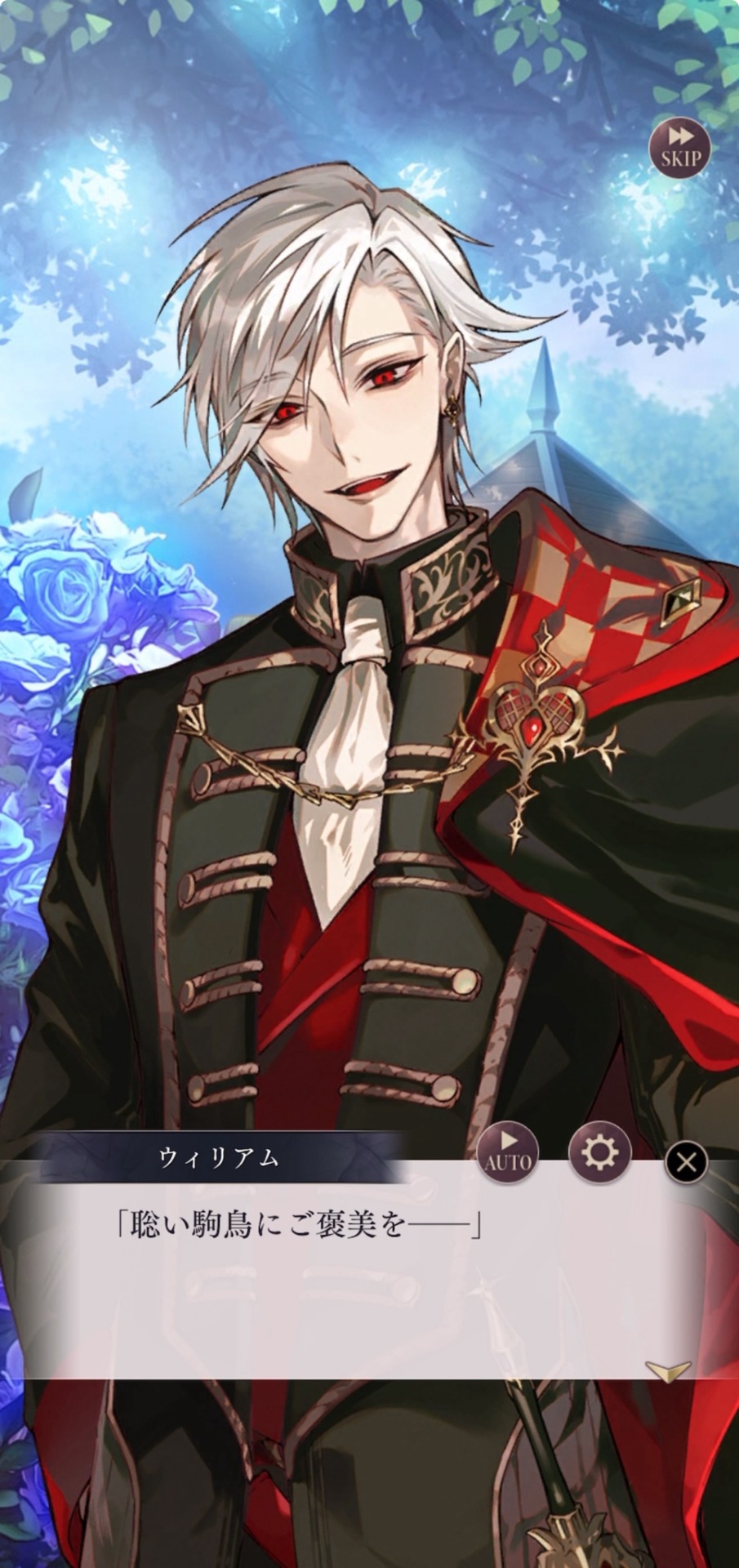
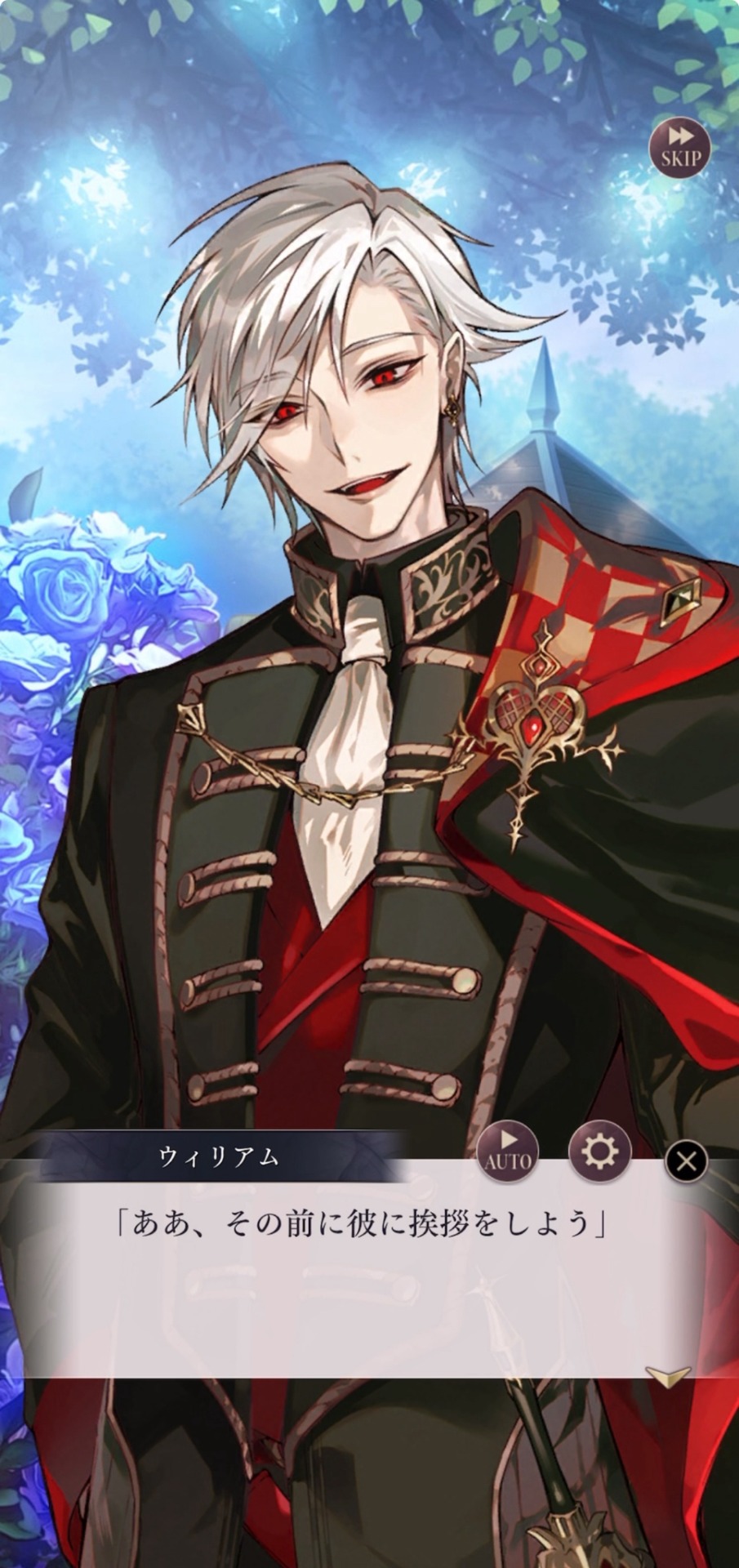
William: It is a reward for a very clever and discerning little robin——
W: Ahh, before that, though, let us extend our greetings to our guest here.
When I followed his gaze, there I saw Darius, who was walking toward us with a bright, innocent smile playing on his lips.
Darius: Hello there, Sir Rex. I’ve been eagerly awaiting an opportunity to be able to chat with you.
D: Ahh, and to the little miss fairytale keeper as well. Hello there.
Kate: Hi, Darius. Were you taking a stroll?
Darius: It’s such a good day out, it would be a shame if I stayed holed up in the castle, you see.
William: So, it would appear the castle is slightly too cramped for your tastes.
Darius: Whoops, you got me.
D: The higher-ups here in the castle are so stiff and formal, I could hardly take it. In fact, it was getting a bit hard to breathe, so I came here to escape, you see.
Kate: I see, then——
I was about to invite Darius as well, when I suddenly realized something.
(That’s right, Will was about to say something a couple minutes ago too. If this outing has anything to do with a mission...)
I probably shouldn’t be the one to decide that, so I turned toward Will, only to find him staring at me with an amused expression.
William: It is as you wish, Kate.
Kate: Thank you.
(As always, he seems to know exactly what I’m thinking.)
Darius: What’s this now? Will you let me join your merry group?
Kate: Darius, how about you join us in going to a street fair?
K: Since you have come a long way to England, it would make me happy if you ended up enjoying London.
Darius: Well that sounds very interesting. Perhaps I’ll take you up on your offer.
A smile blossomed on Darius’ face in an instant, and the sight made Will narrow his eyes in response.
William: Alright then, let us share a carriage then to the fair, the three of us. [1]
—— In a carriage ——
William: So the other day, we took down a crime syndicate that committed a great many thefts,
W: and that organization would have impoverished children steal in exchange for a generous reward.
W: We have taken the children who have been used by them under custody and are supporting them now, but that is not to say we were able to completely wipe all the traces out.
Darius: ——I imagine many of those children would stain their hands with crime once again in order to survive.
D: And what better place to do so than a street fair, which is teeming with people?
D: That’s why you are going to patrol around, and should you find any child who may have relations to that organization, you will take them into custody...
D: I wonder, did my guess hit the mark, Sir Rex?
William: Straight in the mark. I would expect no less from you, director.
Darius: I’m deeply honored by your kind words.
D: Even so, though, going out to find the children who had been targeted...
D: It’s a little reminiscent to Versteckspiel.
William: Indeed, it’s fine to see this as a game of hide and seek.
W: After all, since you are staying in England for a period of time, I would like for the director of Vogel to have fun in this fair.
Kate: The fairs here in England are really fun, so I myself enjoy them too. Ah, look, we’re almost there.
When we got off the carriage in front of the fair venue, Darius’ eyes lit up at the scene before him.
Darius: Wow, it’s so lively here. Ah, what are those wavy things?
Kate: Those are garlands the people have decorated the city with. They’re all handmade, so they come in many different shapes.
Darius: Ohh, then are those flags also garlands? They have such an interesting shape. And there are so many shops I don’t know where to even start.
D: They’re a tad different from the festivals over in Germany, but the excitement never changes for any festival.
Darius’ eyes wandered around everywhere with interest, and his frolicking had a very innocent air.
(I’m glad he’s having fun. Just seeing him makes me happy as well.)
William: It seems like he is having a good time.
Kate: Right? I’m glad I invited him. Ah, look, there’s a pie wagon coming!
William: Would you care for some berry pie, director?
Will and I went to buy enough pies for three people, offering one to Darius.
However, once he took the pie, he only stared down at it, not bothering to eat any of it.
William: Oh? It is considered bad manners to eat while you stand. Or perhaps…
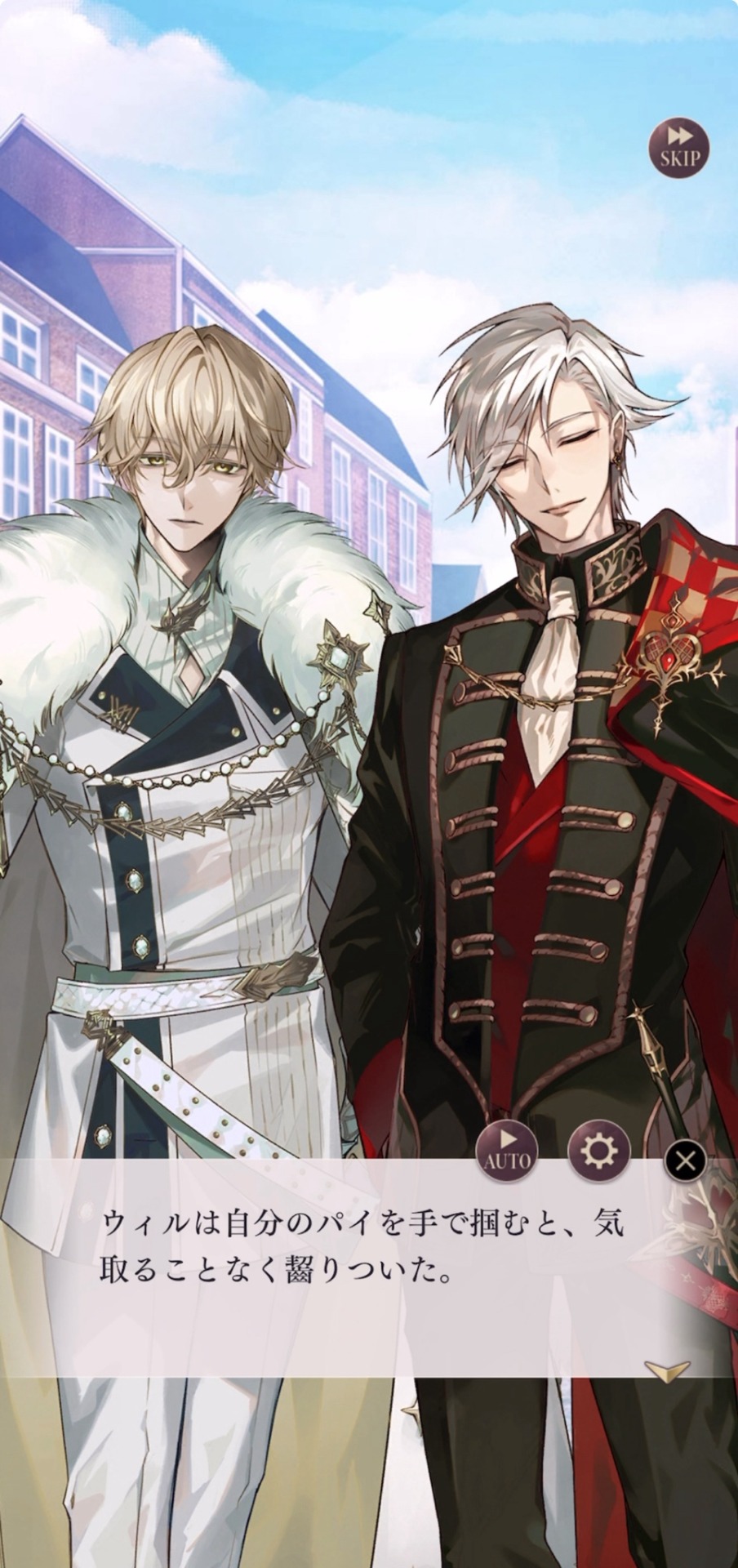
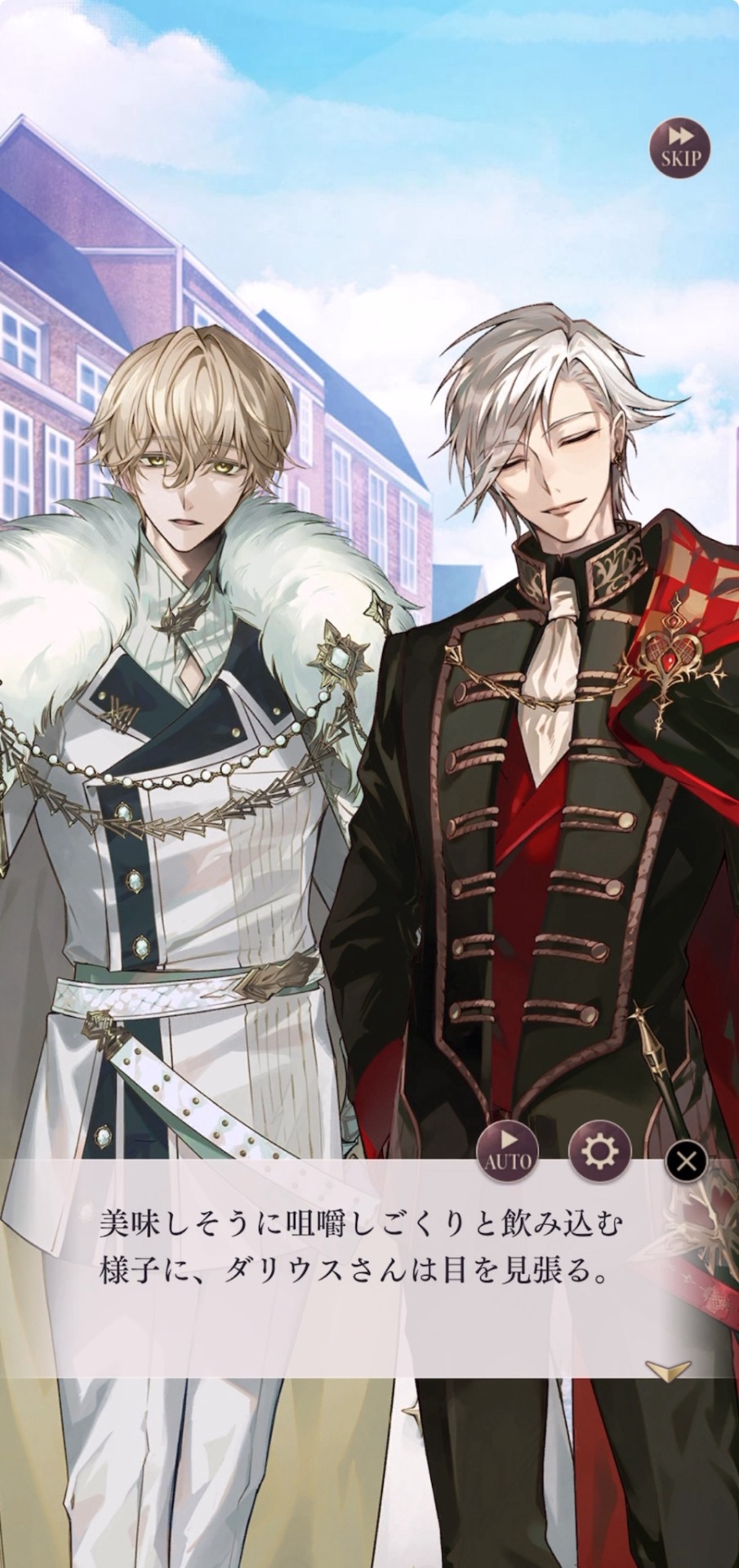
Without putting on any airs, Will grabbed his own portion and took a bite.
At the sight of him chewing and swallowing, seeming to enjoy the taste, Darius widened his eyes.
William: If you were worried that poison had been mixed in, let this be proof that it is a groundless worry.
Will wiped the berry sauce on the corner of his lips with his thumb, smiling as he met Darius’ gaze.
Darius: Ahaha, to think you would fulfill the role of a poison taster of your own volition… it’s almost wasted on you.
D: But, that is also groundless on your part.
D: I am actually quite good, you see, at eating with bad manners.
The next moment, he took a large bite out of the pie, stuffing his cheeks.
Kate: Oh, you’ve got cream all over your mouth.
Darius: Hmm? It’s fiiine. Here, why don’t you have some, too, miss fairytale keeper? It’s scrumptious.
Darius paid zero mind to the fact that cream was on his face,
and seeing him munching so happily——
I remembered how he had mentioned that the castle felt a bit cramped.
(So right now, I would like it if he can spread his wings out as far as he can.)
Seeing the two before me so casually eat away, naturally my cheeks started to relax.
With a liberating feeling, I also took a large bite out of my pie.
Kate: Mm! It’s really good!
(Ah, come to think of it…)
Kate: Darius, you mentioned that you like foods that are either hard to make or hard to obtain, right?
Darius: Huh?
Kate: Those types of things don’t seem to be around here, so I will try to find some again next time!
Darius: Oh wow, so you remember the things that others have said very well.
William: Our little robin here is one to take actions for others; it is one of her virtues.
W: This pie as well, I see you have chosen my favorite flavor.
Kate: Yes, as I don’t make a mistake when it comes to whatever you say tastes good.
Darius: Ah, you like strawberries, don’t you, Sir Rex?
William: Oh? How did you know?
Darius: Is it not natural to do some research on the people you want to get along with?
William: Ahaha, your ardent words are loving music to my ears, director.
W: Actually, I am in the midst of unraveling the mystery that is you.
Darius: Oh? You are?
William: Indeed, I have come to learn a variety of things about you in this short time we’ve spent together.
W: Such as how you so heartily eat pie, among other things.
Darius: Ahaha, you aren’t wrong about that.
William: If the little robin hadn’t invited the director on this outing, such would remain a mystery. So thank you, Kate.
Kate: If you would like to give thanks, it is better suited for the ‘coincidence’ of meeting Darius right before we left.
K: Besides, I feel the same. I would like to get to know you more, Darius.
When I turned toward Darius, his entire face was smiling.
Darius: So you would like to get along more with me, miss fairytale keeper. I’m delighted to hear.
D: Let’s play together and get along much, much more, okay? And Sir Rex as well.
William: You can call me William.
Darius: Then you can just call me Darius. And miss fairytale keeper, that goes for you too?
Kate: Huh, is it really alright for me to call you Darius as well?
Darius: Why, of course. There’s no need to get so caught up in formalities if we’re going to get along with each other, right? So call me Darius, okay?
Kate: Okay then, Darius. I’ll do that from now on!
Then, William extended a hand to Darius.
William: We welcome you to England.
Smiling, Darius exchanged a handshake with Will.
Darius: Thank you. I hope next time you’ll find a time to come visit us in Germany.
D: Of course, that goes for both Crown… and the little miss fairytale keeper.
—— Scene change ——
While enjoying the lively festivities in contrast to the everyday, we could hear a notably loud shout of joy.
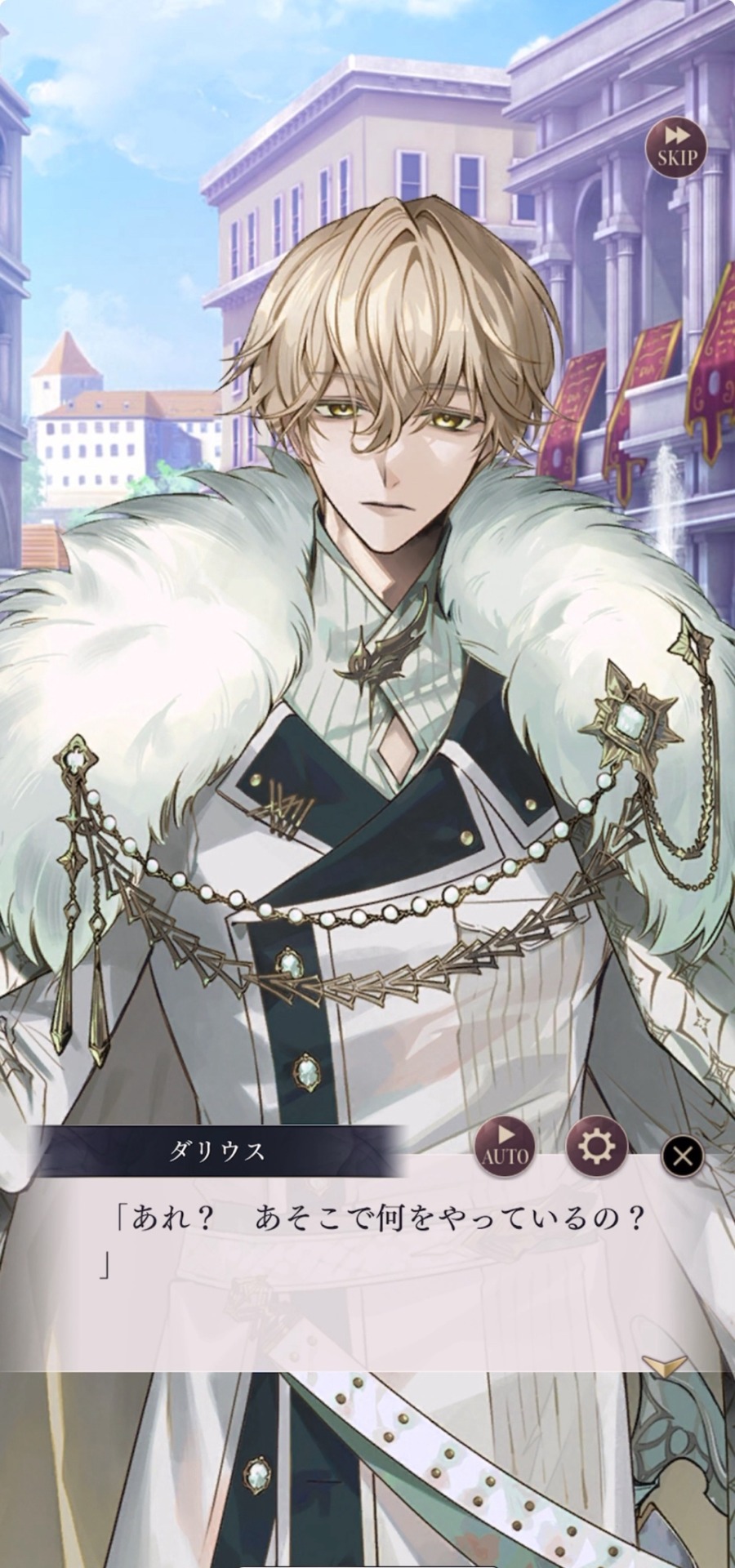
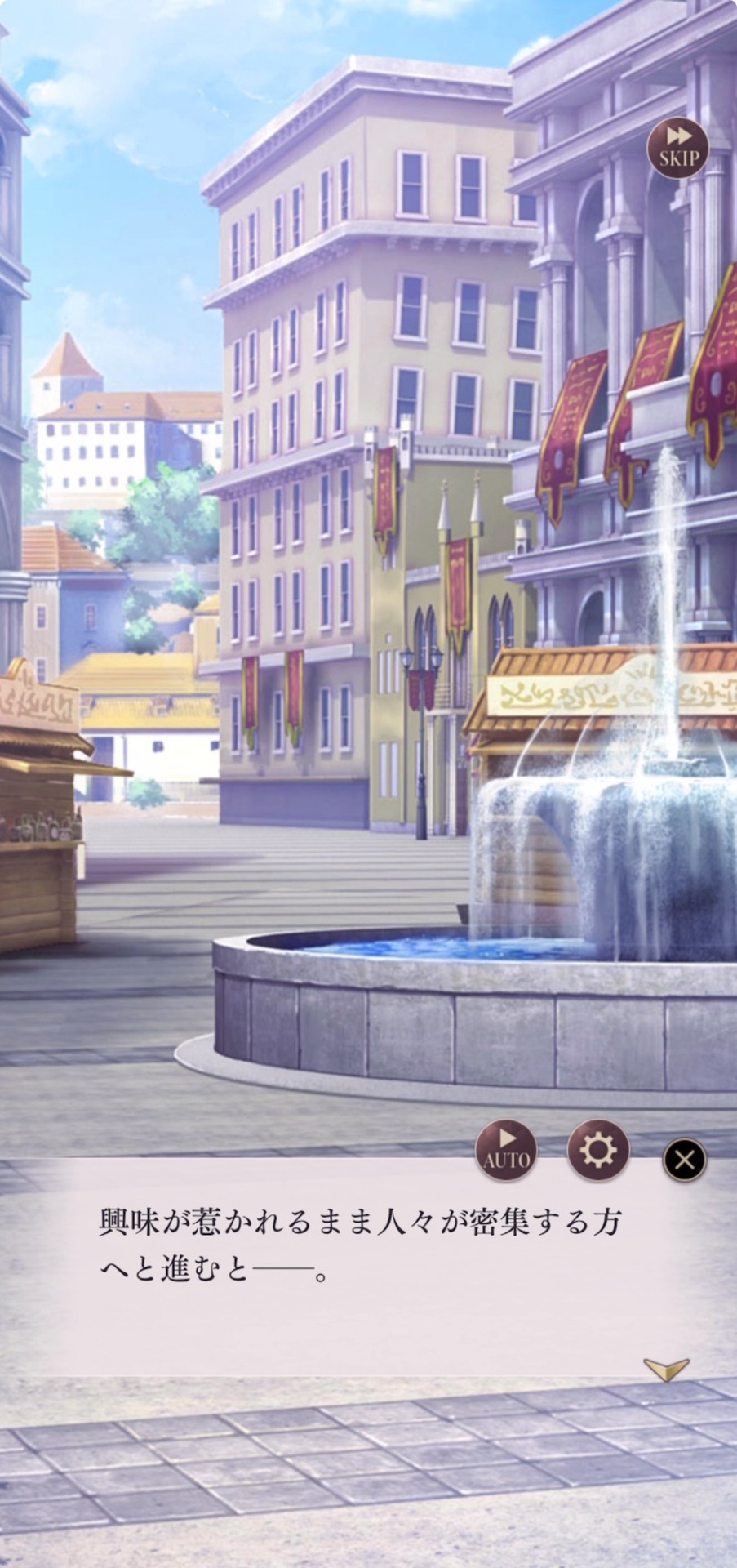
Darius: Hm? What are they all doing over there?
With our interests piqued, we headed toward the area where people were gathered, and——
Kate: Oh, they’re throwing horse shoes.
Darius: Ohh, it looks so fun. Now I want to try it.
William: Well then, I may participate as well.
Darius: Ah, then how about we have a match?
William: I don’t mind. I do imagine having a reward for the winner would make this match even more interesting as well, but…
Darius: Then how does miss fairytale keeper here sound for a reward?
to be continued…

will vs darius jude vs nica alfons vs ring
first next →

NOTES:
[1] Will says [ひとつ共有しておこう] (hitotsu kyouyū shite okō), which means “sharing one”... thing... in order to like stay as a three man group at the fair. I just assumed he meant a carriage, as the next scene takes place in a carriage, but I may be wrong here.

full masterlist 🌹🪽
#also yes#will legit has a line#where he blatantly flirts with dari#👍#ikemen villains#ikevil#イケメンヴィラン#ikevil william#ikevil william rex#william rex#ikemen villains william#ikevil darius#ikevil darius vogel#darius vogel#ikemen villains darius#cybird ikemen series#cybird ikemen#cybird otome#ikemen series#otome game#otome#ikevil translation#ikevil translations#div cr: cafekitsune and saradika
181 notes
·
View notes
Text

95k bonus . . . Liebe geht durch den Magen
꒰ ִ ֺ ⊹ @ notice ⊹ ֺ ִ ꒱ this translation may not be 100% accurate or contain creative liberties due to characterization or narrative flow purposes. if you enjoy, please consider reblogging, but don’t repost these or claim these as your own!
꒰ ִ ֺ ⊹ @ warning ⊹ ֺ ִ ꒱ none; it’s really just vogel being silly! hope you’re ready for the dari, nica, and ring galore, hehe.
Kate: A tea party with all of the members of Vogel…?
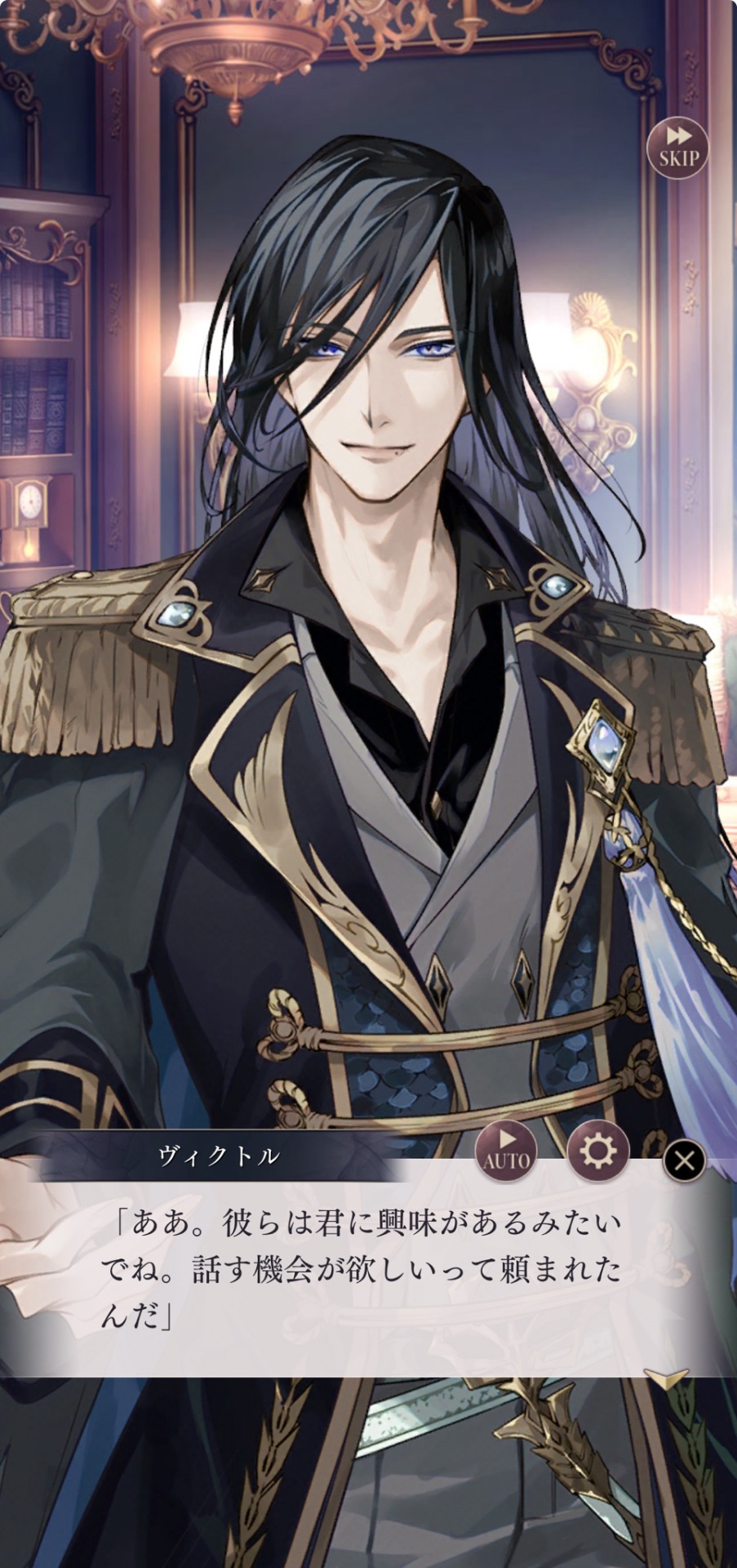
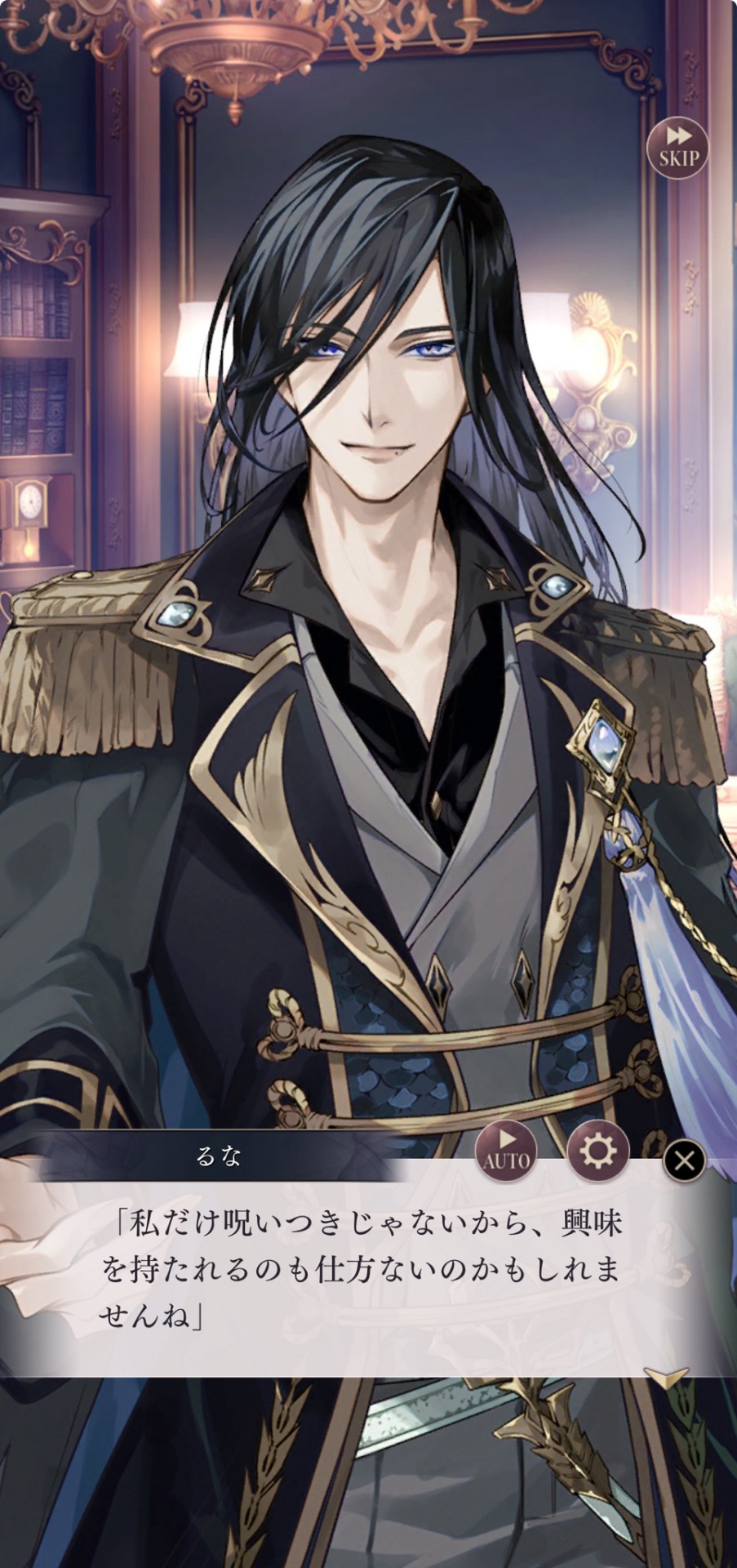
Victor: Mhm, it seems like all of them have taken an interest in you. So they asked for a chance to speak with you.
Kate: Well, seeing as I’m the only one who isn’t Cursed, I guess it makes sense they would hold an interest.
Victor: Indeed. …How would you like to answer? It’s completely up to you.
V: …However, both parties hold their own secrets.
V: And we do often take care of them, seeing as they are diplomatic guests.
V: Should there be anything making you anxious, or you feel even slightly you don’t want to do this, or anything of the sort, then you are always free to turn them dow—
Kate: …Victor. I will attend the tea party.
Victor: Wait, really? Are you sure?
Kate: Since they have come here to deepen relations between the organizations, turning down an opportunity like this wouldn’t leave a good impression, I’d imagine.
K: And besides, I would like to be of some use to you and Crown, for extending such hospitality to me.
When I expressed my honest feelings, Victor’s expression softened in turn.
Victor: I’m grateful for your honesty. Well then, it’s about time I give them a response.
V: Ahh, but… I’ll have Roger listen in from nearby, so if something happens you can just give a shout, okay?
V: No matter the time and place, I’ll come running.
After Victor’s words resonated in my heart, several days passed——
Darius: Thank you for accepting our invitation, miss fairytale keeper.
D: Did you perhaps prepare everything on this table?
Lined up on the table was filled to the brim with snacks, causing Darius to blink.
Kate: Victor and I prepared them. We were hoping it would be nice if you could eat these…
K: And that we can be on more friendly terms as we’re chatting like this.
Ring: You want to be on more friendly terms with the ones who might kill you? I don’t see the point?
Kate: …Gh.
Nica: Riiing, now don’t go saying gruesome things like that. You’ll bother the Spatzi.
N: So sorry about that? Ring is a Jungfrau [1] who tends to get a bit more nervous around cute girls.
Wearing an amiable smile as he faced me, Nika lifted the heavy air around us.
Kate: Jung…?
Ring: Y-you don’t have to ask what it is! …And also, it’s not like I’m nervous.
R: But, I won’t deny… that you are… cute…
He was simply cautious around me; it was not as though he was really doing me any harm for now.
…Even so, though, I myself had become ever so slightly anxious.
(The members of Vogel are also Cursed, if I recall, right…)
(If they had such intentions, they could easily take my life.)
The fear that I had first felt when I started working for Crown started to paint over my heart, when…
Darius: …Are you nervous, by any chance?
Donning a childlike innocence, Darius looked into my face.
Kate: Ah… umm…
Darius: Well, well… if we did possess a strong ability much like Sir Rex…
D: I wouldn’t blame you for feeling powerless even while simply conversing.
D: But you can relax around us. My ability will not kill you.
D: ——In fact, there is absolutely no way it will. Okay?
Nica: Oh, me and my brother’s abilities aren’t really harmful too.
N: That said, it can probably make you feel really good and maybe make you feel a bit fuzzy, but that’s actually a good thing, isn’t it?
Kate: R-right…
(Just what ability does that entail…?)
Although I still held my doubts, I knew that their abilities didn’t pose a danger to my life, which ebbed my fear.
Darius: Now then, now that you know we mean you no harm, how about we partake in these?
With Darius’ encouragement, Ring quickly reached out to a cake in front of him.
Ring: Mm…! This is really good.
Taking large bites, the cake was gone before I knew it, and Ring then reached out for another snack.
Nica: Geez, Ring, why are you just taking whatever’s in front of you? Pick the ones that especially look good.
While saying so, Nica reached for a baked pastry diagonal of him.
Nica: I recognize this shape. Isn’t this from the high-class bakery near the castle?
Kate: I’m surprised you know of it! That shop——
Nica: Mn… hm? It’s good, but did it really come from that shop?
Kate: Well, what I wanted to say was that shop’s pastry shapes were the inspiration for these homemade sweets.
That said, this time, Victor and I did make our rounds around a variety of bakeries, and put this together.
And I tried to make homemade pastries here at the castle that were freshly made or were hard to obtain.
Nica: They’re ‘homemade’? So they’re basically cheap foods, in which case I don’t want any.
Kate: Eh—
Nica: Here, Ring, say ‘ahh.’
Nica pushed his half eaten pastry into Ring’s mouth.
Ring: Mn… this is also really good…
When he was eating it, Nica said it was ‘good,’ but maybe he’s actually not good with homemade pastries…?
Darius: Hey, miss fairytale keeper, this is Baumkuchen [2], isn’t it?
This time, Darius called out to me while pulling on my sleeve.
Kate: That’s right. We figured since you’re here, we could prepare some German pastries… or that’s what Victor said.
Darius: Ho-oh…
Darius used a knife to lightly cut a slice before he carried it to my mouth.
Darius: Here, have a bite?
Kate: Mn… mmm, it’s really fluffy and delicious!
Darius: I’m glad to hear. Then it’s my turn.
With layers of the Baumkuchen spilling, Darius brought it to his mouth.
Darius: Mm, it’s delicious. …But, I take it it’s not something made in most of England. So where did you get this?
Kate: Actually, while I was racking my head on how to make Baumkuchen…
K: Victor made a gadget that could make it.
In order to make a delicious Baumkuchen by the tea party, I practiced baking it day in and day out.
…I feel that I can keep the fact that for some time the castle’s snacks consisted of nothing but Baumkuchen to myself.
Darius: He made a whole gadget just for this? Hmm… he’s quite strange, I’d say.
Kate: I can’t argue with that… but I’m sure it’s just that he was happy.
K: Happy that you guys, who are also Cursed, have come to England——or rather, to Crown.
Darius: …The pleasure is ours. I’m delighted at how warmly we’re treated here.
D: I do like the Baumkuchen, so do make it again sometime.
Kate: Alright!
I was so glad he liked it that I gave an immediate answer, but…
(Making it is quite time consuming and requires skill… but I’ll try my best.)
Nica: This topic’s all well and good, but what I really want to hear about the Spatzi [3] herself.
N: You know, like what fragrances you like, or which types of guys you fancy, that kind of thing… what about you, Ring?
Ring: Mngh…!? U-uhm…
R: ………M-maybe, like, which color of the sky she most likes?
Nica: The sophistication’s lacking, I see.
Ring: And what’s the problem with that?
Darius: I do agree with Nika here though. I would also like to get to know you better.
D: But simply asking would be a bore, so how about we play a guessing game?
Nica: So, Ratespiel? Now we’re talking.
Darius: Let’s make it so each person can make a single guess, and until then, we can continue asking questions…
D: Come play with us, why don’t you, miss fairytale keeper?
D: If possible… I would prefer you choose a topic that pertains to yourself.
Kate: Alright, then…
K: Out of the foods on this table, which one is my most favorite?
Darius: Hehe, that’s quite a charming topic? Then let’s start.
Nica: Sounds good to me, though I’d like to propose another twist.
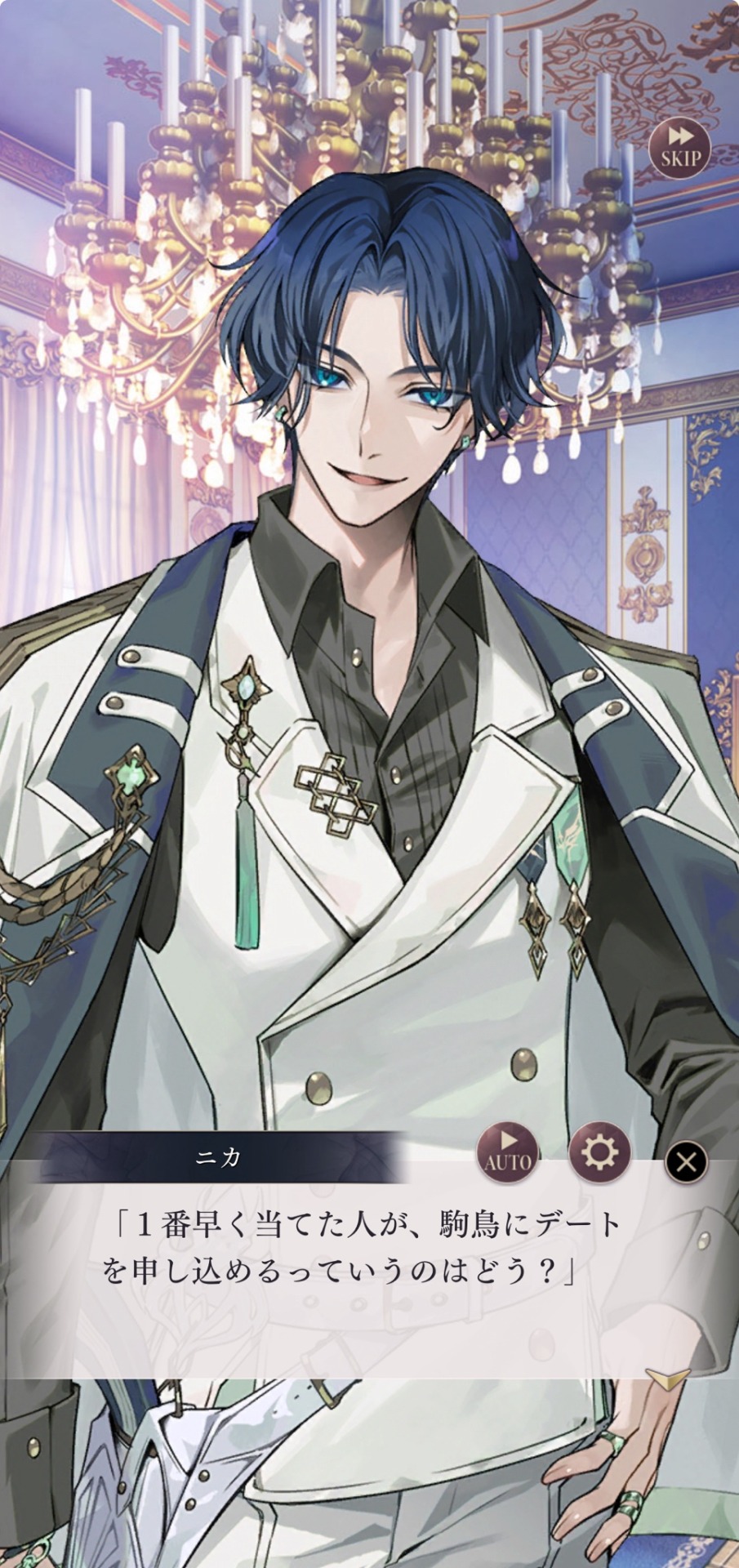
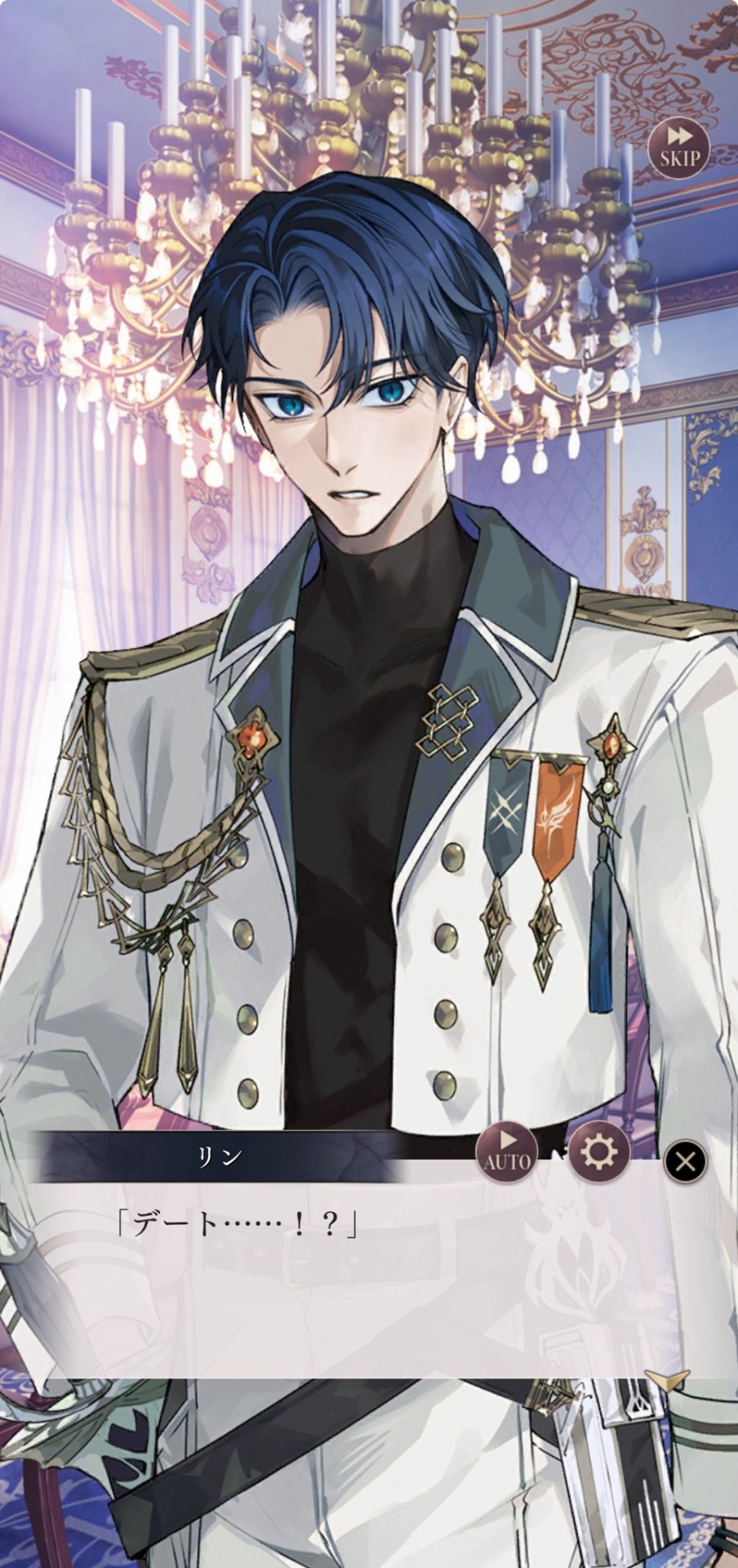
N: The first person to guess the correct answer will be able to ask the Spatzi out on a date. Well, how about it?
Ring: A date…!? [surprised]
Darius: You do make a good point. A competition does call for a prize of sorts… well, miss fairytale keeper? Are you fine with this?
Kate: U-um, I think a date may be a bit——
When I tried to speak up, though, the three of them looked at me, causing my breath to catch in my throat.
Ring was looking at me with a guarded look, as though he were a guard dog who could tear my neck apart with a single order.
Nica was looking at me with a scrutinizing look, as though he was thinking about how to play with a toy.
And Darius was wearing an amiable smile, but his eyes alone were sharp, like that of a predator aiming for its prey——
With the three of them looking at me in their own way, I couldn’t bring myself to disagree, feeling myself surrounded by a heavy air.
Darius: ‘I think a date may be a bit’ what was that now?
Kate: …Nope, never mind. That works for me.
Overwhelmed by the pressure, I could only nod, and Darius returned the gesture with an angelic smile.
Like a signal, the tense atmosphere became more lax.
Darius: Thank you. Then, let the game start.
With that, the tea party proceeded such that Darius, Nika, and Ring asked me questions.
While the discussion occasionally went off track, this peaceful time continued to pass by——
Ring: I got it!
The one who had his answer ready first was Ring.
Darius: A friendly reminder that you only have one chance. If you miss the mark, that will be the end… are you sure you would like to answer?
Ring: Don’t worry, I’m sure of this.
R: The answer is——that fruit before your eyes!
Kate: …Miss.
Ring: Wh…!? I-I see… so it was wrong…
Ring looked a bit despondent at my answer, and though he looked like a guard dog before, in an instant, he looked more like an abandoned puppy,
and I had to desperately fight the urge to say ‘actually, it’s a hit.’
Nica: …Hey, Ring. Mind if I say how you got to your answer?
Ring: ‘How I got to my answer’?
Nica: When you were about to grab that fruit, the Spatzi said ‘go ahead’ to you with a smile and put it on your plate,
N: and so you held a positive association with that fruit, leading you to your answer?
Ring: N-now that you mention it… that might’ve been the case… it was completely unconscious…
Darius: Ahaha, you’re so adorably honest, Ring.
Nica: Well then, it’s about time I guess too. The correct answer is… this chocolate.
N: It’s a bit on the mini side, and it looks cute too, and not to mention the packaging is also intricate. It practically oozes the traits a girl would like.
Kate: Miss.
Nica: Oops, too bad.
As opposed to Ring, who seemed down upon getting his guess wrong, Nika didn’t show any signs of caring, even if he did.
It was as though he knew from the beginning his answer was wrong.
Darius: I would prefer you make a serious guess, or this game will really end up in a bore.
Nica: But I thought long and hard about what girls would like and picked based on that?
N: Besides, this is where a subordinate hands the torch to the master.
Nika gave a smug wink, and Darius shrugged his shoulders in response.
Darius: It seems I bear a great responsibility now. If I’m unable to answer correctly, I’m afraid the little miss fairytale keeper——
D: And Crown as well would be disappointed in me.
Kate: Don’t worry, I won’t be disappointed even if you don’t answer correctly. It’s just a game, after all.
Darius: Hmm, so you believe I won’t get the answer right, is that it?
Kate: That…
(If I’m being completely honest, yes, I did think that.)
(Because the answer to this question is… a bit special.)
Darius: Hehe, seeing you have such low expectations of me makes me want to try my utmost hardest.
D: Alright, I have my answer.
D: I see you were trying not to eat this chocolate cake, right?
D: Because you like it, you saved it for last, I take it. So, my answer is that chocolate cake.
I was about to reply with an immediate ‘miss,’ when he opened his mouth before me.
Darius: …is what a normal person would say, but that would be incorrect.
Kate: Eh…
Darius: The answer to your question is——-
D: ‘Everything here on the table.’
Kate: …That’s a hit.
Ring: A-all of it…!? Is that answer even possible?
Nica: Well, we never established that the said thing had to just be a single thing, so yeah, it’s fully possible.
N: But even so, way to bend the rules there, Spatzi. I didn’t think you had it in you.
N: …You really are an interesting one, aren’t you.
Darius: I did think it was a strange answer, but considering the little miss fairytale keeper’s character, it wasn’t too difficult.
D: Perhaps you thought something like, ‘If I’m preparing something for guests, I would choose the things I believe are the most delicious’… am I right?
Kate: It is as you say…
While consulting with Victor, I chose all of the pastries here.
So, that’s why if I were to choose my most favorite among these, the answer would naturally be ‘everything.’
Kate: It was a bit of an underhanded answer, so I didn’t think you would get it.
Darius: Hehe, but I did. Oh, but, I don’t think it’s underhanded.
D: After all, I take it you thought up of such an answer so that you didn’t have to assign winners and losers, yes?
Kate: Yes, there was also that. Since it was such a fun tea party, I didn’t want to label anyone as winners and losers…
Darius: To see you try to put us on an equal footing without assigning a winner…
D: You truly are sweet to the point it’s cloying… and kind as well.
Ring: B-by the way… will Darius ask her out? O-on a date, that is…!
Darius: Ahh, that nearly slipped my mind. Well, miss fairytale keeper, will you go out on a date with me next time?
Kate: …I will.
I didn’t have much reason to turn him down, and now that I got to talk with them like this, I started to become more interested in the members of Vogel.
(…And going out together with them seems pretty fun too.)
Nica: Okay, then, when you’re done with your date with Dari, let me know, okay? We can plan a date of our own then.
Kate: Eh—
Nica: The prize for the game was the right to ask you out on a date, but there’s no need to hinge something like that on a game, right?
N: Besides, if the answer to the question is ‘everything on the table,’ that would technically make my answer right, too, yeah?
Kate: I… guess so…?
Nica: And you caught my interest too anyway…
N: …Ah, that’s right. Since we’re talking about this, why don’t you invite the Spatzi on a date too, Ring?
Ring: O-on a date…!? I… I’ll pass.
R: …But when you go on your date with Nica and Darius, I’ll tag along behind you guys.
Nica: Wait, why though?
Ring: If she’s around, you’ll let your guards down and lose sight of your surroundings, right?
R: So I’ll cover those bases during your date.
Nica: Ehh…
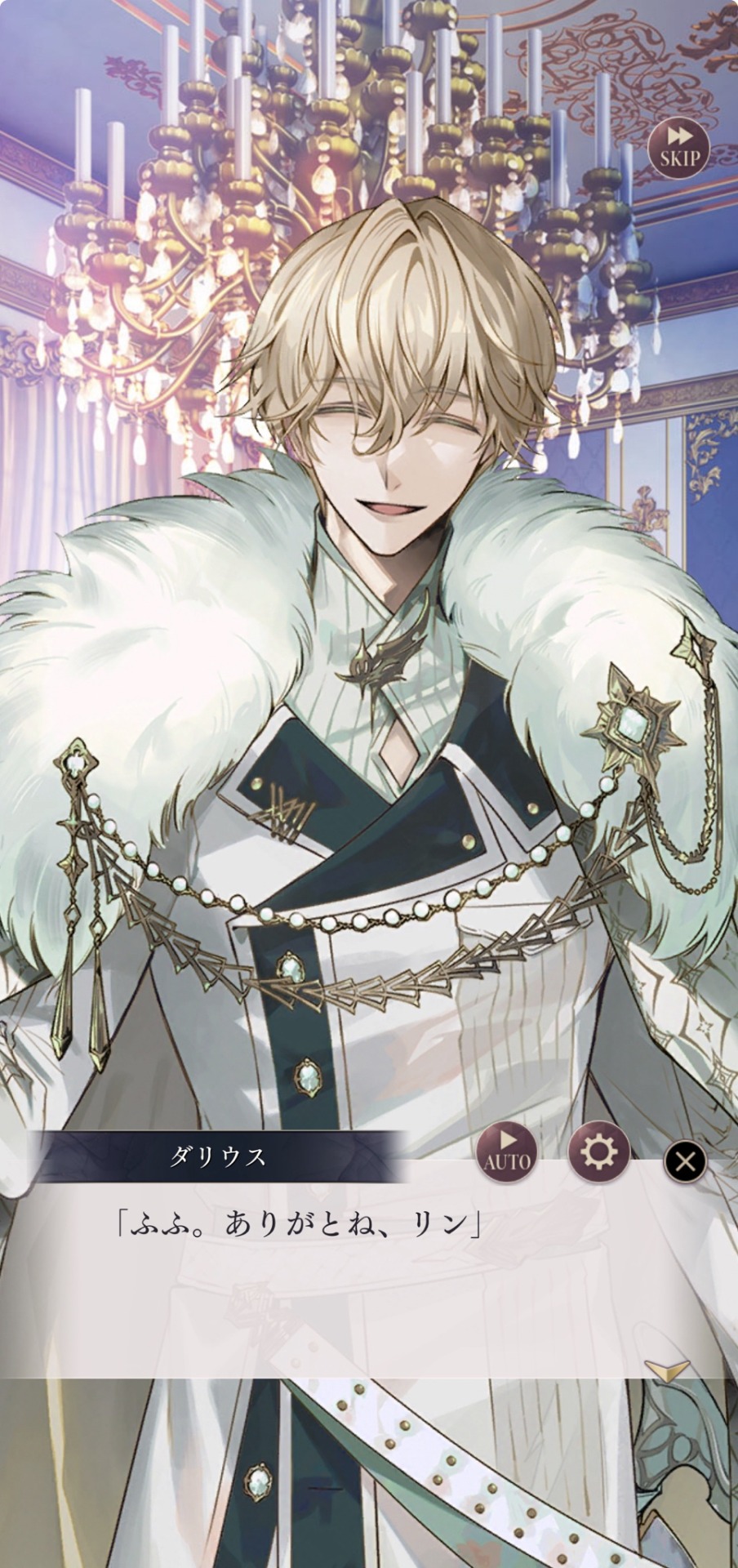
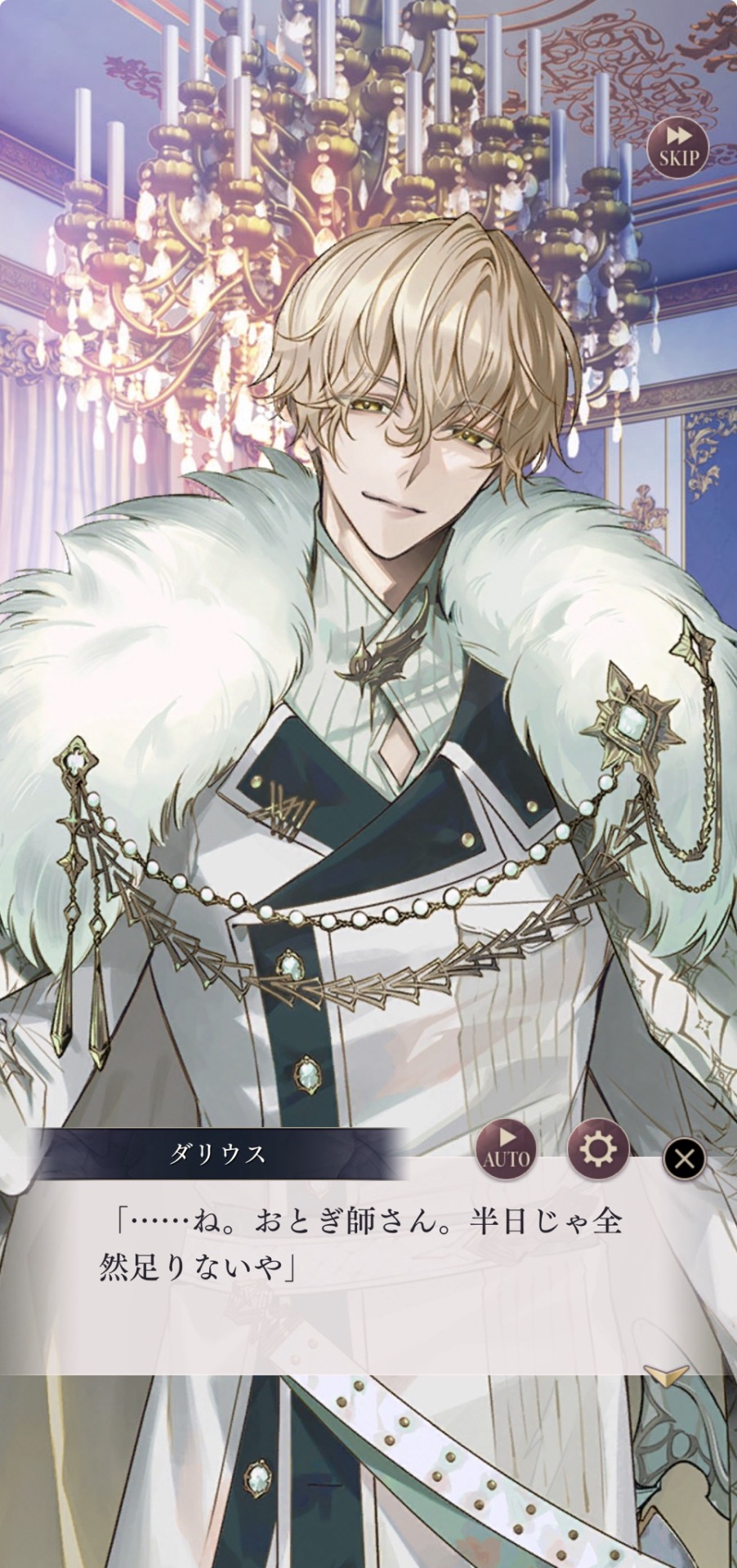
Darius: Hehe, thank you, Ring.
D: …Hey, miss fairytale keeper. I must say that half a day isn’t nearly enough.
D: Why don’t we take our sweet time chatting on our date, the two of us?
A smile played on Darius’ lips, and I couldn’t look away from his honey-colored eyes.
Just then, I remembered Victor’s words from before I went out.
—— Flashback ——
Victor: Ahh, that’s right, Kate. There’s one thing I should say.
V: If you wish to return to your normal everyday life after this month passes… you mustn’t let your heart get stolen by them.
—— End flashback ——
(It’ll be alright… I think I was able to enjoy this time today when I tried talking to them.)
(This feeling won’t blossom into love. Surely…)
Fin.

will vs darius jude vs nica alfons vs ring

NOTES:
[0] according to our handy google translate, the title of this story, Liebe geht durch den Magen, translates to “love goes through the stomach.” I assume this may reference or be the equivalent to a similar English saying, “the way to one’s heart is through their stomach.”
[1] “virgin” in German nhdkshfds
[2] and here we have a quote from Wikipedia: Baumkuchen is a kind of spit cake from German cuisine. It is also a popular dessert in Japan. The characteristic rings that appear in its slices resemble tree rings, and give the cake its German name, Baumkuchen, which literally translates to “tree cake” or “log cake”.
[3] originally, I had Rotkehlchen, which is like the literal translation for “robin” as far as I know. Spatzi means “sparrow,” but can be used as a term of endearment in the same way the Crown members call Kate “robin” out of endearment. In his collection story event, he mentions that the word he used is German for robin, but it could be localized to something like “it is a German-equivalent term of endearment for robin.” Thanks to @.citrusmornings for providing this link!
END NOTES: did you enjoy this story? because i know i did, haha. i really enjoy all the vogel characters so far; they all have interesting personalities, and they bounce off each other in a fun way as well.
honestly, i’m still trying to sort of get an idea of how i want to sort of translate and write these characters. overall, though, i tried to give darius a more innocent air, with some hints of his nobility, while also having a strong sort of presence. and i tried to capture nica’s sort of casual and flippant (but also clever and sharp) air, which contrasts with how ring gets shy and flustered pretty easily.
i’d love to hear your thoughts!

full masterlist 🕊️
#ikemen villains#ikevil#イケメンヴィラン#ikevil vogel#ikevil darius#ikevil darius vogel#darius vogel#ikemen villains darius#ikevil nika#ikevil nica#ikevil nika schwarz#nika schwarz#nica schwartz#ikevil ring#ikevil ring schwarz#ring schwarz#ring schwartz#cybird ikemen series#cybird ikemen#cybird otome#ikemen series#otome game#otome#ikevil translation#ikevil translations#div cr cafekitsune#div cr saradika
270 notes
·
View notes
Text
what Vogel members think of each other…
꒰ ִ ֺ ⊹ @ notice ⊹ ֺ ִ ꒱ this translation may not be 100% accurate or contain creative liberties due to characterization purposes. if you enjoy, please consider reblogging, but please don’t repost these or claim these as your own!
೯⠀⁺ ⠀ 𖥻 darius vogel 🪽 ⠀ᰋ
꒰ nica . ꒱ here, dari is the king. yep, that’s right — both his face and disposition is just like that of an angel. as for his inner self, though… why not see for yourself up close, as a test of courage?
꒰ ring . ꒱ dari is not only our king, but also our savior. that’s why, i would do anything he asks of me… even if that means something like killing someone else.
೯⠀⁺ ⠀ 𖥻 nica schwartz 🍒 ⠀ᰋ
꒰ darius . ꒱ nica is truly an outstanding person; he is as tenacious as he is clever, and not to mention quite calculating, too — a most suitable member of my family, indeed. despite all appearances, he does have an endearing side to him as well. do get along with him, will you?
꒰ ring . ꒱ nica’s my older twin. he’s bright and smart too… and he has a lot of things that i lack. i wouldn’t forgive anyone who tries to hurt him.
೯⠀⁺ ⠀ 𖥻 ring schwartz 💍 ⠀ᰋ
꒰ darius . ꒱ he is very much like a younger brother in my family; he is quite obedient and faithful, considerate and blindly devoted… and i am quite fond of his large appetite as well! for whatever i dislike, he eats for me, you see.
꒰ nica . ꒱ ring is my very, very adorable younger twin. until we draw our last breath, we will be together, forever. after all, that’s what we promised to each other.

˚˖𓍢ִ໋🦢˚ cv, shigematsu chiharu, kakihara tetsuya, tanabe kousuke ┊ darius. nica. ring. ╱ 𐙚 interested in vogel? @char_cards @cast_impression @line_voice💍
#ikemen villains#ikevil#イケメンヴィラン#ikevil darius#ikevil darius vogel#darius vogel#ikemen villains darius#ikevil nika#ikevil nika schwarz#ikevil nica#nika schwarz#ikevil ring#ikevil ring schwarz#ring schwarz#ikevil vogel#cybird ikemen#cybird ikemen series#cybird otome#ikemen series#otome game#otome#ikevil translation#ikevil translations#divider by cafekitsune
258 notes
·
View notes
Text

william v.s. darius . . . darius vogel END 🪽
— this translation may not be 100% accurate or contain creative liberties due to characterization or narrative flow purposes. if you enjoy, please consider reblogging, but don’t repost these or claim these as your own!
— cw: none, but you’ll definitely find out a thing or two about darius here.
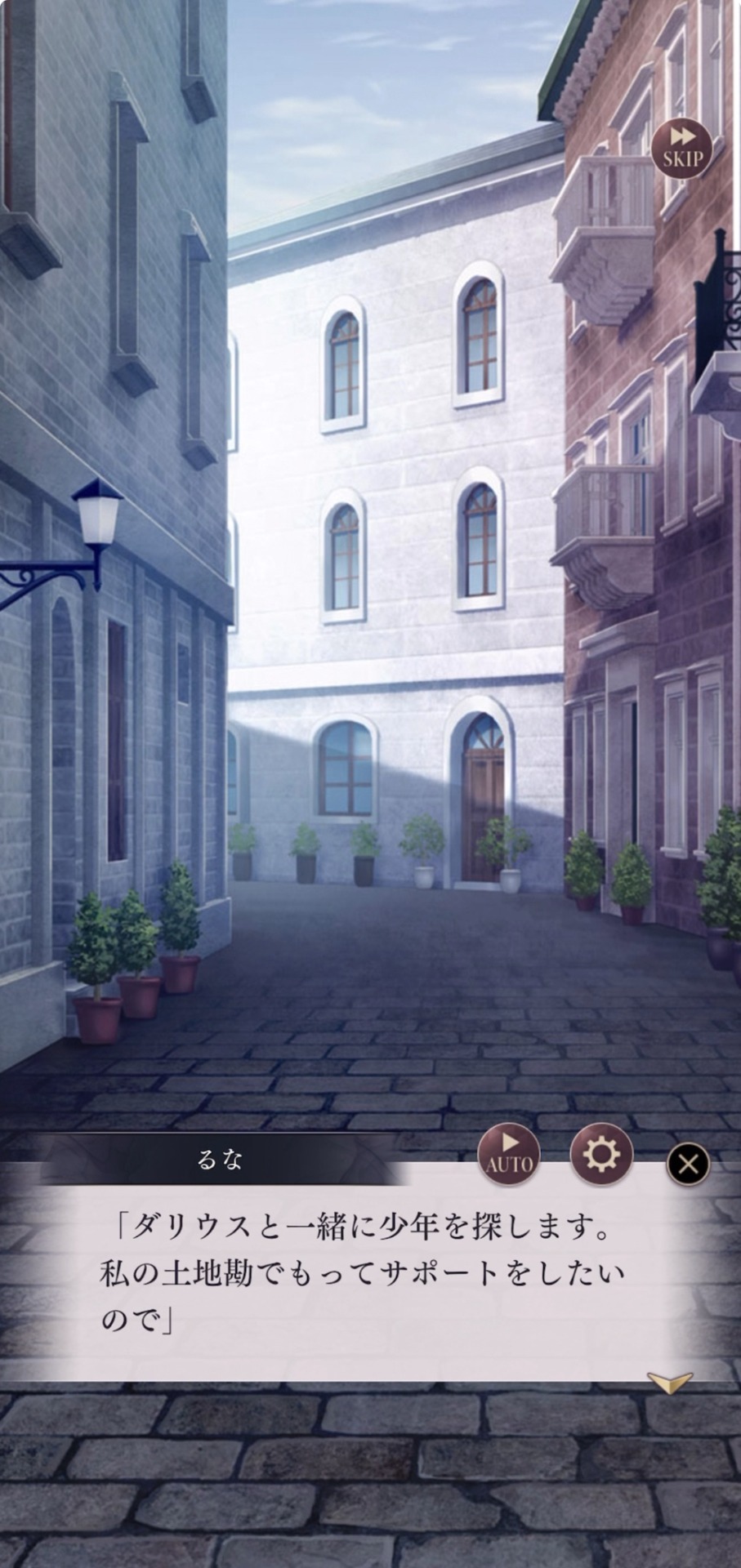
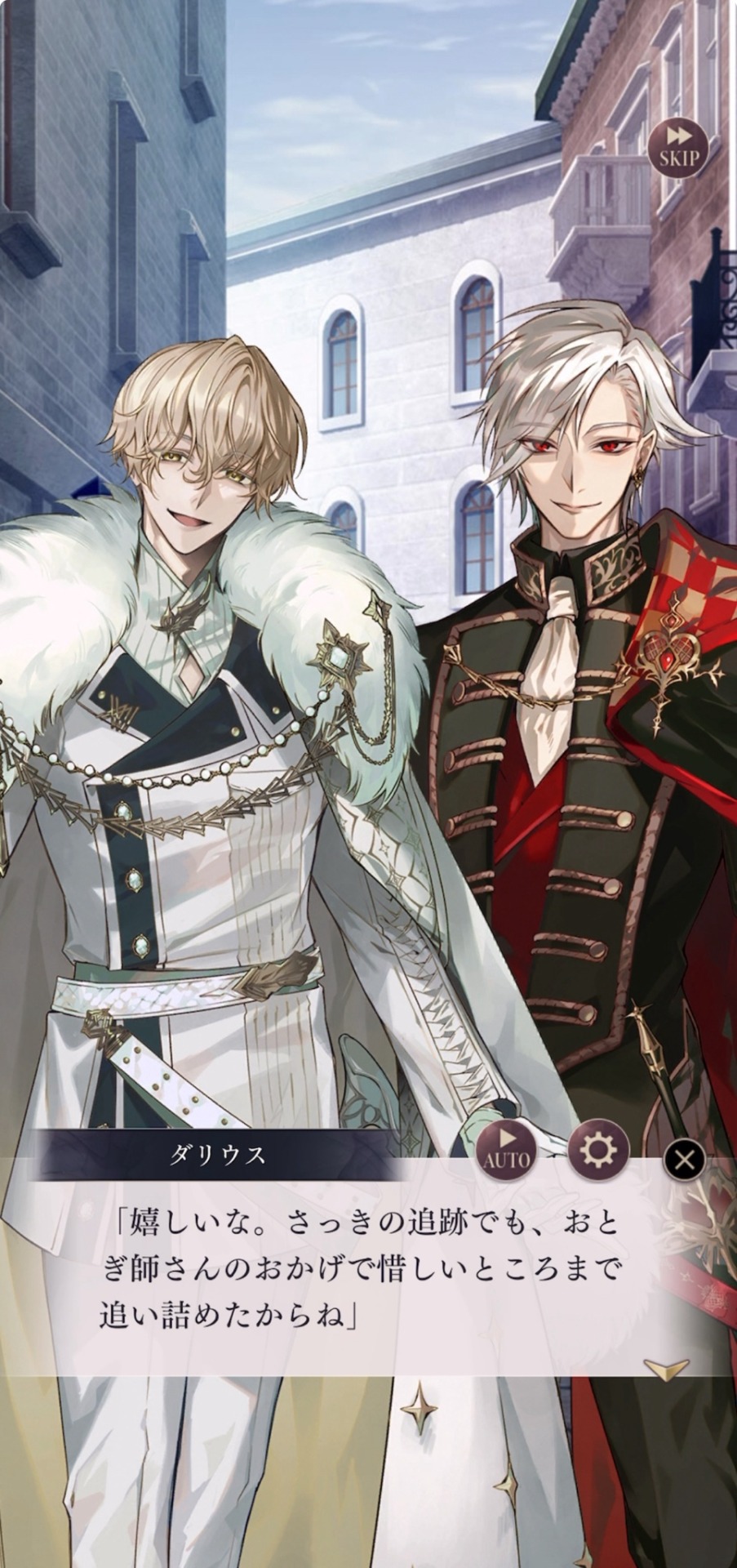
Kate: I’ll go with Darius to find the boy. I would like to support him as someone who’s familiar with the streets here.
Darius: That makes me happy to hear. It was also because of you that we were so close to catching him too.
William: Indeed. I’m sure you will find it heartening to have the little robin accompany you to assist with the streets around here.
W: Kate.
W: You are one to jump to the fray for others, but you are also a clever little robin who never forgets about us and returns to her nest.
W: I am confident you won’t get lost on your way.
I stared back at the eyes fixed straight on me.
Kate: Alright, leave it to me.
(I will cooperate with Darius, as Crown’s fairytale keeper.)
Darius: You’re a reliable one, aren’t you. Well then, let’s venture down these streets, miss fairytale keeper.
After running the streets for a little while——
Darius: Oh? What’s this?
Darius pointed to something ahead of him, where on the stone pavement, it looked like some pebbles were all in one place.
It was an unnatural sight, to be sure, so we stopped to scrutinize it.
Kate: Are these... plum seeds?
Darius: From that box he flipped over, I take it.
Kate: Oh, then maybe it’s a trace that boy left behind after eating them?
Darius: Likely so. See, look over there, there are some more scattered over there.
Darius was looking toward a place ahead of us, but...
Kate: Umm... I’m really sorry, but I can’t see that far...
Darius: Ahh, is that so? I happen to have extremely good eyes. Oh, and a good sense of smell, too.
Kate: Oh, wow! I’m pretty jealous.
Darius: Mhm, it’s really convenient.
With an innocent smile on his lips, he looked at me with those honey-colored eyes,
and for some odd reason, I felt that those very eyes were looking down from above, in a place somewhere far off.
(...Is it because he said his eyes were good? No, I feel like there’s something more to it.)
Darius: Ah, I spot some pie crumbs. On the miss fairytale keeper’s cheeks.
Kate: Huh?
Darius: Hehe, over here.
He reached toward me,
and his gloved hands wiped it off.
Kate: T-thank you very much...
(Ack, that’s so embarrassing...! Does that mean it has always been on my cheeks?)
I felt my cheeks turning redder and redder, but I couldn’t move until Darius withdrew his fingers from me.
Darius: This path might have been the correct one.
When we hurried on——
I spotted a small back enter through a hidden entrance in the back road.
Darius: That’s him.
Kate: That road’s exit leads back here after a while.
K: If it’s alright, could you head to the exit up ahead and cover the path there?
K: I’ll go in to directly chase after him to drive him to the exit.
Darius: So I see. We’re using the pincer movement here, yes?
Trying to keep as quiet as possible, I moved with quick steps.
When I did, eventually I could hear another set of footsteps.
(...There he is.)
Up ahead was a place where sunlight couldn’t filter through, and up ahead I spotted the small back of that boy.
Slightly dirty boy: !!
The boy, having sensed my presence, turned back, and surprised, he ran off.
I, too, ran after him, closing the distance between him and the exit.
And in the path the boy was taking, it was as though an angel’s wings had spread——
Darius’ coat fluttered, blocking the way.
Darius: Would you not say it’s about a good time to accept your defeat?
Slightly dirty boy: F-for what!? Because I sure don’t know...
Darius: You nabbed her things, did you not?
Slightly dirty boy: Grk, I-I don’t remember stealing anything!
Darius: But I do. I saw you bump into her before putting your hand in her skirt pocket.
Slightly dirty boy: ...!
Darius: Oh, that’s not all either. You also stole some plums in the midst of a small scuffle and ate them. The scent of fruit juice is quite strong off you.
D: But even without the smell, there are stains near your mouth and on your sleeves. One look is all one needs to know.
Slightly dirty boy: Urgh...
In a panic, the boy rubbed his sleeve.
Darius: And thanks to that, you left quite a big trace of your trail behind.
D: But, if you were going to leave anything, you could have been more clever about it. [1]
Slightly dirty boy: ...
The boy hung his head, balling his hands into fists in frustration.
Kate: ...Hey, can I ask why you’re doing these things?
Slightly dirty boy: ...And what could you do if I told you?
Slightly dirty boy: You know too, don’t you? A brat like me can do nothing but steal if I wanna survive.
Slightly dirty boy: All you rich guys fill your pockets with too much stuff.
Slightly dirty boy: So what’s the big deal in giving a little of that away!? I don’t got a home or anyone to call family!
Darius: ...Hmm.

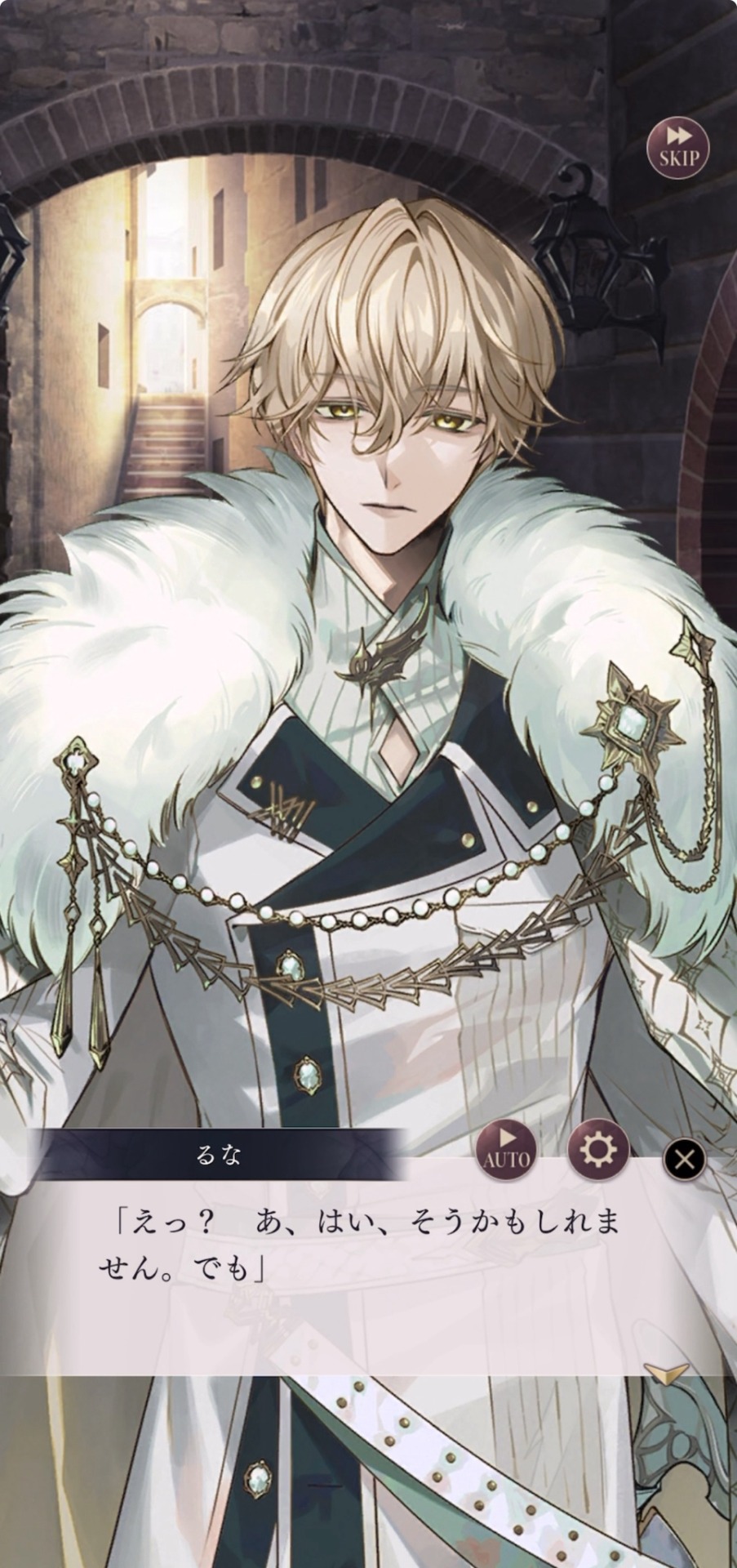
D: Hey, miss fairytale keeper. I do doubt this boy has any relation to the organization.
Kate: Hm? Ah, yes, that may be the case. But still.
(I can’t simply overlook this.)
Slightly dirty boy: Organization?
Darius: Ahh, no need to worry your pretty head over it. We were talking to ourselves.
D: But anyway, would you be so kind as to give back her things?
Slightly dirty boy: ...Finders keepers. It’s mine now.
Darius: Oh, do you need me to spell it out? You did not find it; you stole it.
D: So that’s why, let’s return the things to their rightful owner, okay?
Slightly dirty boy: Urgh...
Darius was wearing a bright smile on his face, as if he were erasing the boy’s will to talk back.
Slightly dirty boy: ...Okay, fine.
He reluctantly reached into his pocket, taking out what was in it, before he curtly placed them in both my hands, which were outstretched.
Darius: Alright, that’s enough. Care to leave now?
Kate: Eh?
Darius: Isn’t it great, miss fairytale keeper? You got your things back, safe and sound.
Kate: I-I mean, yes, it is great, but also...
Slightly dirty boy: ...
As though currently assessing the situation, the boy stepped back before dashing off as fast as he could.
Kate: Ah, wait...!
Darius: What is it? Did the boy not give everything back?
Kate: It’s just I don’t think it would do him any good if we should just let him go like that.
K: He is already used to stealing, so he may end up doing so again. Especially if it’s to survive.
Darius blinked at my words,
before he let out a sigh.
Darius: A reward for the good child, and a punishment for the bad one... so you say, but is there really anything we can do for him?
Kate: ...Huh?
Darius: It’s hardly as though there’s only one or two children in the world in a similar situation as him.
D: See, even William is going through so much trouble to find all the children who may have relations to a crime syndicate.
D: ——That’s why I was thinking we may as well turn this into a world where no such children exist.
D: Don’t you think such a world is not just a dream, with the Cursed ones’ abilities?
The smile on his face seemed to sparkle as he made such a statement as though he were singing it praises.
(Could it be Darius wishes for a world... where there’s no poverty or hunger?)
(But, for some reason...)
It stirred a familiar sense of unease in me.
Darius was a friendly person who wore a bright smile, and he almost had a childlike air about him.
But in the most unexpected times, the space that fell between us seemed to widen so much, I could hardly jump over it.
It felt like, even if we were looking at the same thing, his perspective and thoughts would come from such a different place and direction.
Almost as though——I had come into contact with a different ‘living being’ altogether.
Darius: Ah, speaking of, what are those in your hand?
Kate: Hm?
Darius’ sweet voice pulled me out of my own thoughts.
Darius: Just what did he steal from you, I wonder?
He was looking down at what was in my hand, his smile filled with excitement and interest.
Kate: Oh——here, this is for you, Darius.
I took out a handmade white leopard plush from the things.
Kate: The moment I met eyes with this plushie at the wagon, I thought, ‘I really want to give this to Darius!’ to myself, so.
Darius stared intently at the white leopard plushie, which laid on the palm of his hand.
Darius: .........
Kate: Doesn’t it look a bit like you, Darius? With its white coat and those pretty, honey-colored eyes. It even has a similar shape.
K: So, maybe that’s why I really wanted to gift you this.
(But, I feel like there’s something more as well... I feel as though I could reach a deeper place...)
The space that fell between us seemed to widen so much, I could hardly jump over it——
I realized that such was an unconscious feeling, and I may have also felt that I would like to jump over to the other side.
Kate: And besides, isn’t it adorable? See, it looks pretty lethargic.
Darius: .........
D: ...hehe, you have quite a sense... pfft, hehe.
(Hm? For some reason I feel like I’m being laughed at for something different...)
Darius: ——Miss fairytale keeper...
D: Could it be you wanted to make me smile?
Kate: ...Ah.
I felt taken aback when he asked me so straightforwardly.
(But, he is probably onto something.)
Perhaps my own feelings were more simple than I had thought.
Kate: Well, yes, if I could make you smile, that would make me happy as well.
Darius: Really now? If a smile is enough to make you happy, I’d be more than happy to give you however many you’d like, miss fairytale keeper.
D: ——See, like this.
Darius’ head slightly tilted, he gave me an innocent smile.
His platinum blond hair, hardly fitting in with the surrounding back street, swayed,
as it glistened in the few rays of sunlight that filtered through.
The specks of light also seemed to reflect in those honey-colored eyes, leaving me enraptured, unable to look away.
And this very expression before me was, out of all the smiles I had seen on him the entire day today, the most perfect of them all... almost too much so to be true.
(Oh, I see, this must also have been one of the reasons why I had felt a sense of unease.)
(Because Darius had never been smiling from the bottom of his heart.)
Kate: Darius, I... I want to see you smile, from your heart.
Darius: Oh my, could it be you thought my smile was all a fabrication?
Kate: That is, um...
Darius: The fact you couldn’t answer back means I hit the mark, right? How mean, though, thinking other’s smiles are fabricated and all.
D: But, well, if that’s the case...
Kate: Ah—
No sooner did Darius take my hand than he ran back from where we came.
His coat fluttered behind him, his platinum blond locks that resembled a cat’s fur bounced with his steps, and I felt myself wrapped in his relaxing scent.
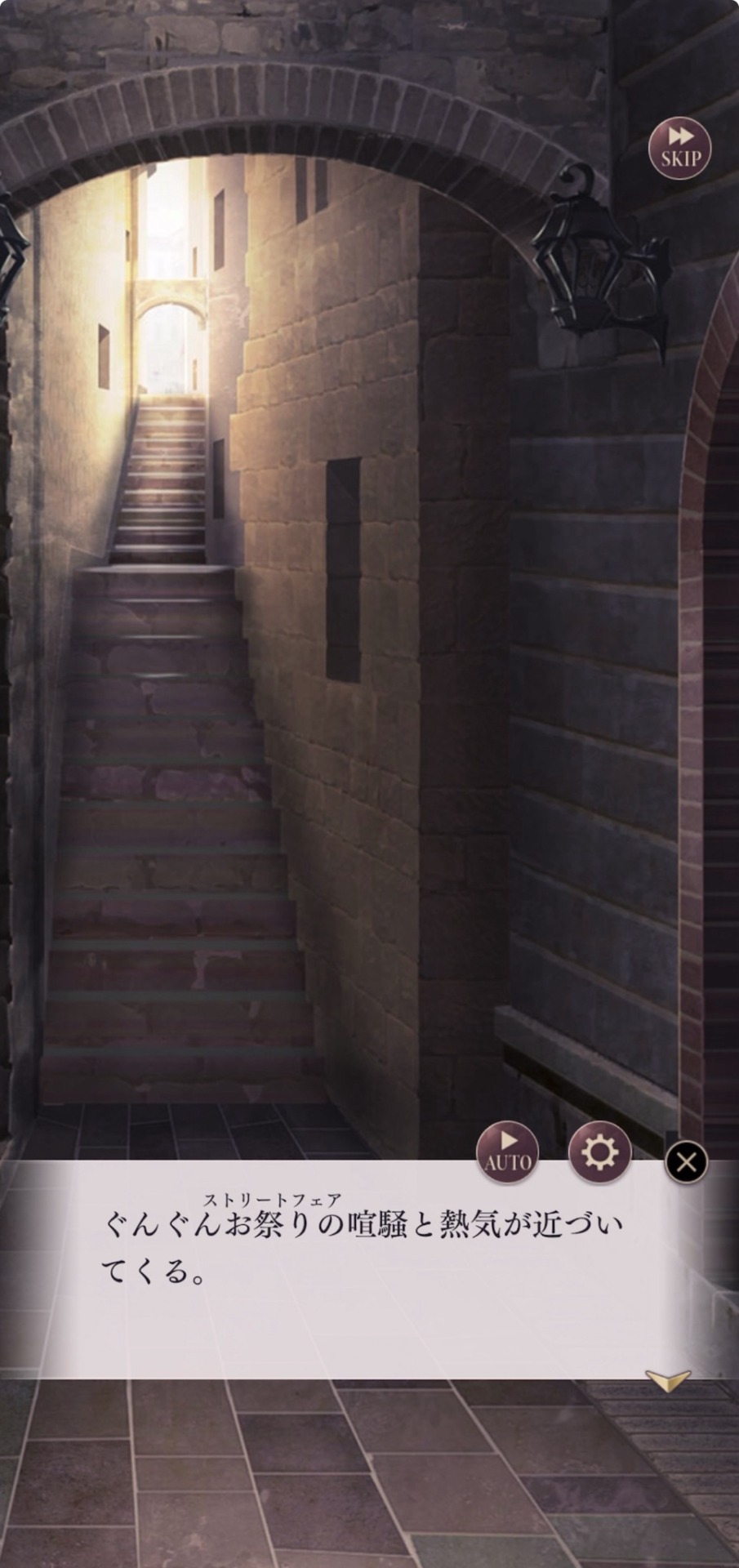
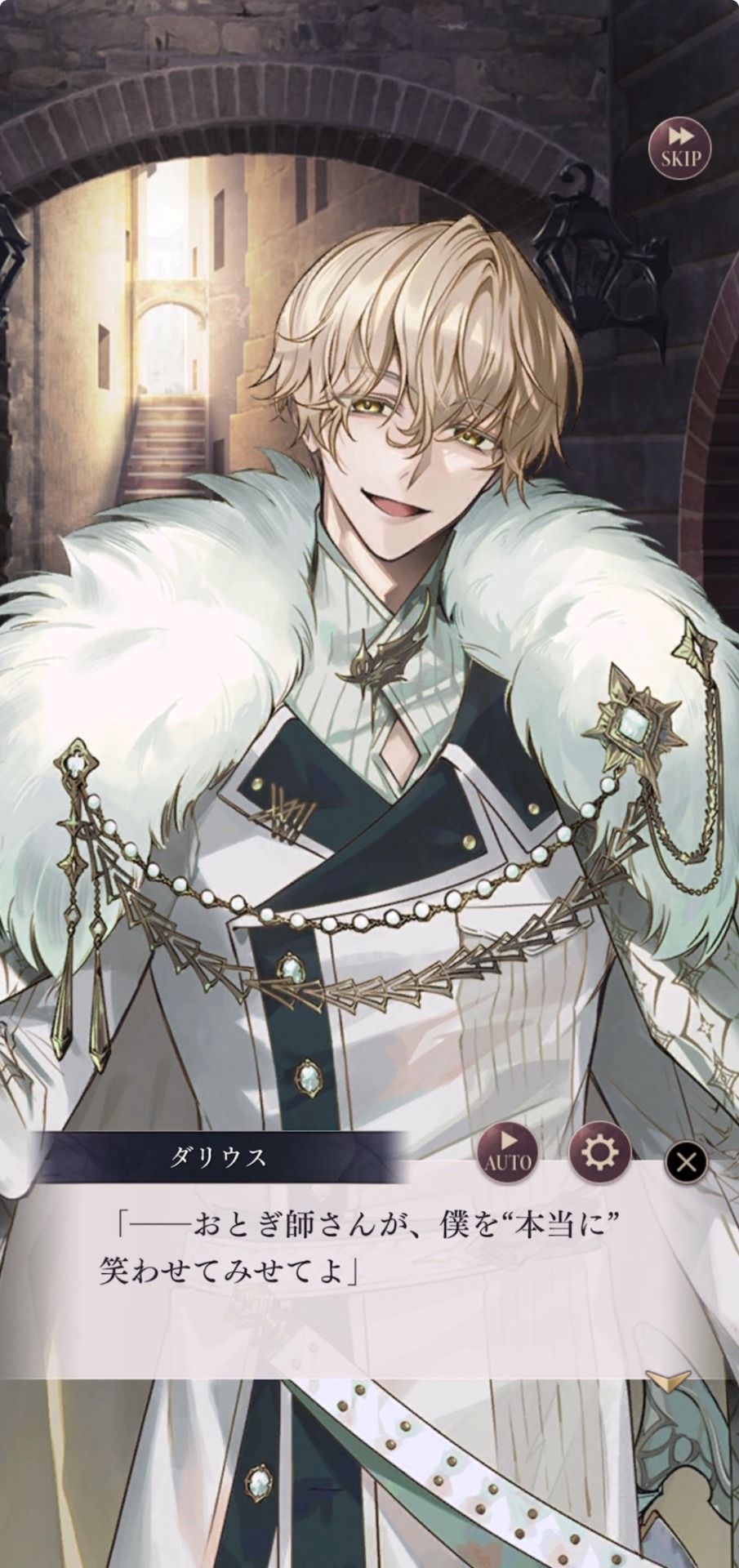
The hustle and bustle and zeal of the street fair rapidly approached.
Darius: ...then, miss fairytale keeper, see if you can bring a ‘true’ smile out of me, yes?
to be continued…

will vs darius jude vs nica alfons vs ring
← prev epilogue →

NOTES:
[1] He is probably referring to something like leaving a fake trail. Like, if you were going to leave a trail anyway, you could have used it to divert us rather than lead us, kind of implication. (I could be wrong though.)

full masterlist 🌹🪽
#ikemen villains#ikevil#イケメンヴィラン#ikevil darius#ikevil darius vogel#darius vogel#ikemen villains darius#cybird ikemen series#cybird ikemen#cybird otome#ikemen series#otome game#otome#ikevil translation#ikevil translations
151 notes
·
View notes
Text

william v.s. darius . . . darius vogel epilogue 🪽
— this translation may not be 100% accurate or contain creative liberties due to characterization or narrative flow purposes. if you enjoy, please consider reblogging, but don’t repost these or claim these as your own!
— cw: none, it’s actually pretty wholesome (for the most part).
Upon returning to the festival, we could hear the sound of bright music,
and the townspeople, in each of their own ways, were doing a folk dance.
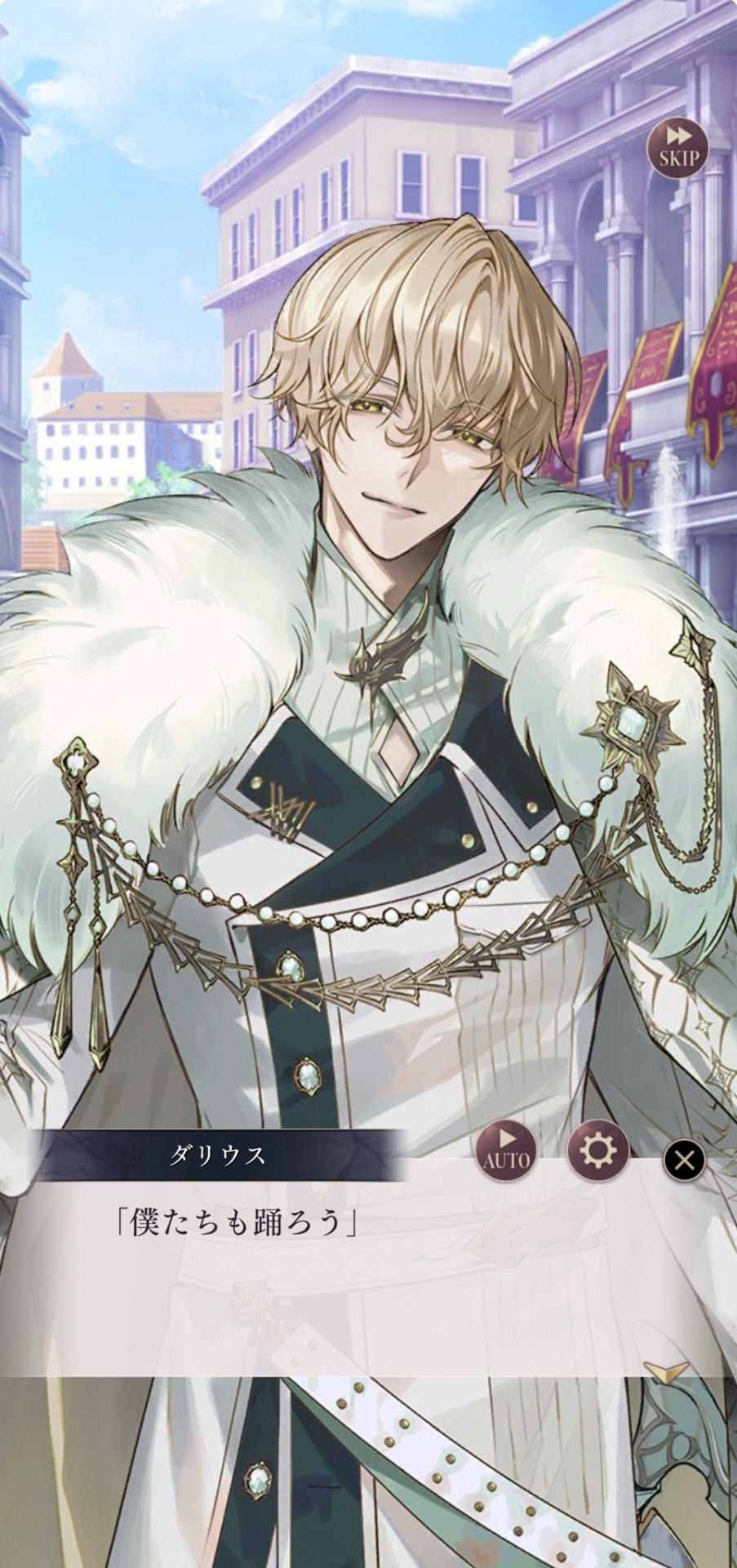
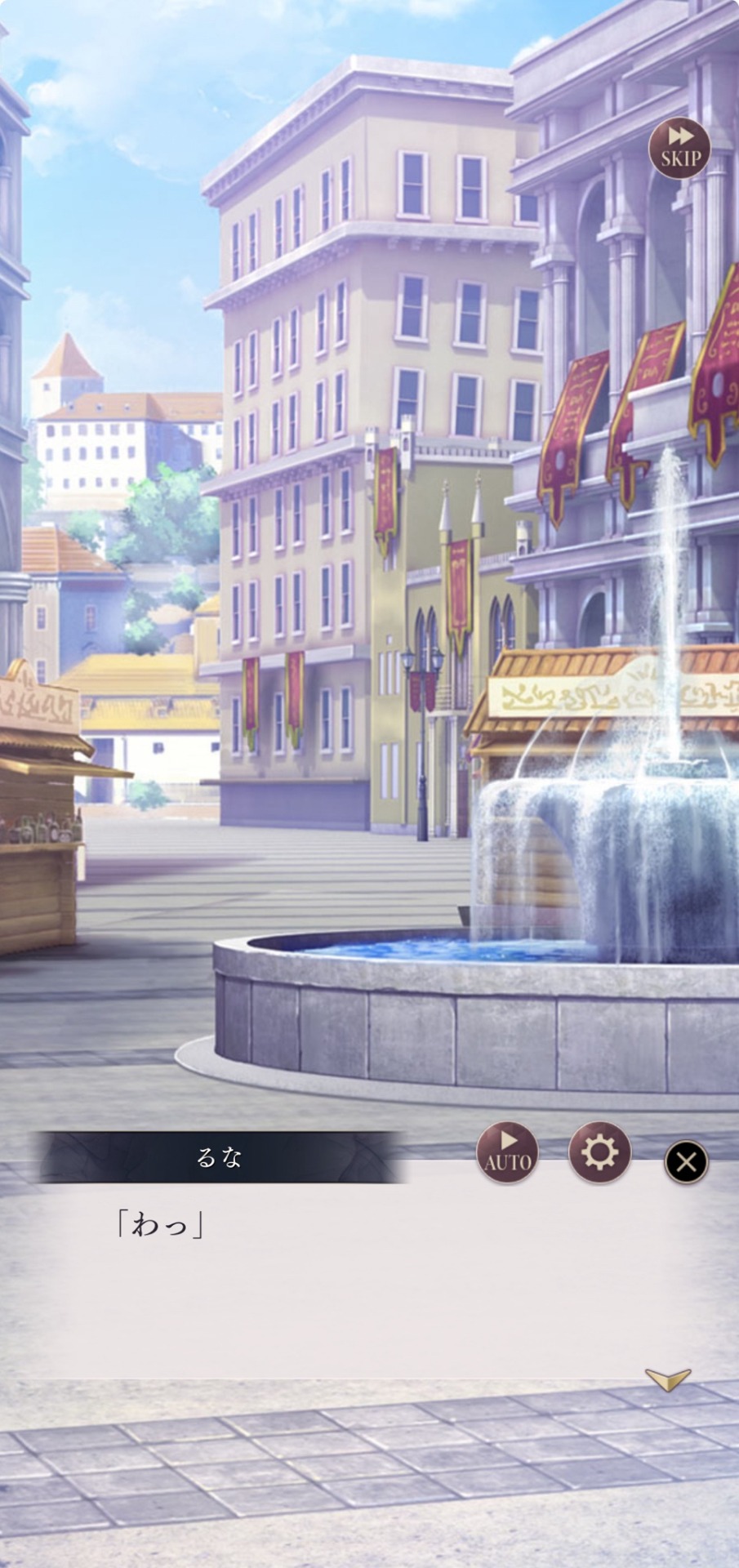
Darius: Let’s go and dance too.
Kate: Ah——
The hand that held mine pulled me toward him, before making its way to my back.
And his rhythmic yet complex steps were enough to draw in the eyes of the surrounding people toward us.
Kate: I-isn’t this a ballroom dance...
Darius: Oh, oops, this is just the dance I am most used to, so that’s why. But...
The next moment, he let go of my hand before spinning his way behind me.
Darius: This type of dance seems much more fun.
Once again, our hands linked, and he looked to the townspeople around him, imitating their movements as he hopped about.
Kate: Hehe, it goes like this.
When I showed him a skip, Darius followed suit with mirth.
Darius: Something like this?
At last we were in sync, and the tempo gradually started to speed up,
and it ended up looking like I was being led by him.
Kate: Waah, so fast!
Darius: Ahaha, isn’t this fun.
(He picks up things very quickly. Which in turn makes teaching him fun as well.)
(But even so... somehow I feel like we’re sticking a bit too close together...)
I could feel the breath from his innocent laugh on my earlobe.
And I could feel his warmth on my back, which in turn caused my breathing to speed up and my body temperature to rise.
Just when I calmed my pounding heart, he spun so that he was in front of me, looking into my eyes.
Darius: Your ears are so red, miss fairytale keeper, it’s just so adorable.
Kate: T-that’s because your movements are so fervent that I’m breaking a leg here to keep up with you.
Seeing his honey-colored eyes so bright, my cheeks started to heat up as well.
Kate: ...But, even so, I’m glad you seem to be having fun.
Darius: .........
D: I suppose that’s to say I’ve yet to laugh from the bottom of my heart.
D: I wonder, if you also smile lots for me, will I be able to smile as well, perhaps?
His gloved fingers reached out to me, pinching my cheeks.
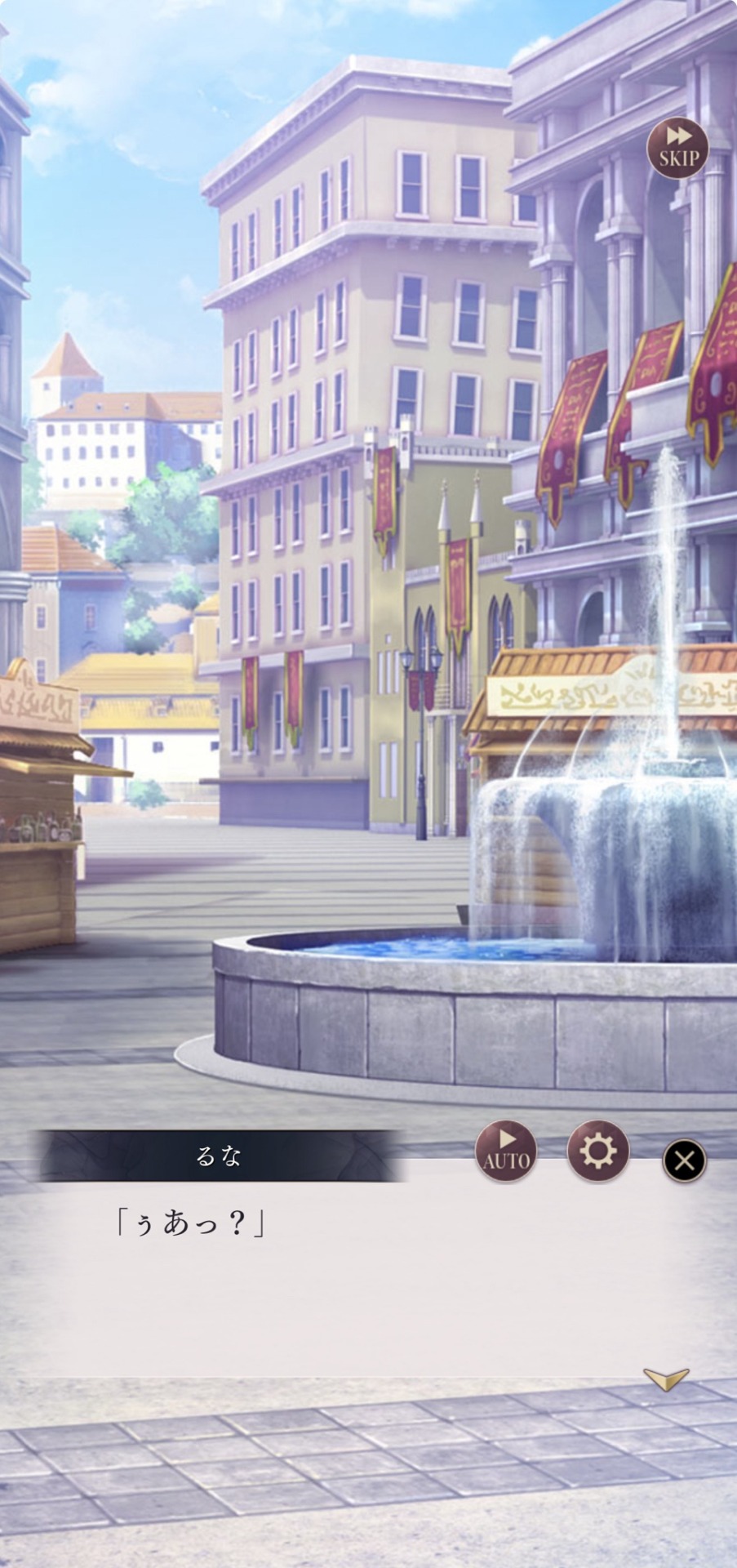
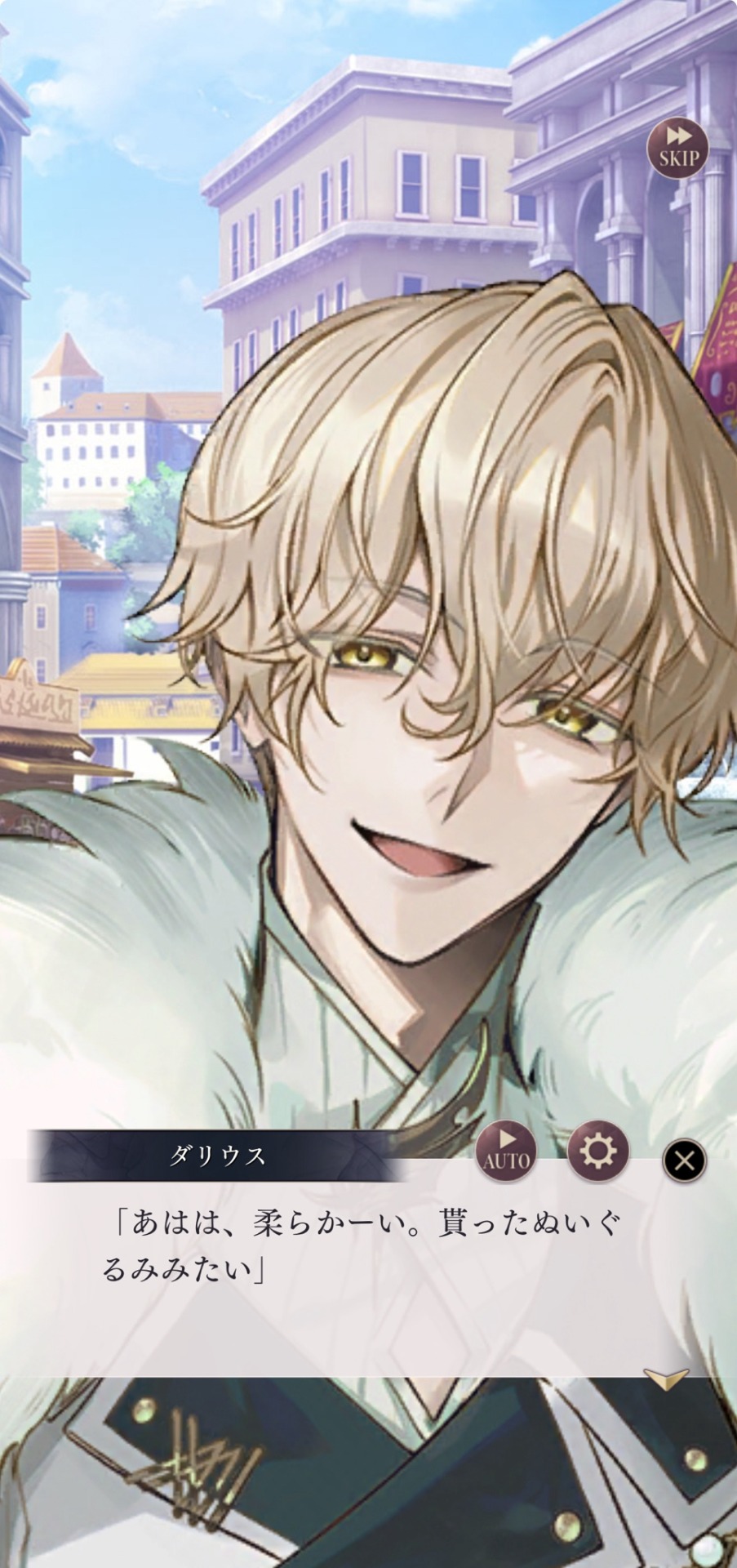
Kate: Uwah?
Darius: Ahaha, they’re so soooft. It reminds me of the plush you got for me.
While laughing, he stretched my cheeks out and rubbed them.
Kate: huu...
Seeing that innocent smile up close, I gradually lost the will to retaliate.
Darius: See, let’s smile, how about it?
And as a cherry on top, he pulled the corners of my lips upward with his index fingers,
showing a bright smile at the same time.
Kate: ...
K: ...heh, hehe...
K: For some reason, seeing you do this... I can’t help but want to laugh.
K: I wanted you to have fun here, and yet I feel like I’m the one having fun instead.
His eccentric actions were as interesting as they were odd.
My cheeks, having been pulled at by his fingers, started to relax.
Darius: .........
D: And I want to play with you a looot more, miss fairytale keeper.
D: Care to come along?
After that,
we would stop by at wagons our eyes landed upon, split snacks, played games——
He would pull me around here and there until I was utterly exhausted,
and by the time I returned to Crown, the darkness of night had long fallen.
(...haa, I ended up going all out.)
(I guess since I became an adult, I haven’t had much opportunities to play so hard like that.)
So, my body was tired, to be sure, but my heart felt full.
(...That said.)
In all the time we were together, had any of the smiles he wore been one from the bottom of his heart?
(If he did, I was having so much fun that they might have slipped past me.)
(...I wonder what Darius’ ‘true’ smile is like?)
And if I could get to know him more, would he show me the smile I wanted to see?
If I could, as he said, ‘get along’ with him, then——
Such a time may someday come by.
——Meanwhile.
Nica: Did you go out somewhere, Dari?
N: Come to think of it, I saw you out in the garden with the Spatzi and the ‘Self-Righteous Monarch.’
Darius: Indeed, you’re right. And after that the little miss human invited me to go out with them to town together, the three of us.
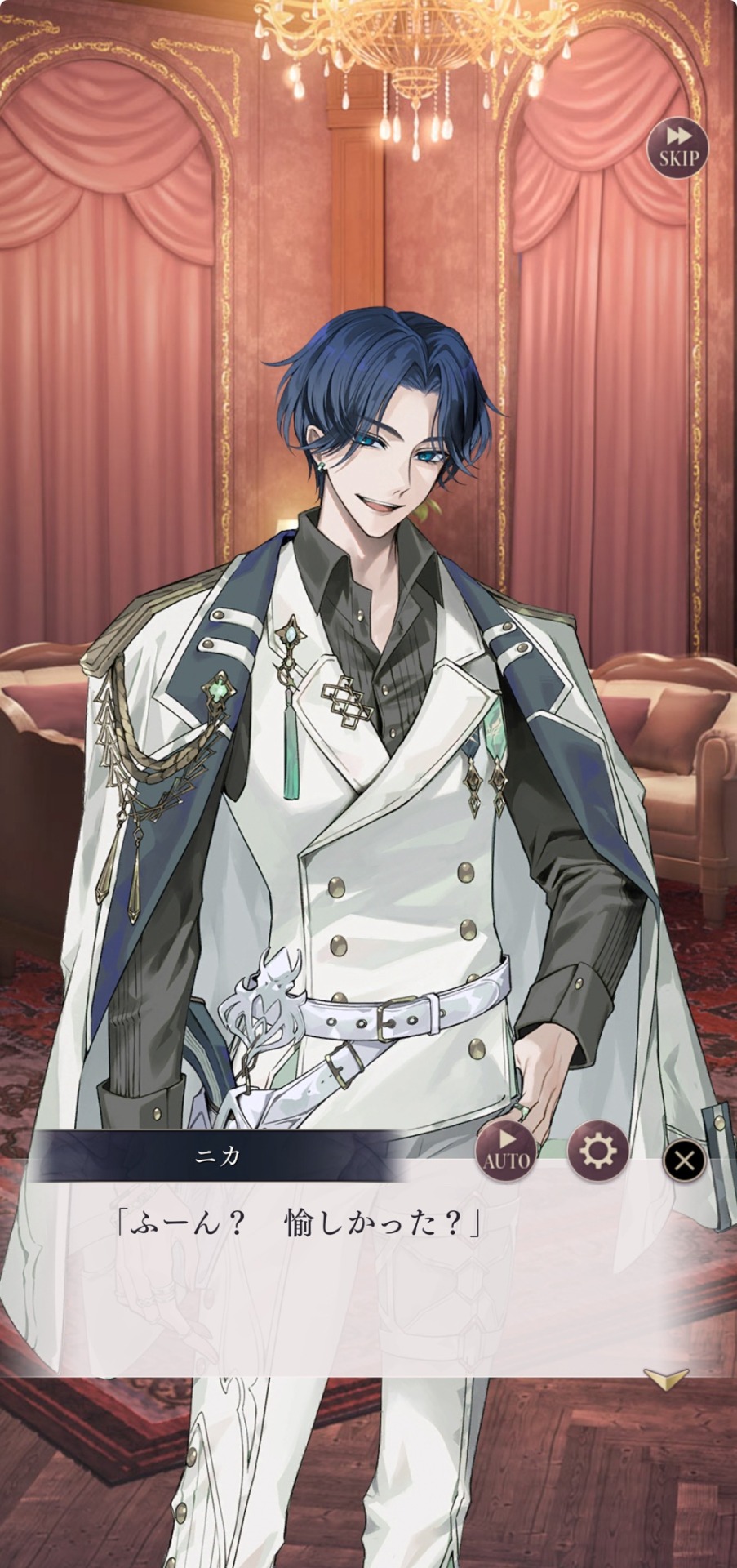
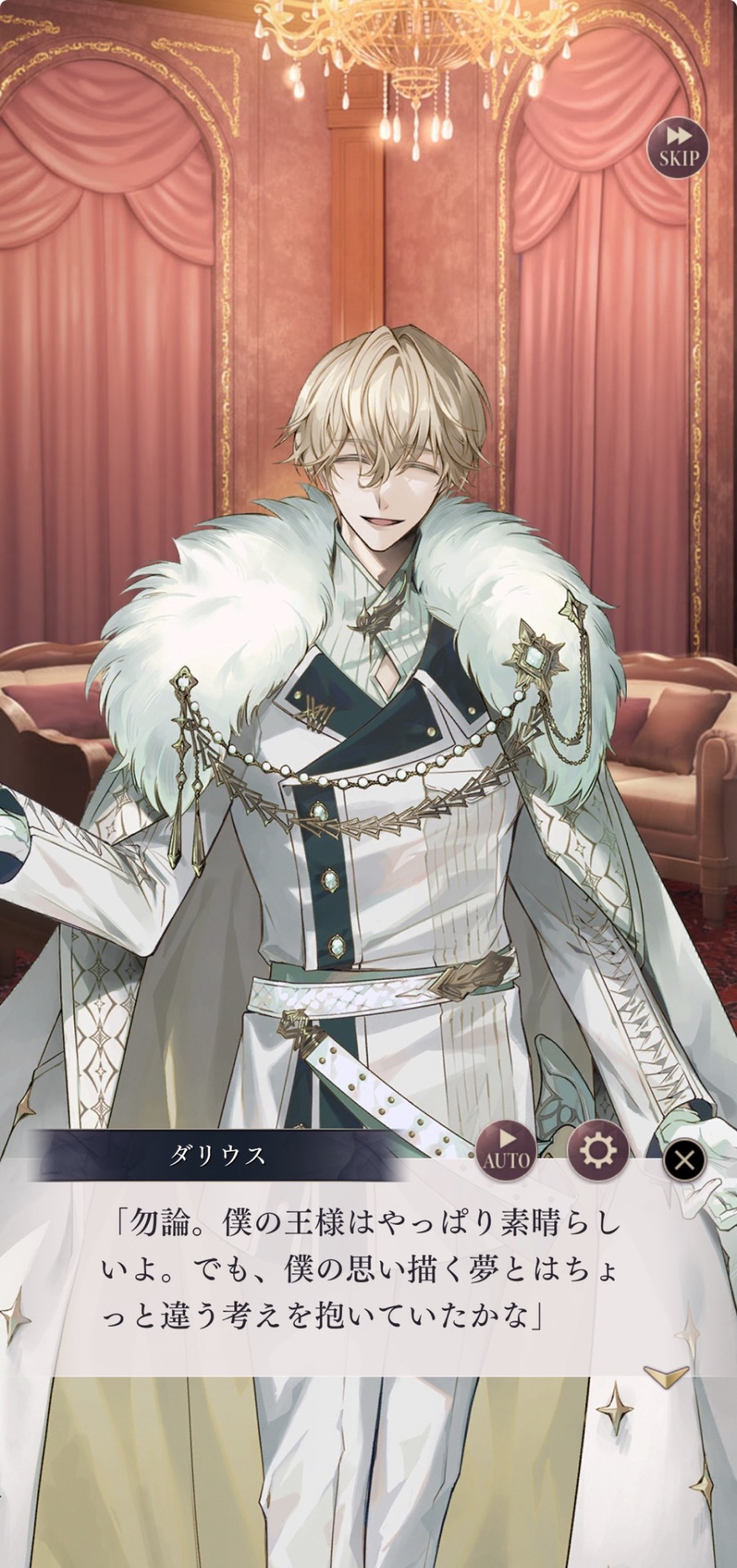
Nica: Hmm, and? Was it fun?
Darius: Of course it was. My king truly is wonderful, to be sure. All that said, I do think he holds some different views and ideals from myself.
D: Well, anyhow, if he were to become a part of my ‘family,’ I’m sure that will end up changing as well, yes?
D: ——Ahh, that’s right, and as for the little miss human.
D: I dragged her aaalll around, and yet she still went along with me, to the point she’s just so naïvely honest.
D: It’s the most odd thing.
Nica: So it looks like you had fun. Glad to hear it.
Now alone in the parlor, Darius looked out the window at London’s night sky.
His honey-colored eyes seemed to sparkle as though he were looking down from a place far away.
And when he calmly sat on the sofa, he felt something strange from his pocket.
Darius: Ah.
He took out the white leopard plush from his pocket, his eyes meeting with it.
Darius: .........
With his gloved fingers,
he pinched the white leopard’s cheeks, on nothing but a whim.
Fin.

will vs darius jude vs nica alfons vs ring
← prev fin

END NOTES: darius definitely comes off as innocent, but he’s also very sharp — and two-faced as well. and knowing this, it sort of makes this story give off a bit of a different impression than the surface. like yes, the story is wholesome, but at the same time it kind of keeps you on the edge of your seat, yk?and the white leopard plush is interesting too, kate bought it for darius because it reminded her of him, and yet he is pinching its cheeks as he did with kate, so maybe to him, this plush reminds him of kate…
anyway, i hope this story may have spurred some interest in his character! i’d love to hear your thoughts if you have any as well!

full masterlist 🌹🪽
#ikemen villains#ikevil#イケメンヴィラン#ikevil darius#ikevil darius vogel#darius vogel#ikemen villains darius#cybird ikemen series#cybird ikemen#cybird otome#ikemen series#otome game#otome#ikevil translation#ikevil translations
158 notes
·
View notes